
The Project Gutenberg EBook of Mr. Wicker's Window, by Carley Dawson This eBook is for the use of anyone anywhere at no cost and with almost no restrictions whatsoever. You may copy it, give it away or re-use it under the terms of the Project Gutenberg License included with this eBook or online at www.gutenberg.org Title: Mr. Wicker's Window Author: Carley Dawson Illustrator: Lynd Ward Release Date: May 24, 2009 [EBook #28952] Language: English Character set encoding: ISO-8859-1 *** START OF THIS PROJECT GUTENBERG EBOOK MR. WICKER'S WINDOW *** Produced by Sankar Viswanathan, Greg Weeks, and the Online Distributed Proofreading Team at http://www.pgdp.net



Transcriber's Note:
Extensive research did not uncover any evidence that the U.S. copyright on this publication was renewed.



hristopher Mason felt numb. It seemed to him that he was as good as an orphan already, for his father, a Commander in the Navy, was far away at sea, and Chris's mother was in a hospital, not expected to live.
Chris scuffed along the brick pavements of Georgetown, but he did not, as he usually did, look about at its familiar houses. This friendly core of the growing city of Washington, D.C., today seemed to him almost hostile.
Georgetown, where Chris lived, is the oldest part of the capital city, built by early English settlers long years before Washington itself was even planned. Grouped at the head of the navigable part of the Potomac River, above Georgetown's bluffs, the Potomac foams and dashes over wild rocks and waterfalls, and across the river, the country starts.
Chris had just left his mother's sister, his Aunt Rachel. Aunt Rachel, white-faced, was preparing to go to the hospital to be with his mother and had asked him, "Don't you want to come too, Chris? For a little while?" But a cold-edged wing of fear[8] had brushed the boy like a bat wing in the night. He had shaken his head, speechless, grabbed his sweater, and slammed the front door.
Now he hesitated on a corner, suddenly dismayed, not knowing quite where to go or what to do. The whole city with its white marble buildings and templed memorials, its elm-lined avenues, seemed all at once very empty.
He looked down to the Potomac, always, for Chris, just "the river," where it glinted distantly blue and silver at the end of the street. Factories along the riverbank cut off all but the farthest stretches of water as the river moved under bridge after bridge beside the banks of Maryland and Virginia.
Chris made up his mind to see what might be in the Pep Boys' store, far down the hill and along traffic-filled M Street. Somehow the tawdry bustle of this street, with its many shops, appealed to the boy who carried misery inside him like a cold, heavy stone. Running, he started down the hill between the lines of old brick houses, left Rock Creek Park behind him, and turning to the right up M Street, reached the hardware glitter of The Pep Boys'.
And it was there, as he stood staring in at the chromium bicycle lamps, red glass tail lights, and wire baskets, that Mike Dugan found him.

ike was in his class at public school, the eighth grade. Mike was all right. Chris liked him.
"Hya, Chris!"
"Hi, Mike!"
"Whatcha doin'?"
"Nothin' much. Just looking."
"Say—you know sumthin'?" Mike wiggled himself across part of the Pep Boys' window to gain Chris's attention. "Old Wicker's got a sign in his window—he needs a boy. For after school, I guess. Think he'd pay, huh? Whyncha try?"
Chris looked from a nickel-plated flashlight to a car jack and spark plug.
"Oh—I don't know."
Mike persisted. "Well, I'll tell you what. Know who needs a job bad? That's Jakey Harris. His mother's sick, and he's got that bad foot. Whyncha ask for him, huh? You sit next to him at school."
All Chris heard was "—needs a job bad—mother's sick."[10]
"O.K.," he said. "Only why didn't you ask him yourself?"
Mike became uneasy and fished an elastic band out of his pocket, made a flick of paper and sent it soaring out into M Street.
"Well—" he admitted, "I did. Wicker's such a queer old guy. That ol' antique shop is dark an' spooky, an'—Well, I went in, and there wasn't nobody there, on'y him and me."
Mike stopped, and after a pause Chris said, "So what?"
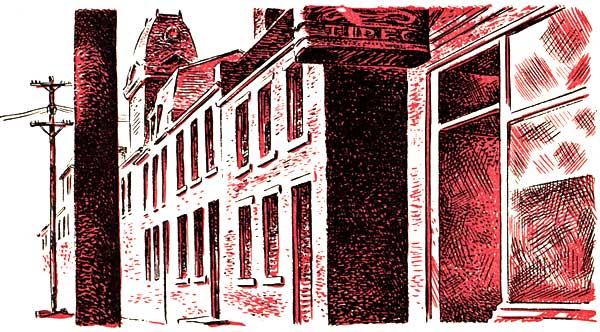
"So—" Mike swallowed. "So I said I was there about the job, an' do you know what he said? He said"—he went on without urging, but with a frown of perplexity ridging his forehead—"He said, 'Turn around and look out that window, son, and tell me what you see.'"
Mike stopped and looked at Chris with a comical expression. "Everybody knows what's outside his window!" he burst out. "Of all the silly things! But I turned around and looked, like he told me to, and of course there was the traffic goin' by, and[11] trucks, and cabs, and people crossin' the street, and the freeway overhead, an'—you know."
"So what did he say?" Chris asked, and for the first time that day the heavy weight he carried within him lifted and lightened a little.
Mike examined the toe of his worn shoe. "Oh, he just smiled, that funny little crackly smile, and said, 'I'm sorry, young man, you won't do.'"
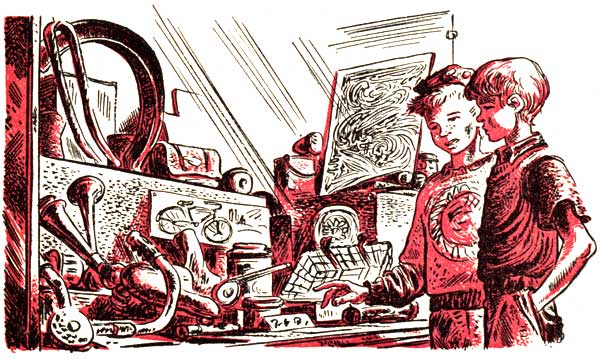
For a moment both boys stared into one another's eyes, each questioning, wondering, and neither being able to supply the answer.
At last, Chris broke the silence.
"Queerest thing I ever heard. Gee! Whaddaya suppose?"
Mike took heart, his experience believed and his bafflement shared. He spoke cheerfully. "It doesn't make sense, but old Wicker's so old he may be addled, don't you reckon? Who else would keep an antique store where nobody ever looks?[12] All the other antique places are along Wisconsin Avenue where people go to shop."
"You reckon Jakey really could use the job?" Chris asked, his courage ebbing as he pictured to himself the dark little shop with its bow window of small panes, and Mr. Wicker, so thin and wizened he seemed only bones and wrinkles. "Think he really needs it?" he pursued.
But Mike was certain, or perhaps he needed a companion in this curious experiment.
"You bet he does! He tol' me at noon today he wished he could find something that would help bring some money in. His mother's sick," he repeated, "an' Jakey don' look so good himself."
"Well—" Chris said, half agreeing.
"I'll go with ya!" Mike announced, as if that finished the argument; which, as a matter of fact, it did.
Chris did not feel too happy about his mission and hung back a moment longer, looking in the Pep Boys' window at things he had already seen. He would have liked to get the job for Jakey, who needed it, but somehow the task of facing Mr. Wicker, especially now that the light was going and dusk edging into the streets, was not what Chris had intended for ending the afternoon. Although he had not been quite certain how he had meant to spend the rest of the remaining daylight, Mike's plan did not seem to fit his present mood.
"Are you coming?" Mike challenged, with a hint of derision.
"Yes," said Chris suddenly, "I'm coming. I'll ask for Jakey."
Mike's expression changed at once to one of triumph, but Chris was only partly encouraged.
The two boys walked to the corner of M Street and Wis[13]consin Avenue. Traffic roared up the first short block of Wisconsin from under the high steel freeway down to their left.
Chris glanced down the slope of Wisconsin. Houses and shops thinned suddenly on both sides of the street. Far down at the very end, on his side, he could see the brick walls and slate roof of Mr. Wicker's house. Chris knew it well, for times without number he had pressed his nose to the square Georgian panes of Mr. Wicker's window to gaze at the strangely fascinating jumble of oddments that were displayed. Now, however, he felt in no mood to visit the curiosity shop and stood shifting his feet and looking aimlessly about. Mike, beside him, was becoming restive, and gave him a poke.
"Betcha aren't goin' after all!"
Chris turned on him. "Am too!"
Mike looked disdainful. "Aw—you're stalling!"
"Not any sucha thing. I'm going now."
"O.K. Let's see you."
Chris turned his back on Mike and started down the hill. After a step or two, not finding his friend beside him, he turned. Mike was standing on the corner.
"Hi!" Chris called, indignant. "You said you were coming with me!"
"Well, I was," Mike howled back, "but I just remembered. My mother told me to bring her some stuff from the Safeway. I'll run all the way and come back and meet you."
"Aw shucks!" Chris kicked at a nonexistent pebble and scowled. But a chore was a chore, and was never worth discussion.
"I'll meetcha in fifteen or twenty minutes," Mike shouted.[14] "It won't take me long," and throwing out his hands to signify that there was nothing he could do about it he disappeared.
Chris started off once more, passing the bleak little Victorian church perched on the hill above Mr. Wicker's house. An empty lot cut into by Church Lane gave a look of isolation to the L-shaped brick building that served Mr. Wicker as both house and place of business. Chris paused to look below him. Even from where he stood, fifty feet above the house, the slope of the hill was sharp and the plan of the house below him could be plainly seen.
It was built like an inverted L, the short wing faced towards the street and the traffic of Wisconsin Avenue. The longer wing, toward the back, had a back door that opened onto Water Street. The space between the house and Wisconsin Avenue had been made into a neat oblong flower garden, fenced off from the sidewalk by box shrubs and a white picket fence. Behind it, along the other side of the long wing, lay a meticulously arranged vegetable garden and a few apple trees.
His gaze moved back to the house itself. It seemed to have been built at about the same time as the vacant storehouses opposite, for they had a similar look of design and age. The windows of Mr. Wicker's house had smaller panes of glass than were used nowadays, and like the warehouses across from it, Mr. Wicker's had many dormer windows jutting out from the slated roof. Unlike the warehouses, however, which were rickety and down-at-heel, Mr. Wicker's home was well cared for. The windows—except for the bow window of the shop to the right of the front door—had shutters painted a pleasing bluey-green, and at their sides could be seen the edges of gay curtains. The traffic freeway rose high above the roof,[15] dwarfing the old house and casting a deepening shadow over the whole length of Water Street, shading even Mr. Wicker's back door, so close did it rise beside the house. The air was filled with mechanical sounds—the roar of cars speeding up the hill, the grind of gears, the shuddering throb of wheels along the freeway, and the clanking bang of chains and weights in the factories along the shore.
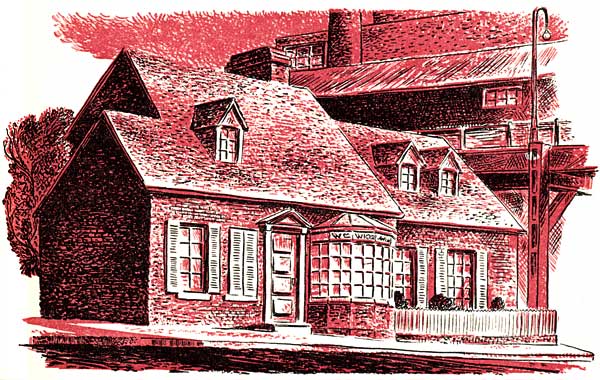
The sun was dropping, and the sky behind Chris made a sinister promise for the following day. A livid yellow stained the horizon beyond the factories and gray clouds lowered and tumbled above. The air was growing chill and Chris decided to finish his job. All at once he wondered how his mother was, and everything in him pinched and tightened itself.
At the foot of the hill he reached the house. As he came to[16] the bow front the old familiar excitement that always seized Chris when he looked in Mr. Wicker's window touched him again, and he stopped to look at its well-memorized display.
For as long as he had stopped to look into Mr. Wicker's window, which was as far back as he could remember, Chris had never known the objects to vary or be changed. There were three things that always caught his eye, amid the litter of dusty pieces. On the left, the coil of rope; in the center, the model of a sailing ship in a green glass bottle, and on the right, the wooden statue of a Negro boy in baggy trousers, Turkish jacket, and white turban. The figure was holding up a wooden bouquet, the yellow paint peeling from the carved flowers. The figure's mouth was open in an engaging toothy smile, and its right hand was on one hip, on the chipped red paint of the baggy trousers. The ship, so often contemplated by Chris that he knew every tiny thread and delicately jointed board, was a three-masted schooner, sleek of line, painted—at one time—a dazzling white. Now with dust dulling the green sides of the bottle, its sails looked loose, its sides grimed. But the name still showed at the prow, and many a time Chris, safe at home in bed, had sailed imaginary voyages in the Mirabelle. It lay there snug and captured, as if at the bottom of a tropical sea, seen through the glass sides of the bottle, and Chris never tired of looking at it.
But perhaps the coil of rope, so meaningless, so meaningful, held his imagination by an even stronger hold. Why a coil of rope in an antique shop? Who would want it? People bought rope in a hardware store—there was one farther along M Street near the old deserted Lido Theatre. But here, in an antique shop? Chris shook his head as he stared. He had never[17] seen anyone go into Mr. Wicker's shop, now he thought of it. How then, did he live, and what did he ever sell?
A sudden car horn woke him from his dream. He looked up, seeing for the first time the small card hung at eye level in the window. In a beautiful script such as Chris had never seen before, but very legible, the card read:
Boy Wanted.
Good Pay.
W. Wicker.
Jakey Harris came back into Chris's thoughts. He looked over his shoulder at the darkening sky streaked luridly with citrous strokes; noticed the wheel and tackle high up at the loft door of the warehouse opposite, and put his hand on the doorknob. The last flicker of light scudded across the steel sides of the freeway to pick out the lettering above the shop window.
W-LLM. WICKER, CURIOSITIES
Chris opened the door and a bell jangled, very faintly, but with persistence, far away in some distant part of the house.

he last reverberations of sound hung in the air and jangled in Chris's head. Of the many times he had examined Mr. Wicker's window and pored over the rope, the ship and the Nubian boy, he had never gone into Mr. Wicker's shop. So now, alone until someone should answer the bell, he looked eagerly, if uneasily, around him.
What with the one window and the lowering day outside, the long narrow shop was somber. The ceiling seemed close above Chris's head. Heavy hand-hewn beams crossed it from one side to the other. A few dusty pieces of furniture stood about, whether for sale or for use Chris could not determine, and almost lost in the black shadows at the far end were what appeared to be boxes and bales, piled one upon the other.
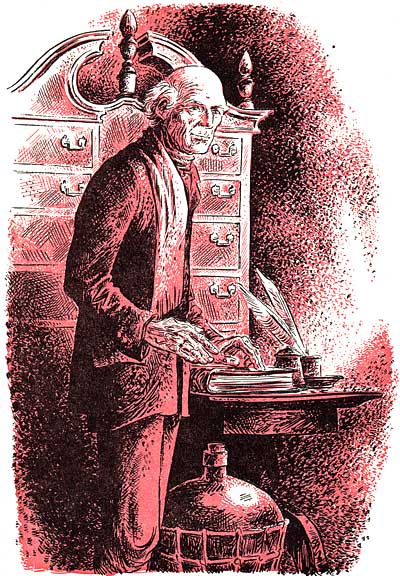
The growing silence, now the bell had stopped, gripped Chris. A chill made itself felt in his feet and spread rapidly over his body so that he gave a convulsive shiver. He was about to turn and go out when, at the farthest end of the gloomy shop, a small primrose oblong of light seeped for a [20]little way along the floor and a door opened. Fascinated, Chris stared, as into this distant pallor stepped the short and remarkably spidery figure of a man. Mr. Wicker's back being toward the source of light, Chris could not see his face. The figure paused, with a fragile hand scarcely bigger than that of a child's on the doorhandle, and then came forward.
The silence, Chris noticed, was still unbroken as Mr. Wicker advanced toward him, and Chris shuddered again as he stood waiting and watching, but whether it was with cold or with fear—and the room was indeed very dank and unaired—it would have been hard to say.
When Mr. Wicker had come within a few feet of Chris, the final vestiges of daylight from outside reached the extraordinary man facing the boy, and for the first time Chris was able to examine the old man who was more legend than fact throughout Georgetown.
William Wicker's face in itself was not forbidding. What made an icy mouse seem to run the length of Chris's spine was the impression of enormous age in the appearance of the man confronting him. The thin lips crackled the withered and multi-wrinkled cheeks in the ghost of what had once been a smile. The nose, once hawk-like and proud and denoting strength of character and purpose, was now pinched by the ever-tightening fingers of a progression of years. The double fans of minute wrinkles breaking from eye corner to temple and joining with those over the cheekbones were drawn into the horizontal lines across the domed forehead. Little tufts of white fuzz above the ears were all that remained of the antiquarian's hair, but what drew and held Chris's gaze were the old man's eyes.[21]
Mr. Wicker's eyes were not those of an old man at all. They had the vigor of a man in the prime of life, and their presence in that puckered face of age which confronted Chris was horribly disconcerting. Chris blinked and looked again. Yes, they were still there. Eyes so deeply brown they might well have been black, but clear, sparkling, and with a decided glint of humor and mischief. While the boy had been too frightened to move at the sight of Mr. Wicker's ancient cheeks, pinched nose, and hairless head, he was encouraged by the friendly eyes. Chris could not help but like those eyes, even though it was hard to believe they belonged to the man before him.
As though from a great distance Mr. Wicker's voice came to his ears, and this too, Chris found difficult to credit. There, not four feet in front of him was the old shopkeeper, and yet the high thin voice might have come from anywhere else—the rafters, the room beyond the lighted door; anywhere.
"Well, my boy? You wanted something?"
Chris swallowed and his voice came back to him. "Yes sir," he said. "I saw your sign, and I know a boy who needs the job." He looked at Mr. Wicker as though he were unable to look elsewhere. "He's a schoolmate of mine. Jakey Harris, his name is, and he really needs the job. I wondered—" Mr. Wicker's eyes, laughing at him just a little, confused Chris and he began to stammer.
"I—I just wondered if the place was still open."
Mr. Wicker studied Chris for a moment or two before he replied. What he saw was a fresh-cheeked lad tall for thirteen, sturdy, with sincerity and good humor in his face, and something sensitive and appealing about his eyes. His chin showed obstinacy and tenacity; his nose would shape itself well as he[22] grew older. Unruly tawny hair was blown and ruffled in every direction and his hands, even young as he was, showed ability and strength.
"Hm-mm," said Mr. Wicker, and his remote smile broadened while his eyes sparkled with the warmth of a fire on a winter's night. "Hm-mm. Yes. The job is still open, young man, but while you're here, why not apply for it yourself?"
Chris, somewhat less ill at ease, now he had got his message out, shifted his feet and gave a short laugh.
"Oh no, thank you, sir. You see, I don't really need it, and Jakey does. It wouldn't be fair for me to take it if Jakey has a chance."
He looked away, and saw that the light from the distant hidden room was jumping and flickering on the shadowed walls. He guessed there must be a lively fire in that room beyond.
"Of course," Chris added anxiously, "I don't know what the job is. You don't say, on the sign, and Jakey isn't awfully well. He has a twisted foot and it makes him slow in walking. Would that interfere with Jakey's getting the job, sir?" Chris enquired.
The reply was slow in coming, and Chris heard as if the words had been spoken, not before him, where the black outlined figure still stood, but as if at his very ear. Soft but clear, the words sounded.
"It would not interfere, Christopher my boy. But now that you are here, you must make the test. Jakey will be cared for, never fear."
Almost as in a dream, Chris felt an atmosphere drenching him as though a powerful scent filled the air. His head swam[23] a little, and he realized that it was a long time since he had had lunch. He thought he detected a pleasant smell of herbs, like the potpourri his mother had in bowls in their house. The sharp black outline of Mr. Wicker impressed itself on his eyeballs, and in the room, now totally dark except for the light that streamed from the faraway open door, Mr. Wicker's body seemed to radiate a bright edge, like a carbon paper held up to the sun. The voice at his ear once more filled his head and his hearing.
"You will make the test, my boy. Now. Just turn around, and tell me what you see out my window."
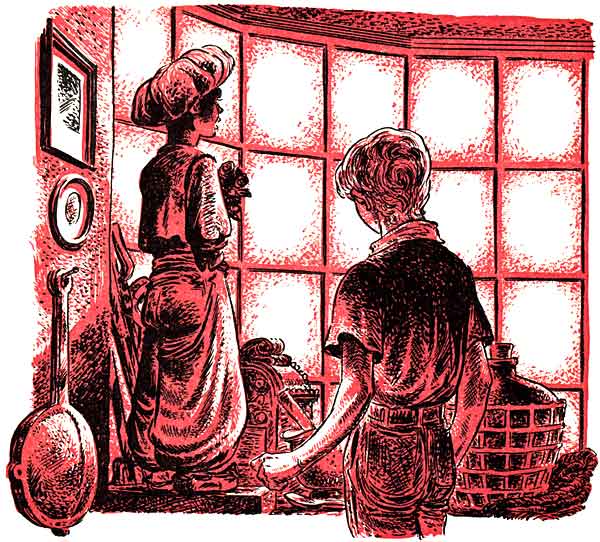
Chris, in spite of the strangeness rising about him like a mist, remembered very well what lay outside the window. But even as he slowly turned, the thought pierced his mind, Why had he not seen the reflection of the headlights of the cars moving up around the corner of Water Street and up the hill toward the traffic signals? And why had the sound of wheels, of gears and of horns, been so completely muffled out? The room seemed overly still.
Then, in that second, he turned and faced about. The wide bow window was there before him, the three objects he liked best showing frosty in the moonlight that poured in from across the water.
Across the water! Where was the freeway? It was no longer there, nor were the high walls and smokestacks of factories to be seen. The warehouses were still there. They were the very same, for Chris could make out the winch and tackle he had noticed as he opened the door. But instead of factories, instead of the freeway, the river flickered silver under the moon, and the hulls and masts of countless ships broke the starry sky.
Flabbergasted and breathless, Chris was unaware that he had moved closer to peer out the window in every direction. No electric signs, no lamplit streets. Going as far as the wall to his left and leaning forward, Chris looked up toward M Street.
Where the People's Drugstore had stood but a half-hour before, rose the roofs of what was evidently an inn. A courtyard was sparsely lit by a flaring torch or two, showing a swinging sign hung on a post. The post was planted at the edge of what was now a broad and muddy road. Even as Chris stared, not knowing whether to believe what his eyes saw or not, there was a great sound of hoofs and of a cracking whip. A coach[25] with its top piled high with luggage stamped to a halt beside the flagged courtyard. Ostlers ran out to hold the team of horses steaming in the cool night air, and linkboys carrying torches and orange lanterns ran out to help the travelers in. The coachman wore knee breeches and a cockaded hat; two gentlemen got down from the interior of the coach, stretching their cramped legs. Chris could catch the shine as lantern glow touched the silver buckles on their shoes. Their full-backed coats were slightly lifted, on the left, by the tips of their rapiers, and a froth of white, lace or muslin, fell from their necks onto satin waistcoats. They moved into the inn; the coach rattled off to the stable. Before the window, farm carts rumbled by, and instead of the crowded outline of Georgetown roofs, Chris could see only a few chimneys against the stars, and many lofty trees.
"What do you see, boy?" asked the voice, so gentle, at his ear. Chris, frightened and dumbfounded, shook his head.
"I will tell you," Mr. Wicker said. "My window has a power for those few who are to see. You are looking back into the past, my boy. The way it used to be."
Then the coldness, the strangeness, the fluttering of the light was too much for Chris. Blackness descended on him as if a hood had been dropped over his head, but before he was quite gone, he heard what he thought was Mr. Wicker's voice saying kindly:
"You will do."

hen Chris came to himself he woke from sleep and lay for a moment without opening his eyes. He waited with his usual sense of irritation for Aunt Rachel's step at the door, and her voice saying, "Get up, Chris! You're late again!" But the step did not come, and feeling rested and hungry, Chris opened his eyes.
What was this? The high regular walls of his bedroom were not around him, nor the familiar furniture. Chris sat up, rubbing at his eyes as if this would help to clear his vision, and looked about him.
He was in a narrow bed in a small sunny room. An attic room, it would seem to be, for the walls slanted down in different sharp angles from the low ceiling to the broad wood planks of the floor. Two dormer windows projected from the room beyond the roof, making two niches in the wall across from where Chris lay, and a third window in the wall above his head showed that the room, as well as being at the top of the house, was also at a corner of it. A door was just beyond[27] the foot of the bed; a chest of drawers and a table with a blue and white porcelain wash bowl and pitcher, stood along the farther side. Wooden pegs were placed at hand level here and there, and a rag rug in bright colors lay on the floor by the bed. The walls were white and the sunlight poured in to dash itself upon the floor and splash up the walls in irresistible gaiety. There was no doubt about it, bare though it was, it was a pleasing room, snug, clean and cheerful, and somehow well suited to a thirteen-year-old boy. Chris half smiled as he looked, leaning on one elbow, and then his smile faded as he caught sight of the chair and what it held.
The only chair in the room was laid with carefully folded clothes. But they were not Chris's clothes. Chris jumped out of bed and then looked down with a quick startled intake of his breath. He was wearing a white nightshirt, something he had never even seen before and barely heard of. The sleeves were long and cuffed, and the nightshirt fell in linen lines to his feet.
"Golly Moses!" Chris exclaimed, completely baffled.
He returned to the examination of the clothes that were obviously laid out for him. There was a fine white shirt with full sleeves and turned-back cuffs. White cotton stockings; knee breeches of a blue-gray worsted material, and matching frock coat with silver carved buttons. Below the chair, Chris saw, was a pair of black leather shoes with polished silver buckles.
"Fancy dress, huh?" Chris murmured, and then, as if he had been slapped into full awareness, came the remembrance of the evening before, of Mr. Wicker, and of the dark flickering shop.
Chris sat down suddenly on the edge of the bed, his mouth,[28] in spite of all his efforts, drawn down at the corners, and his eyes blank with confusion and misery.
"Oh my golly!" Chris said, and stared at the clothes he still held in his hands.
Then another idea struck him, and he jumped up to run to the nearest dormer window, the floorboards, where the sun had lain on them, warm under his bare feet.
But no. No freeway, no factories. The window looked out over Water Street, skirting the edge of the Potomac banks, and there below Chris's amazed eyes rose a forest of masts and spars of ships at anchor along the shore. Water Street, below him, was swarming with activity, but not the activity that Chris had previously known. Men dressed in the same sort of clothes as those laid out for him pushed at cotton bales, rolled hogsheads along to the docks, or rowed out to ships anchored in midstream. Most of the stevedores were hatless, and Chris snickered at the sight of the short braid of hair at the napes of their necks. Many wore brilliant scarves tied around their heads, red, or mustard-yellow or green, and the sound of deep voices swearing, laughing, or rising in unfamiliar sea chanteys excited Chris and sent the blood tingling along his veins.
He rushed to the high-placed window overlooking Wisconsin Avenue. No Key Bridge was to be seen in the distance, only stretches of fields and orchards, scattered with occasional houses of russet brick, and when he craned his neck there was the inn where the People's Drugstore ought to be, the sign swinging high above the road.
Wisconsin Avenue! Chris had to laugh. If it could see itself! Only a wide muddy road full of ruts and puddles, along which someone's line of geese was waddling, impervious to the cursing[29] of passing carters and riders on horseback. A little below him Chris could see the two old warehouses he remembered from the night before. But now they looked quite new, their bricks bright and their walls solid. Barrels were being lifted by the winch and tackle into the upper loft, and Chris watched the busy scene for quite some time.
His rolling stomach and a simultaneous smell of food reminded him of his hunger. Dressing quickly in the strange new clothes, he opened the door and peered outside.
His bedroom door was at the top of a narrow curling stair that twisted away to the left out of sight. It was steep, and Chris stood silent and intent on the top step, listening. A deep woman's voice loudly singing, "Farewell and Adieu, to you, Spanish ladies—" came rolling up the stairwell to the accompaniment of a brisk clatter of pots and pans. What rose also to Chris's nostrils was a smell of newly baked bread, frying bacon, and woodsmoke, and the combination put an end to his indecision. For a while he decided to call a truce to any attempt at solving the mystery in which he found himself, and following his nose, went softly down the stairs.
Rounding the last turn of the staircase, Chris remained in its shadow while he stared with unbelieving eyes at the room and figure before him. If this is a dream, he said in himself, it's the best one I've ever had—the very best!
What confronted Chris was Mr. Wicker's kitchen. This room took up almost all of the side wing of the house. Across from Chris two casement windows showed the shrubs and flowers and white picket fence of Mr. Wicker's garden, and at his left was the back door opening onto Water Street, flanked by two smaller windows. These seemed most inviting, each[30] possessing a window seat from which one could watch the busy comings and goings of the docks, with a view of the ships beyond.
But what drew Chris's eyes and made them grow round with wonder was the extraordinary figure in front of the fireplace. The vast, deeply set fireplace was in the wall that faced the back door. So deep it was, that there was even a bench on one side of it, and over the smoking logs were hung all manner of trivets, spits, and cooking irons. It was, in short, a fireplace such as Chris had never dreamed of. Yet the tall buxom woman stirring the hissing pots and singing to herself was what held Chris rooted to the last step of the attic stair.
The woman stood easily six feet, broad and brawny enough to be a match for almost any man. Countless yards of sprigged cotton must have gone into the making of her dress, to say nothing of her apron. A massive fichu of freshly laundered muslin went around her neck and was tucked into her bodice; a white turban was on her head, but on top of the turban—! Chris simply could not believe his eyes as he counted rapidly. On top of this amazing woman's head was a gigantic hat supporting twenty-four roses and twelve waving black plumes! Chris's jaw dropped at the sight of the turbaned, hatted head, the flowers bobbing and swaying, the ostrich plumes blowing and curtseying with every slightest movement.
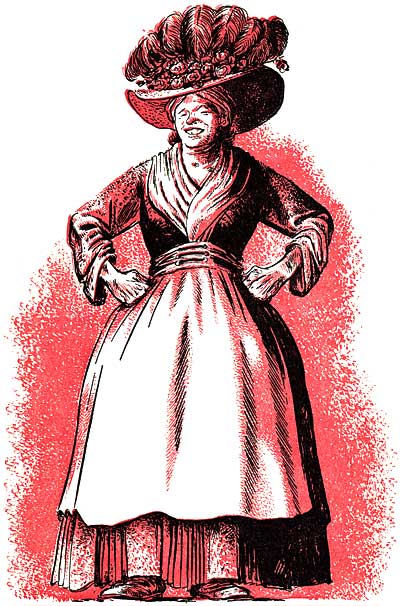
As if blissfully unaware that her costume was not the usual one for cooking, the woman hummed and stirred, tasted, and hung up her ladle. But the sight was too much for Chris. Before he could stop it a shout of laughter exploded from his lips. He laughed and laughed, and the indignant expression on the woman's face when she turned, to stand glaring at him with [32]her hands on her jutting hips, only added to Chris's laughter. At last, sobering up somewhat as he realized that his behavior was rude, to put it mildly, Chris stopped and caught his breath, shaken only now and again by a diminishing paroxysm. Seeing the spark of bad temper in the red face of the enormous woman, Chris decided to pour oil on the troubled waters.
"Good morning, ma'am. I—I'm Chris Mason, from upstairs, and I'm sorry I laughed so loud. I—" he floundered and grabbed desperately at any passing idea "—I saw something comical out the window there"—he pointed wildly—"and it just set me off. I hope I didn't disturb you?"
Mollified, though not entirely, the woman accepted this effort at peacemaking and her face eased a little.
"Well now. So you are awake at the last, eh? And hungry, bein' a boy, I don't doubt?"
She moved to the dresser and took down a mug and plate, the roses and ostrich plumes nodding in evident agreement.
"So you are Chris, did you say? Christopher, that would be? And I am Mistress Rebecca Boozer, should you be wanting to know. Becky Boozer, they call me."
She bustled over to a covered bowl, dipped out creamy milk with a long-handled dipper, and set bread, butter, and bacon in front of Chris at a table pulled up to one of the window seats.
"Eat up now, young man," Becky Boozer advised, every red rose and feather accenting her words, "for Mr. Wicker will be wanting to see you when you have done. It's late. Past eight of the clock." She glanced out the window. "It might be just possible that Master Cilley will be passing by before long for a midmorning snack and here I am gossiping with you instead of getting on with my work."[33]
Chris ate with a will, looking around as he chewed. The spotless brick floor and the starched curtains at the windows, the shining copper pans hung beside the huge fireplace, were proof of Becky Boozer's housekeeping.
"Don't you have an icebox?" Chris asked, his mouth full.
"What may that be?" Becky asked sharply.
"To keep the food cool," Chris answered.
Becky stopped to consider this, her hands on her hips. "We have a larder on the cool side of the house, if that be what you mean," she told him, nodding. "Keeps the food pretty well up to April or May. Then the heat makes everything go. Oh! This heat! Prosperity, Maryland, where I come from, and on the sea coast as it is, was never like this!"
A table with a wooden tub and dishes stacked nearby caught Chris's eye. Buckets of water stood beneath the table, and presently Becky Boozer took off a small pot of steaming water from a hook above the fire, poured it in the tub, and dipped cold water from one of the buckets into it.
What a system! Chris thought as he watched Becky busy with her dishes, thinking of the neat white kitchen he knew at home.
Aloud he said: "If you had a little wooden trough that led from that tub out through the window there, you could pull out a bung when you were ready and the water would run outdoors. It would save you carrying that great tub about, when you are in a hurry."
Becky Boozer rested her soapy hands on the edge of the tub and looked at him admiringly over her shoulder.
"I would never have thought it," she said, "by the look of you. Never in this world. You have brains, young lad, that's[34] what you have. A better idea than that I never heard! Indeed, it is just what I have been a-needin' since years, and that simple I might have thought it out myself! I shall set Master Cilley to work on it when he comes. He's right handy with tools, is Ned Cilley."
At this moment a short knock sounded on the back door, and an instant change came over Becky Boozer. It was impossible to imagine that anyone as ponderous as Becky could be coy, but at the sound of the knock, this is what she became. Wiping her hands hastily on one of many petticoats, she pushed and pulled at her hat (which remained immovable), straightened her fichu, and smoothing her dress, she minced her huge bulk to the door with a welcoming smile.
A little man scarcely higher than Becky's barrel waist, with a rolling sea gait and twinkling blue eyes, bounced into the room and strained up on tiptoe toward Miss Boozer's blushing cheek. Chris, behind the opened door, had not yet been perceived.
"Come now, Becky me love!" shouted Cilley the sailor in a good-humored roar, "How can I start the day right 'thout a kiss from my Boozer?"
Becky blushed and simpered and cast down her eyes. "Get along with you, Cilley! What a way to behave," she admonished, delighted and abashed. "See—there's company here."
She pushed her suitor off with an elephantine shove and gestured to Chris.
Chris was feeling the contagion of laughter catching up with him again at the scene he had watched, and was glad when the sailor turned and came over to where he sat.
"A visitor, eh? Well, well. Off a ship?"[35]
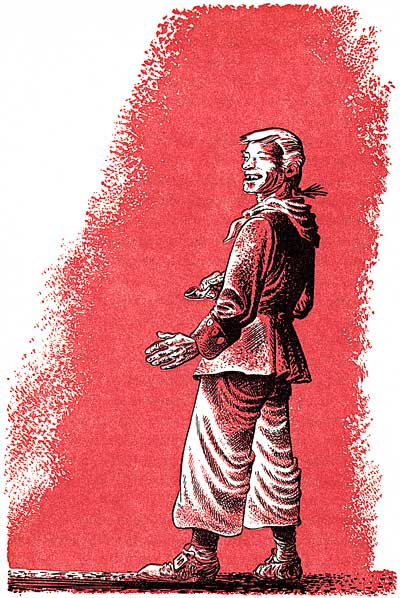
"No—no!" Becky put in quickly, and gave Chris a look. "No. He is a friend of the master's, from—" she searched her mind—"from another part of the country. He got here last night and slept late, as you see."
"Indeed and indeed!" said the sailor, settling himself comfortably, and as if for a long stay, in his chair and observing Chris through his keen blue eyes. "Well, young man," he announced genially, "I am Cilley," he said, and stretched out a hard brown hand.
"Christopher Mason," Chris said in return, and they solemnly shook hands, taking account of each other as men do when they meet.
"I shall sit here, Mistress Becky, by your leave," Cilley called out, as if Becky Boozer were a mile away, "to keep this lad company, as it were."
"So you shall!" Becky answered warmly, smiling broadly, wrinkles of pleasure at the corners of her eyes. "And could I tempt you with a morsel, Master Cilley?"
Ned Cilley appeared to consider this invitation from all sides before he gave his reply, cocking his head on one side like a parrot as he reflected. Finally, he answered.
"How could I refuse when I know your fame as a cook?" he said with a smile at Becky and a wink at Chris, and put his horny forefinger and thumb the distance of a thread apart. "But a crumb, Mistress Becky. A morsel. A taste. Just to pay my respects to your art, as it were."
Then such a commotion took place in the kitchen. Chris watched flabbergasted, as Becky set before Cilley a meat pie, a large cheese, fruit preserves, two kinds of bread, cakes and cookies, latticed tarts, and pickles in jars. And with a beaming[37] smile Becky drew from a cask a jugful of ale which she set down on the table with a thud.
"Just a morsel, Master Cilley," she said, adding in a coaxing tone, "Try just a taste, to please me."
Ned Cilley, his eyes winking with anticipation and smacking his lips, attacked the meat pie and the cheese, tarts and pickles, with a will.
"Here—try this," he urged Chris, heaping the boy's plate as lavishly as his own, and the two ate in silence and gusto while Becky stood by with roses and feathers bobbing.
"You must keep your strength up, Ned Cilley," she admonished, "for 'tis a hard life that you lead," she warned him.
Ned paused long enough to swallow. "Aye, that it is, that it is!" he agreed, wagging his head, champing his jaws, and digging into the food. "A hard life, has a sailor," Ned said with an effort at sorrow, which failed signally, and he took a great draught of the ale.
After a while Cilley slowed, wiped his mouth with his hand and leaned back in his chair, rolling a dazed eye at the anxious face of the waiting Becky Boozer.
"Mistress Boozer," he announced, "I am a new man." He heaved a sigh of repletion. "You have saved me again. Ah! Mistress Becky, what a treasure you are!"
Becky curtsied and giggled, her fabulous hat shaking as if with a secret all its own. Just then a bell tinkled, at the end of the kitchen passage.
"That will be the master," Becky said, bustling away. Then she turned. "I shall be back, Master Cilley! I pray you, do not leave!"
Chris seized his opportunity. "Please, Master Cilley," he[38] asked, leaning across the empty plates in his interest, "Why does she wear that queer hat?"
Master Cilley cocked an eye at the boy before him, picked comfortably at his teeth with an iron nail which he took from his pocket, and loosened his belt buckle.
"Ah!" he said, "So you've not heard? Quick, then, I shall tell you, for that is truly a tale."
The sailor stretched back in his chair, one hand holding the mug of ale. His short nose and red, wind-burned cheeks seemed to share the joke with his eyes as he finally leaned forward across the table with an air of conspiracy.

ell now," began Cilley, "that's a tale that not everyone knows, don't you see. And Mistress Becky would not care to be reminded of it, mark you, for reasons I shall shortly tell."
His eyes, humorous as they were, took on a shrewdness under their sandy brows as if judging the character of the boy before him and his ability to keep a secret.
"First and foremost," he said, "You had best know who I am." He leaned back and hooked his thumbs under his armpits in a prideful gesture.
"My lad," said Ned Cilley, thrusting out his chin, "I am a member of the Mirabelle's crew!"
"The Mirabelle!" Chris exclaimed, "Why—that's the ship in the bottle!"
"Aye," agreed Cilley, nodding sagely, "The model of it's in a bottle right enough, since it's meself that made it, the last trip home from the Chiny Seas."
"You made it yourself?" Chris breathed, looking aghast at[40] the gnarled knotted fingers, thick and roughened by work and weather, picturing to himself the delicacy of the miniature ship that lay so snugly in its transparent walls. "How in the world could you get it inside?" he asked.
Ned wagged his head. "Ah, 'tis a trick and a tedious thing, no mistaking, but there's time and to spare for it, coming home from China."
"China? You've been there? What's it like?" Chris wanted to know, his eyes eager.
Cilley smiled at him, a snaggled-toothed friendly grin. "That's a tale for another time, my boy, for there's much telling there. You wanted the story of Becky's fine hat."
"Yes—yes!" Chris urged. "Before she comes back."
"Well, now," began Cilley, "Bein' a member of the Mirabelle and all, means I see quite a bit of this port when we're home." He looked arch as if Chris must know the reason for that. "An' seein' as how Mistress Becky and me are fast friends, well—she's told me a thing or two that not everyone knows."
He took a pull on the mug and wiped the froth from his lips.
"It seems," he began, "that in her younger days, Mistress Becky had one craving. She'd seen this hat that she now wears, in a milliner's, and have it she must.
"Now—" and the sailor leaned forward as the story held his own interest—"now a hat of that sort costs many a shilling, and Becky worked and saved for that bonnet for over a year." He eyed Chris again closely. "If you tell what I tell ye, Chris lad," Cilley conjured him, "I shall get even with ye, I swear I will! For I would never want to hurt the feelin's of Becky Boozer, on my oath."
"I'll not tell, sir. Not to anyone," Chris assured him.[41]
Ned Cilley seemed satisfied. "Well now," hunching closer with his chair, "It seems at long last she paid for that bonnet, and decided to wear it to the spectacle, that very afternoon."
"The spectacle?" Chris questioned, his forehead wrinkled. "What's that?"
"Haw—Haw!" cackled Cilley, "You are a country boy! Why—the spectacle, where the players are. The theatre—what else?"
"Oh," Chris said shortly, and thought of television and the movies, and held his tongue. He was beginning to try to fit himself into two centuries before his own time.
"Yes," took up Cilley, "so as I was saying, Mistress Boozer bein' young and flighty in them days, and rightful proud of the bonnet she had took so long to earn, wore it to the spectacle, together with her best gown.
"Now as you seem not acquainted with the theatre, me lad, let me tell you that we give it here in any hall standing vacant, and out of doors in fair weather, and we set the benches in rows for those that pay for seats."
He pulled out an evil-smelling clay pipe and stuffed it with tobacco, tamping it down with one grubby forefinger, and when it was well lit, pointed the stem at Chris by way of emphasis.
"Mistress Becky gets herself a good place, on this occasion, and sits herself down, a-tossin' of her feathers and her flowers, and as proud as a peacock, every inch of her. The people pack the benches, and the performance then begins.
"Rightly—" and Cilley jabbed the pipestem at Chris—"Rightly, only ladies of quality wear such hats as Becky wore, and should they go to the spectacle—which would be doubt[42]ful, for the crowd makes it no place for gentlewomen—they would be sitting off apart, don't you see?
"But Becky sat spang in the center of the hall, and—you've seen the hat? 'Tis big enough for two and no mistake, and spreads along as well as up—well, the time came to begin. The players came out on the stage, a-speakin' of their parts and abrandishin' of their arms as they do, when all at once a gentleman sitting behind Becky Boozer leaned forward and asked her—ever so polite—'Madam,' sez he, 'please be so good as to remove your bonnet!'"
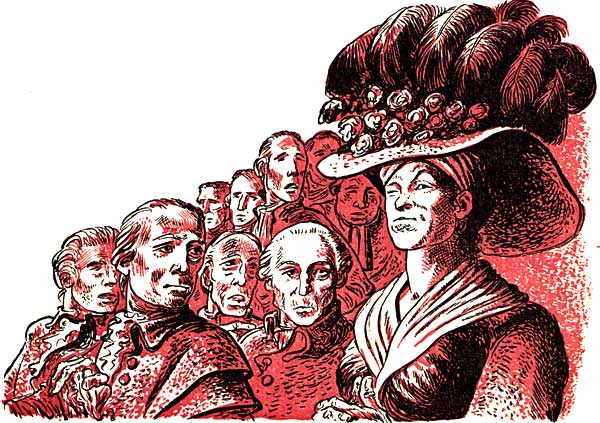
Here Cilley leaned forward, one hand on his stomach to facilitate a bow, aping as best he could the speech and manners of a gentleman. In a flash he resumed his own character and turned to Chris.[43]
"Well, did she take it off?" Ned demanded of Chris, frowning with concentration. "'Twas asked with rare politeness, anyone would agree to that." He shook his head solemnly. "Why no, Master Christopher, that she did not! Our Becky had just paid the final pence upon that hat, and after a year, seven months and eighteen days, the hat was hers. She wanted all beholders to admire it. What cared she if the gentleman seated on the bench behind her saw more of her bonnet than of the play? In Becky Boozer's opinion, 'twas a more than fair exchange! So she tossed her head, did Becky, and deigned not even a reply."
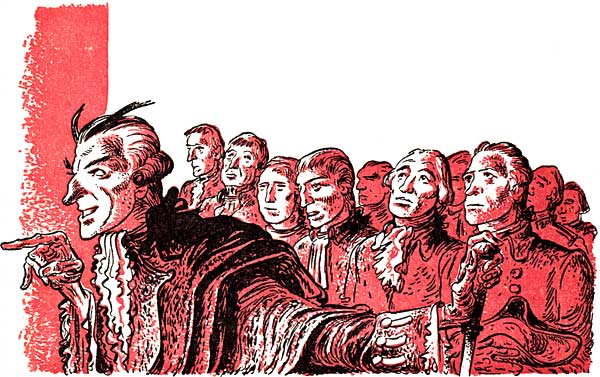
Cilley tossed his own sun-bleached thatch and pursed up his mouth in imitation of Becky. Then, with another rapid change of grimace, he squinted up his eyes to signify the grow[44]ing intensity of the situation, and leaning half-way across the table, shoved the dishes, pies, and pickles out of his way with his elbows. His deep voice sank to a husky whisper.
"So the performance went on, and never a glimpse of it did the poor gentleman see, seated as he was behind our Becky Boozer. So once more he bends forward and he speaks at her ear, urgent-like—"
Cilley's eyebrows rose and fell with his agitation. So strong was the grip of the story upon him that it was evident that he fancied himself at the play, and could see the whole thing before him as plain as day.
"The poor gentleman says again," he took up, "'Madam,' he says, 'I beg of you—please to be so kind! Nothing of the spectacle can I see! Please and be so good as to remove your hat!'
"And would you believe it, my lad—no." Ned Cilley shook his head from side to side, "No, no, you would not." He leaned back, waving his hand as if to wipe away any lingering doubt in Chris's mind. "Mistress Rebecca Boozer was that proud—that proud"—he dropped his voice—"that not for the world would she remove her bonnet. Dear me no! She tossed her head again, feeling all them plumes a-tossin' too, and sat up straighter than before. An' she a tall woman."
Master Cilley took a red bandanna handkerchief from his coattail pocket and mopped his face, so excited and heated had he become at his own telling of the tale. Then once more he leaned forward confidentially.
"Well, little did she dream, our Becky Boozer. For when she tossed her head the second time and made no motion to remove her hat, the gentleman bent toward her, and—no[45] doubt, his words were for her alone. And this is what he said."
Ned Cilley's blue eyes popped and he cupped his hand by the side of his mouth so that his words could carry no further than the few inches dividing the boy and the man.
"He said—and so she told me, it did sound like a roar of thunder, though no one else did seem aware of it—'So, then, Rebecca Boozer, wear your hat!' the gentleman said. 'The Devil himself shall have no power to take it off'n you'!
"And do you know," whispered Cilley in a low rumble, his eyes starting out of his head as were Chris's own, "'Tis our belief it must have been the Devil himself who sat behind her there, for from that very time Rebecca Boozer has been unable to remove that hat, neither by pushing, pulling, prying, steaming, cutting, tearing, nor by any method howsomever! The Devil it was! The Devil it must have been!"
Master Cilley, exhausted by his recital, fell back in his chair, with just strength enough left to replenish his pewter mug from the jug of ale. Then, refreshed, he set the mug down, wiped his lips, and cocked an eye at Chris who sat staring at him open-mouthed.
"Try it yourself," he suggested wagging his head. "I have. You'll not be able to heave it off, that I promise you. That hat is there for good and all. Mistress Boozer will doubtless be buried in that bonnet." He cocked his head the other way. "And what do you think of that?" Ned Cilley enquired.
After a long and thoughtful pause Chris found his voice.
"Master Cilley," he said respectfully, "Does she—does she sleep in it?" he asked.
The picture of the elephantine Becky Boozer with a counter-pane under her chin and the hat with twenty-four red roses[46] and twelve waving black plumes rising above the pillow took hold of the sailor's fancy. He tipped back in his chair and laughed till he cried, and as he was coughing and spluttering, Mistress Boozer herself came rustling out of the passageway and across the kitchen to the table.
"Be off with you, boy!" she cried. "You and Cilley—you're two of a kind, that is plain to be seen!"
She looked from one to the other and Chris decided that it was a good thing for him that Becky likened him to the object of her doting, Master Cilley.
"Get along with you!" she cried again, pulling Chris up out of his chair by his coat collar. "You are wanted by the master in his study, so look sharp! It's down the passage and to your right," Becky said, "and knock before you go in!"
Chris started off, but in the dusk of the passage he looked back in time to see Becky Boozer lost in tittering giggles and wild blushes as Master Cilley, reaching up as high as his arm would go, chucked her under the chin.

hris stood for a moment before the closed door of Mr. Wicker's study. His head was full of the story of Becky Boozer's hat or he might have glimpsed the room beside him—for the passage stopped at this point. Beyond the passage lay the dimly glimmering shop with its bow window at the far end, and the door to the street beside it. He might have been able, had he not been so intent on Becky's story, to slip past the dusty bales and cases and out into—what? But Chris's head was ringing with Ned Cilley's tale, and with all the things, so different and so absorbing, that surrounded him. He put out his hand, knocked, and on hearing a low reply, stepped inside.
The room Chris entered, his eyes round in order to take in every new sight, was a small study. It stretched across the back of the house. The kitchen fireplace had its echo in a fireplace on this side of the wall, and facing Chris three windows looked out onto the pleached pear and apple trees; the ordered rows of the vegetable and herb garden. A final window at the end of[48] the room, at Chris's left, looked out on a little hill behind the house. Chris, without thinking, stepped forward a pace or two in order to look for the familiar ugly red and gray church at the end of Church Lane. It was not to be seen. There was only a pasture hemmed by woods and fine trees with, in the distance where M Street should be, a roof or two.
A thin voice, that came from nowhere and was everywhere, broke in to Chris.
"No, my boy. The church is not yet built. That will come in seventy years. In eighteen-sixty, to be exact. Confusing, is it not?"
Chris whipped about at the sound of the antiquarian's voice but for a moment longer he could not see him, and looked toward the other end of the room with interest.
Mr. Wicker's study was cosy and bright, well warmed by a cheerfully burning fire. The heavy curtains, drawn back now from the windows to let in the morning sun, were of a fine ruby damask. The furniture consisted, as far as Chris was concerned, of antiques. Two wing chairs covered in red leather, tacked at the edges with brassheaded nails, looked invitingly comfortable. One had its back to Chris and the door, and the other was empty. Both were drawn close to the snapping logs. A grandfather clock stood in the corner between the fireplace and the first window, and gave out a steady deep tock. The carpet was a soft Indian rug of fine texture and many colors, red, blue, and gold predominating. Most surprisingly, a steep spiral staircase of polished wood came down into the room in the right-hand corner near where Chris stood, and Chris wondered for a moment, if Mr. Wicker's voice had come from the top of the stair.[49]
Turning back, he saw that a desk, opposite him, stood between the two windows that faced the garden. It seemed very old-fashioned, to Chris—no neat folded writing paper, but large bold sheets covered in Mr. Wicker's delicate handwriting lay on the open top, with several goose-quill pens standing at the back in a penholder. Chris noticed prints of sailing ships on the walls, and candlesticks holding candles and candle snuffers on the desk, table, and mantelpiece. A closed cupboard with carved doors stood at the far end of the room.
Once again Chris turned back to look for Mr. Wicker, and to his astonishment, now saw him in the chair that he had thought empty a moment before. Mr. Wicker, his elbows on the arms of the chair and his fingertips touched lightly together, was watching Chris with interest and amusement. When the boy caught sight of him, Mr. Wicker nodded, smiling, and motioned Chris toward the other leather chair across from him.
"Good morning, my boy," said the old man. "I trust you slept well?"
Chris slowly let himself down into the offered chair. "Oh yes, thank you sir," he replied. "I don't even know how I got to bed."
Mr. Wicker made a sound that seemed to indicate that that did not matter.
"And breakfast?" Mr. Wicker asked. "Becky fed you?"
"Yes sir. And Mr. Cilley—he fed me too."
"Indeed?" Mr. Wicker's eyebrows went up in an inverted V above his bright dark eyes. "Ned Cilley so early? Well, he is a loyal soul, is Cilley. You shall know more of him."
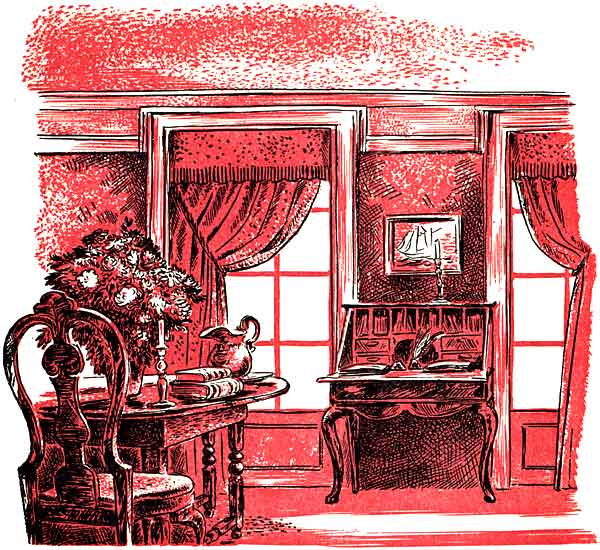
He fell silent, observing the boy sitting on the edge of the big chair. Mr. Wicker looked, as if casually, at the clothes[50] Chris now wore and which fitted him as though made to his measure. What he saw seemed to please the old man for he nodded his bald head and his wrinkles multiplied themselves across his face in a way Chris took to be his smile. At last he spoke again, and his voice was strangely gentle and kind. So kind that the forlornness Chris had momentarily forgotten at the mystery of his position, the puzzlement and lost feeling that reclaimed him instantly should he allow himself to wonder at how he could get back again into his own life and time, was[51] reawakened by the something he heard in Mr. Wicker's voice. The tears gathered in his throat and he had to swallow and cough several times before he could reply with any degree of clearness.
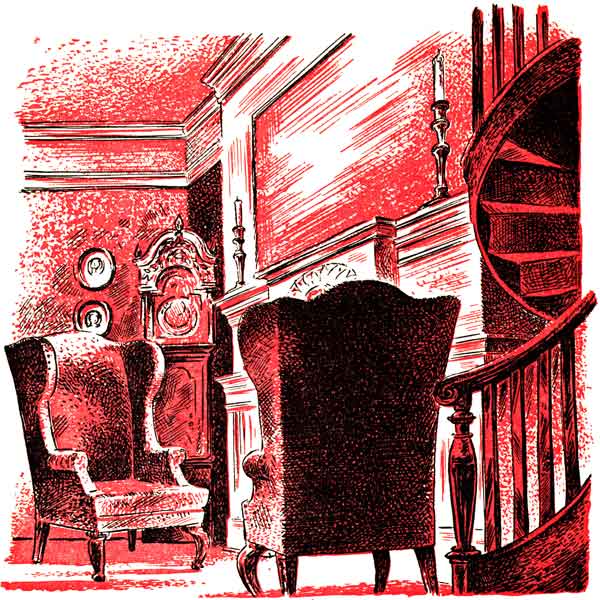
"Feel? Well—all right, I guess, in a way. But there's a sort of spinning in my head and my stomach if I try to figure any of this out. I just don't get it." He shook his head dubiously. "I feel alive all right, and the food tasted good just now, but how in the world can all the changes come about, or[52] be? And there's something I should see to, at home—" All at once he needed desperately to know how his mother was, that morning. He stood up abruptly.
"If I can just go now, please?" Chris asked politely but firmly. "It's been very interesting, but I—"
His throat tightened up again and he made a helpless gesture with his hand, and looking toward the window, wondered if he could jump out into the flower beds and be off. Mr. Wicker's voice, soft but with such authority that one did not question it, came again, and it had a healing in its sound.
"Sit down, Christopher my lad," he said, and his eyes were kind, intent and eager. "We have much to talk of, you and I. But first, your mind and heart shall be put at ease. Do you know who I am?"
Restive and anxious to be off, Chris nevertheless found it necessary to reply.
"You sell old stuff. That's all I know," he answered, beginning to feel a trifle surly.
Mr. Wicker nodded, tapping his fingertips together. "Yes," he agreed, "I sell old things—in your time. But now—in this time, what do you know of me?"
As he spoke there was a change of tone, as if a younger man was speaking, and in spite of his impatience to get home, Chris looked up sharply. Mr. Wicker was leaning forward, and Chris felt himself immovable under the vigor of those dark eyes.
"Nothing, sir," he heard himself saying, not taking his eyes from those of the man before him.
"I am a shipowner, Christopher, for one thing," Mr. Wicker[53] drew a slow breath. "A merchant trading in tobacco, cotton, corn, and flour. But I am also—" he paused as if to give Chris time to hear each word, "I am also quite a fine magician," said Mr. Wicker.
Chris leaned back, disappointed and scornful. "Rabbits out of hats?" he inquired.
"No, young man," Mr. Wicker answered with no show of annoyance, "Not rabbits out of hats. That—as you would say—is for toddlers. Suppose I prove to you just how good?"
"Go ahead," said Chris, whose only thought was still to get home but who admitted to himself a faint stir of curiosity.
"Watch closely then," commanded Mr. Wicker. "I have been in my twentieth-century shape so that you would recognize me. Now I shall regain my appearance of this time—not a great change, I grant you, but there will be a difference. Watch me closely."
Chris leaned forward in his chair. The room was well lit from three sides; sunlight and firelight mingled to wash Mr. Wicker in their joined apricot glow. Added to this, the two chairs—Chris's and Mr. Wicker's—were not more than four feet apart. Chris hunched forward yet a little more to lessen this space and watch for any movement, however swift. He had seen magicians before, he told himself.
But what he saw was so amazing that Chris's lips parted in astonishment and his eyes stared unblinkingly. For the tiny figure of the old man before him, wizened with age and wrinkled past belief, before his eyes shook off not ten or twenty years, but one hundred and fifty! It left him, while not a young man, middle-aged; a vigorous man of forty years.[54] The face was smoothed out and firm; thick chestnut hair was caught back with a black ribbon bow. Dark eyebrows were level above the steady eyes.
"I don't believe it!" Chris breathed. "You looked almost like a mummy, before. And now—"
Mr. Wicker rose from his chair, and now he stood six feet, no longer wizened, no longer feeble.
"Fascinating, is it not?" he remarked, with a sardonic smile. "A good trick, do you not agree?"
Chris sat looking at him, amazed but still incredulous. "Well yes," he admitted, "but maybe with make-up, or something—"
"Ah," said Mr. Wicker, and his voice was deeper and more vigorous too. "Ah. Then we shall try another. See if you can find me." And before Chris's eyes Mr. Wicker vanished into thin air.
Chris looked about and got up. He looked under the chairs, under the table, behind the curtains, up the chimney, up the spiral staircase, out the windows—in short, everywhere and anywhere a man might hide, and in a great many places where it was impossible for him to be. Finally he stood in the middle of the room.
"You're not here," he said aloud.
"Oh, yes, I am," said Mr. Wicker's voice. "Look on the table."
Chris looked on the table. A bowl of flowers stood in the center. A small silver tray with a finely blown glass and a round-bellied silver pitcher of water stood at one side. A few leather-bound books were all else to be seen, except—if one could count that—a bluebottle fly that buzzed, lit on the flowers, and buzzed again.[55]
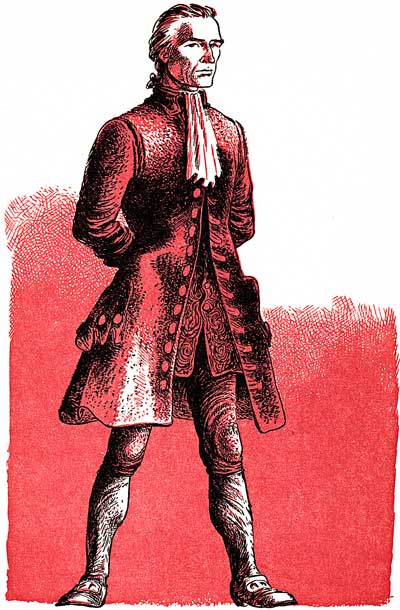
"It's not fair!" Chris challenged aloud. "You've got some trick hiding place. You're just not here."
"Yes I am," came the voice. "I am within reach of your hand, Christopher," Mr. Wicker told him. "And I will reappear in whatever part of the room you wish. Choose."
Chris looked around him, and then pointed to the end window.
"There," he said, "by the window. There's nothing anywhere around it. Come back there."
"Very well," sounded Mr. Wicker's deep new voice.
The bluebottle fly buzzed upward from the table, flew directly at Chris's nose, hit it, flew around his head, and bumped into his ear.
"Darn that ol' fly!" Chris muttered, and made a grab at it. The bluebottle buzzed towards the window, swirled about, hit Chris on the nose again with remarkable stupidity, and blundered off once more towards the window.
Chris ran after it, saw it on a pane of glass, swooped down, and felt the angry wings and heard the enraged buzz in his cupped hand. But before he could either squeeze the fly or open his hand to let it free, Mr. Wicker stood before him, and Chris found himself holding on to the tail of Mr. Wicker's coat.
"And what did you think of that trick?" asked Mr. Wicker smiling.

hris was speechless, and Mr. Wicker answered himself.
"Yes, it is a good trick, but before we talk, I should like to show you one more."
He dropped his hand on Chris's shoulder and somehow the firm touch was wonderfully comforting to the boy.
"You want to be at home, do you not, Christopher?" Mr. Wicker asked.
"Yes sir. Please."
"Well, that cannot be for a time," Mr. Wicker replied, "for you have important work to do."
Mr. Wicker turned and walked back to the two leather chairs with his hand still on Chris's shoulder. He stopped near the table and looked down.
"I know that all this—" he waved a hand to take in not only the room but, Chris thought, the different time as well, "—all this seems impossible to understand." He paused, pondering. "Perhaps we had better sit down and I will try to make it understandable."[58]
"Let me put it this way," Mr. Wicker began when they were seated once more in their chairs before the fire. "You have a television set at home?"
"Oh yes!" Chris agreed enthusiastically, "And say! Some of the programs—"
"Yes, they are splendid, I know," Mr. Wicker broke in. "But will you please explain to me how television works?"
Chris stared at his questioner for a moment and then settled back in his chair, his forehead puckered with concentration.
"Well, gee—" He stopped. "Well," he began again, "I think it has to do with light rays passing through a—well, hm-mm, there's an electric impulse, see—I guess it's that that sends out—" He stopped altogether. "Well golly Moses, Mr. Wicker," he ended lamely, "it seems to be pretty complicated to go into."
Mr. Wicker smiled, a wide engaging smile showing strong white teeth.
"It is," he agreed warmly, his eyes twinkling, "Is it not? Very complicated. You probably would not be able to describe to me the details of how the radio or long-distance telephone work either, would you, young man?"
Chris had to grin back when he saw that Mr. Wicker was not laughing at him, but rather at the complexity of such mechanical things.
"No, sir, I guess not. We're just glad to be able to use them, I expect."
"Ah!" said Mr. Wicker in a tone of immense satisfaction, "Quite so. You are just glad to be able to use and enjoy them. Well, then, my boy, the things I have just shown you, and[59] what I am about to show you now, are parts of knowledge which are yet to be discovered and learned, in a time beyond your own. And the ability to move within Time—within Time," Mr. Wicker stressed, leaning forward toward Chris, "that faculty is also still in the future. In the meantime it remains a rare gift."
Mr. Wicker put out a lean strong hand and tapped Chris's knee.
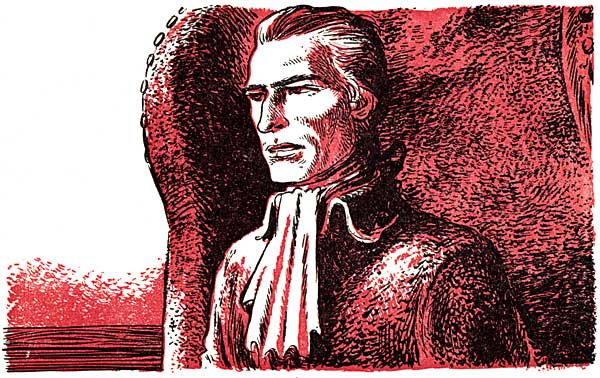
"You have it, Christopher. You were born with the ability to move backward into time that has passed. Whether or not you will ever master the gift of moving into the future, that, of course"—Mr. Wicker shrugged—"is impossible to tell. You may. But for my purposes, that you have been able to return this far is enough." He looked searchingly at Chris. "Have you understood what I have been saying up to now?" he asked.
"I think so, sir," Chris answered slowly.[60]
"This ability to move back and forth in Time," Mr. Wicker continued, "is no more farfetched than the ability to send colored images and sound across the land into your own house, where you can see and hear them. It is something which, so far, and I mean, of course, in your time, has not yet been discovered. But it will be," mused Mr. Wicker thoughtfully, pulling at his underlip with thumb and forefinger. "Yes, it will be." He looked across at Chris as if returning from a great distance. "But until it has been it appears fantastic, does it not?"
"It certainly does!" Chris replied with fervor. "If it weren't happening to me I wouldn't believe it!"
"No," nodded Mr. Wicker, "and I would not blame you. But now," he announced, rising and turning toward the table, "you must have your mind set at rest regarding your mother." He motioned for Chris to join him. "You will need to know only once and they say—" he smiled down at the boy beside him "—they say that seeing is believing, so you shall see for yourself."
Mr. Wicker picked up the round-bellied silver pitcher and set it in front of Chris.
"They say too," Mr. Wicker said scornfully, "that crystal balls are the things to look into. Perfect tommyrot. This will do equally well. Look and see."
Chris bent to peer at the polished silver side of the pitcher. At first, it shone as no doubt it always did from Becky Boozer's powerful rubbing. Then, as he watched, the rounded side of the pitcher misted over, as if it had been filled with ice water. Next, the center of the misted portion cleared away, and as it[61] cleared a picture formed, welling up into his sight as if from within the pitcher through the silver of its sides.
What Chris saw was a hospital room. On a white bed lay his mother, and beside her were his Aunt Rachel and a white-coated man Chris took to be a doctor. Then, as if inside his head, for he was not conscious of sound within the room which had grown deeply still, he heard voices and words, and saw the lips of the doctor and his Aunt Rachel move.
The doctor said, "The turn has come. She will pull through, but she will need watchful care."
"Oh, thank God! Thank God!" his Aunt Rachel cried, and covering her face with her hands, she burst into tears.
The scene misted over once again and when it cleared, the pitcher was merely a pitcher on a table in Mr. Wicker's room. Chris looked up at the man who regarded him gravely.
"Is that a trick too?" he asked. "Just to make me stay?" he demanded more loudly.
"No, son," the man replied, and his eyes confirmed his words. "That is how it really is. My word of honor."
And to Chris's great surprise, all at once he felt tears on his cheeks while simultaneously a great lightness invaded him, and a wild wish to laugh.
Mr. Wicker poured him a glass of water and held it out.
"Drink this," he said. "All is well. You can be at peace. And now," he went on in a brisker tone, replacing the glass Chris had drained, "let us begin our talk."

hris returned happily to his chair and curled up in it as if he were at home. Even Mr. Wicker's expression seemed to have changed, and as a matter of fact it had, for the relief and portion of content that showed now in the boy's face, was reflected in some measure in that of the man. Before seating himself Mr. Wicker rang a silver bell on the tray by the pitcher. In a moment Becky Boozer knocked on the door and stuck her gigantic hat through the opening.
"You rang, sir?" she inquired, the feathers and roses bobbing as cheerily as live things around the sweeping brim.
"I did, Becky. It occurred to me," said Mr. Wicker, looking sideways at Chris, "that some hot chocolate for Master Christopher and coffee for me would not be amiss at this hour of the morning. And," he added, seeing the interested spark in the boy's eyes, "some of your delicious little cakes, perhaps?"
"Most certainly," beamed Becky, "most certainly sir. I have[63] the chocolate hot, as it so happens, and some cakes new-baked."
She bustled off and in no time returned with a tray of china cups, matching flowered pots for coffee and for chocolate, a bowl of sugar, and a plate piled high with cakes. From one corner Becky pulled out a small table which she placed between the two chairs. The tray was safely settled, the fire given a poke and a fresh log before Mistress Boozer removed herself, in her starched dress and apron and her outrageous hat, from her master's study.
"Now," said Mr. Wicker, pouring out the steaming drinks, "we shall refresh ourselves and you shall listen, if you will."
Chris took a sip of the hot chocolate and a bite of golden cake, deciding that he had never tasted better. This point decided on within himself, he gave his attention to the man across from him.
"I told you," Mr. Wicker said, "that I was a shipowner and a merchant. That is true. But these are troubled times. A revolution has had the land in its grasp. Times are bad, and this vast land is now convulsed with the birth throes of democracy. Money is hard to come by, and much needed, for General Washington's troops were farmers called away from their harvesting or sowing. The period of healing, for them and for the land, will be long and costly."
He paused to sip his coffee and then put the cup down.
"Destruction is so fast, and to construct and build," Mr. Wicker said, staring at the fire, "that is what is slow." He turned to Chris. "Without financial help, without money for the beginning of this new land and this new government that is struggling to be born, this free place and this fine democratic[64] experiment will fail. I know a way to save it, and you have been sent back into the past from our future—my future and yours, and that of the land—to help us and make it real. You will not disappoint me, Christopher?" Mr. Wicker turned burning eyes on Chris's face. "You will help your country get its start?"
A wave of excitement such as he had never known surged over Chris and he started to his feet, almost upsetting the table and making the cups rattle on their saucers.
"Oh, yes sir! You bet! If I can, I'll help!"
Mr. Wicker's face expressed his satisfaction. He rose too and held out his hand.
"I knew you would," he said. "It had to be, for it could be no other way. But there is always doubt. Your hand, my boy, for we have work to do together."
The two hands, large and small, were firm, one in the other, and Chris felt a new power coming to him from the man whose hand he grasped.
"Listen closely," Mr. Wicker said, and Chris drew nearer. "There is a wondrous thing, unique in the world, and which, for the benefit of this growing country, we must obtain. Its possession will mean we can pay for many things—a new city here, tools; building materials. This wonderful object is the Jewel Tree belonging to the Princess of China."
Chris waited, listening.
"This Jewel Tree," Mr. Wicker went on, "is a tree that grows, that puts out leaves and flowers and bears fruit, but here is the wonder of it," and he bent his piercing eyes on Chris's intent face. "This growing tree is made of jewels; leaves and flowers and even seeded fruit. The leaves are emeralds; the[65] flowers, diamonds and sapphires; the fruits, huge rubies seeded thick with pearls. Imagine such a treasure if you can!" He spread his arms wide and Chris's eyes were shining with excitement.
"Imagine the possession of such a plant!" Mr. Wicker went on. "Break off a branch of it—another grows. And flowers and fruit—much like your orange trees—bear both their fruit and flowers at the same time."
They sat down again, the better to continue their conversation.
"The taking of such a prize would be hard enough," Mr. Wicker continued, "for it is well guarded. But there is a greater hazard." He rose from his chair to walk about in his nervousness and eagerness at what lay ahead. Then he went on.
"There is a man here, posing as a merchant. Claggett Chew. You will see him in the town when you walk there, which you shall do, presently. But he has some magic powers, and knows me well. Too well." Mr. Wicker shook his head and his eyes became slits of rage. "We have been enemies for long," said Mr. Wicker, "but he has yet to get the better of me."
"Is he after the Jewel Tree too?" Chris wanted to know.
"He is. He heard of it, by power of magic certainly, for it is a secret so well guarded that those who carry knowledge of it—all but myself, up to this time—all others have died before they could make use of it. You can well imagine," Mr. Wicker enlarged, turning his gaze on Chris, "that a treasure that replenishes itself is beyond price. The Chinese Emperor knows it well. So do the guards about his palaces, and so does Claggett Chew."
Mr. Wicker strode about, striking the closed fist of one hand[66] into the palm of the other, and Chris scrambled out of his chair to stand watching the pacing figure. And it came to Chris as he followed with his eyes the black swinging coat, the silver-buckled black knee breeches, the neat white stock and black-brocaded waistcoat of the magician, it came to him that he had a great confidence and affection for this man. Even knowing him as little as he did, having to take so much on trust, still, in Chris's mind there was no smallest grain of doubt, suspicion, or distrust. He knew, without having to think it out, that Mr. Wicker was a great man, great in knowledge and in heart. Reliable and kind and wise. In that moment Chris put his whole faith in a man he had not known yet for a day.
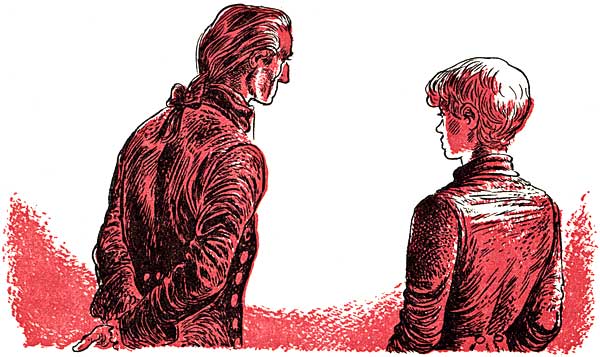
"There is one way," Mr. Wicker said, wheeling about and standing still, "and that is where I need your help." He strode back across the room towards Chris. "This villain, Claggett Chew—for that is what he is, no better—this villain knows[67] me and he knows my power. But if my power were in a boy—a lad he never would suspect—then—" Mr. Wicker put both hands on Chris's shoulders and looked searchingly at him—"then only would we have an opportunity to seize the Jewel Tree. Can you learn what I know?" demanded Mr. Wicker. "Can you learn my magic?"
"Magic?" Chris stammered. "Those tricks—the fly—and others?"
"Yes," said Mr. Wicker quietly. "Many more."
"Well," Chris answered after a moment's thought, "I got here, didn't I? I've gone back all these years, so I guess I could." He looked up with a grin. "At least I can try," he said.
Mr. Wicker gave Chris's shoulder a little shake of pride and acceptance. "Good lad!" he said. "I know that you can learn. For you it will not be hard."
"There's just one thing," Chris said, with puzzlement in his voice. "You say, sir, 'Seize the Tree.' That means just stealing it? Must we do that?"
Mr. Wicker looked at Chris and his face was serene and smooth with the great satisfaction of his feelings.
"You are the lad for me!" he cried, and Chris felt himself coloring with pleasure at the tone of Mr. Wicker's voice. "I knew it from the first! It would be stealing, boy, but for one thing. When—and heaven willing, if—you reach the Tree, you will break a branch from it and stick it in the ground. It will root itself and grow and thrive, and the Princess will still have delicate jewel flowers for her hair."
"And now," he said, "I smell a broiling chicken. Off you go and eat your lunch, and later we shall talk again."
Chris went out smiling.

n the kitchen, Chris leaned against the corner of the passage and kitchen wall to watch Becky at her tasks. How different from the compact white kitchen they had at home! And yet there was a cosy feeling about the huge room in front of him with its ruddy copper utensils, tub-size wicker basket of vegetables, steaming pots hung over the fire, and the browning row of four chickens on a revolving spit, that gave out a friendliness and welcome modern kitchens did not have. Becky finally paused in her work long enough to glance out from under her hat at Chris.
"Now then, me lad! 'Tis not yet time to eat. That young belly of yours takes a bit of filling, and no mistake! Be off now, and do you not go a-bothering Becky for a bit. I will soon call you when all's done."
Chris would have liked to go outside and put his hand on the handle of the back door, when a momentary confusion overtook him. He wondered if in going out he would step back into his own time before he had completed the work Mr.[69] Wicker wanted him to do, and suddenly unsure, turned away regretfully. Not knowing where else to go, he climbed the stairs to his bedroom.
Becky had made his bed, and the little room looked spruce. Chris walked into one of the niches made by the projecting windows, pushed up the sash, and leaned perilously out.
This was to be the first of many such times that Chris was to lean out so, king of this new world spread out below him as far as the eye could reach. A vast and absorbing panorama lay beneath and beyond him. Immediately below turned Water Street, narrow and muddy, while the broad wharves and wooden storehouses spaced themselves at intervals along the shore. Beyond, the sailing ships of all kinds that he had admired that morning pointed their bowsprits along the docks or swung at anchor along the river.
Chris looked down at the many vessels. He could not tell one from another, but names began to drift into his mind from some forgotten trip to a museum, or from the pages of a book read long ago. Frigate, schooner, brigantine. Good ships all. The creak of rigging sounded in the names, the harsh whip of salty winds, and the heart-lifting sight of white sails cutting across blue water. Chris leaned on his arms, his eyes shining. If he should ever go to sea in a sailing ship, what a day that would be! And then he remembered that he must do so if he were ever to obtain the fabulous Jewel Tree. All at once the dangers of such a quest were terrifying, and Chris turned his thoughts away from them to look at the view.
Where the city of Washington lay in his time were only woods and marshlands. No Monument, no Lincoln Memorial, no houses. Lying in the river like a great green ship, he could[70] see the island which had once belonged to his ancestor, George Mason. Once? Now it probably still did. He could make out figures moving at the bank of it, and a ferry pushing off from the shore.
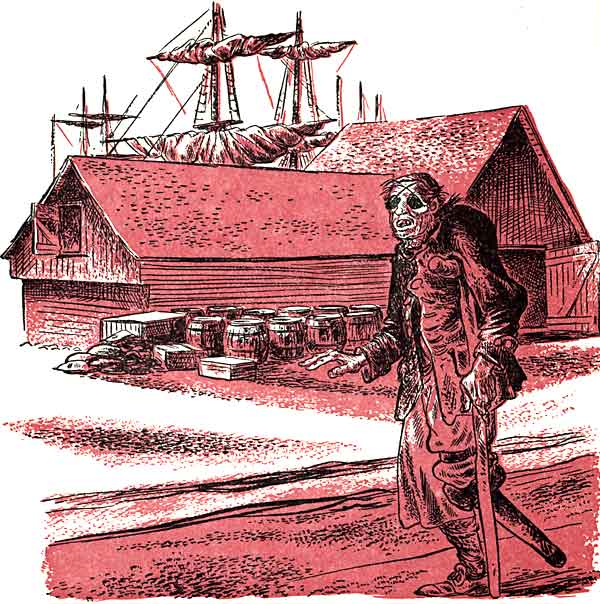
What fun this was! Chris gave a chuckle out loud. What a chance—to see what once had been! He was enjoying himself increasingly as he glanced down at the activity along the riverbanks.[71]
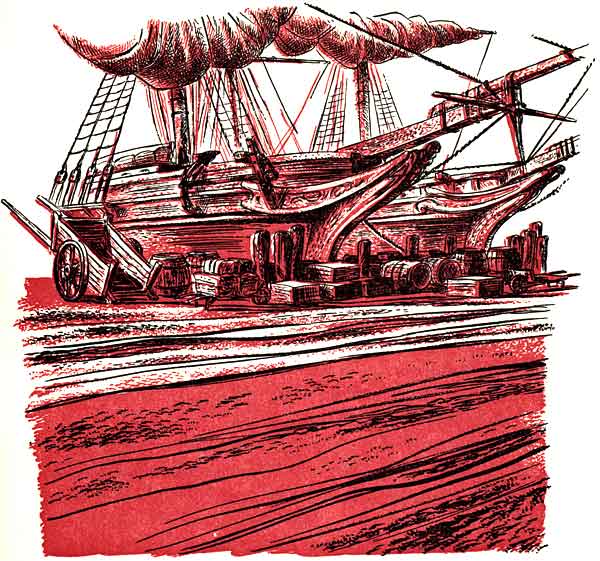
So close to noon, the sailors and stevedores had vanished to eat their meal, and passers-by were few. The street was nearly deserted when along the hardened muddy ruts of Water Street Chris heard a wailing cry: "Pity the blind! Pity the pore blind!" The boy looked down, and the drop below him to the road made his head swim, until he refused to think of it. He saw below him a grotesque figure making its way, turning its head toward the houses as it made its cry.[72]
It was a hunchbacked man with a wooden peg leg and a crutch. Tied crisscross over his snarled hair were two black eye patches. He was unshaven and in a rare state of filth, his coat green with age and speckled with greasy stains, the stocking on his one good leg wrinkling down into his shoe, and his hands gnarled with long-nailed fingers. Chris gave an involuntary shudder, but the sight of the man held his gaze, for he had never seen anyone quite like him before.
As the cripple advanced slowly past the few houses of Water Street, here and there a window was opened and a coin tossed out, which the cripple held his cap for, or grubbed with his filthy hands where he heard it fall. Watching his progress, Chris became fascinated with the accuracy with which the blind man caught the coins or found them in the road. After a passing gentleman on horseback had tossed a silver piece in his direction, the hunchback made off around the corner of the stables beyond Mr. Wicker's garden.
The boy hung out even farther and craned his neck to see what the blind man would do, for from his determined gait he seemed to have a purpose. Feeling along the side of the barn to guide himself, when he came to the back of it the cripple darted around, and then, to Chris's amazement, lifted the corner of one black eye patch and peered out from under it! Seeing no one, and thinking himself unobserved, the cripple nonchalantly pushed both eye patches onto his forehead, fished in his pocket, and began examining the silver piece he had just retrieved. It appeared to satisfy his scrutiny, turn it over and over though he did, but to be quite sure of its value he bit tentatively on it with his back teeth. This seemed to be the final test, for the cripple grinned from ear to ear, disclosing even fewer teeth than Master Cilley.[73]
Next, the hunchback sat down upon a heap of straw, laying his crutch beside him, and with a quick movement, wriggled himself out of not only his jacket but his humpback too!
Chris could scarcely believe his eyes, but he now saw that a false hump had been cleverly sewn into the jacket from inside. The cripple untied a patch that formed a trap door in the hump, and putting his hand inside the hollow, drew from its hiding place in the false hump a small bag tied at the neck with a string. Then, as Chris watched, he counted the contents of the bag, pieces of money that winked in the sun, and added to his horde those pieces he had begged that morning. The bag was then retied, replaced, and the jacket and hump put back on its wearer with evident satisfaction.
But the cripple had not yet completed his work. Holding the silver piece between the blackened stubs of his front teeth, with difficulty he managed to hoist his peg leg over his good knee. Then, after darting many a sly look all about him, he unstrapped the wooden peg off the stump of his leg.
First, from the interior of the stump he pulled out an assortment of rags used for stuffing, and to cushion the weight of his stump. Then, after spreading a torn bandanna handkerchief near him, he tipped up the stump and from its hollow peg, out rained a shower of coins!
Chris looked, and looked again. Gold and silver money flashed on the crumpled handkerchief, and adding to it the last silver piece he had held in his teeth, the loathsome cripple stirred the heap around and around with one dirty forefinger, his mouth stretched in a cackle of greed.
After a while he caught up the coins, counting them over not once but many times, and at last let them fall slowly one by one into the hollow peg of his stump, strapping it back[74] securely. Finally, after looking about with his face close to the ground to make sure that no smallest coin had escaped him, the cripple replaced his eye patches and heaved himself up with his crutch under his arm, turning to make his way once more toward the docks and the ships. His wailing cry lagged behind him like a cur dog: "Pity the blind! Pity the pore crippled blind!" Yet Chris now noticed that his head was tilted back to enable him to see under the patches as he went.
The boy was straining to see him out of sight when a resounding bellow from Becky Boozer let him know that dinner was ready. Hastily shutting the window and running downstairs, Chris could think of only one thing.
"Becky!" he cried, bursting out at the bottom of the stairs, "Who is the blind man that just went by—the hunchback?"
Becky never even turned from the plate she was preparing. "Oh, him? That would be Simon Gosler, one of Claggett Chew's men. How he can be a sailor beats me, but Claggett Chew has hired him for years, plague take him! Now," and she came toward the sunny table with a beaming smile, "eat up, young man, or I shall think my cooking does not please you!"
Chris hurriedly set about proving his appreciation.

he learning of magic was by no means easy. The days went by with Chris's mornings and afternoons spent in Mr. Wicker's study, reading books too heavy for him to lift, learning incantations by heart, and how to blend simple formulae over the fire. He had told his master at once about Simon Gosler, his horde of money and his hiding places for it. Mr. Wicker though interested and attentive, gave Chris the impression that what he had been told was not new to him. At times Chris was allowed to run about the large vegetable garden and climb the orchard trees, but he was told that the moment had not yet come when he could wander at will in early Georgetown.
Chris had tried it once, rebellious and bored at the now familiar ground, but it was as if an invisible wall kept him in the confines of Mr. Wicker's land, a slippery glass wall he could feel but not see, and in which he could discover no chink in which to put his toe to find the height of it. So there was nothing left to do but to work as fast and as well as he could.[76] "There are rumors," Mr. Wicker had told him quietly, too quietly, "that Claggett Chew is preparing his ship, the Venture, for a voyage East. There is much activity about his ship, and he is laying in stores, so I am informed. We must get forward with all haste, for his ship is a fast one—faster than the Mirabelle."
Chris therefore threw himself into all the preliminaries of his task. His head swam when he laid it on his pillow at night, and Becky Boozer would stand with her hands on her barrel-sized hips, shaking her hat until its plumes and roses waved madly, over "her boy's" shadowed eyes and weary air.
For Chris was now as accepted a member of the household as Mr. Wicker himself, and had it not been for the robust guffaws of Ned Cilley, and the ministrations of the now devoted Becky, Chris's days would have been tedious indeed.
One afternoon when he returned, after a rest, to Mr. Wicker's study, he saw that there was something new in the room. A bowl with a goldfish in it stood on the table, but Mr. Wicker was not to be seen. Now, however, Chris was not the boy he had been a few weeks before. He went straight to the bowl and addressed the fish.
"Sir," he said to the goldfish, "I am here. What shall I do first?"
The goldfish might almost have been said to have changed its expression and smiled, before, brushing a drop of water from his sleeve, Mr. Wicker stood beside the table smiling.
"How you have improved, my boy!" he exclaimed. "It is now time for you to try, and this is as good a change as any."
All at once, at the imminent prospect of really changing him[77]self into some other form, Chris became frightened and his hands grew cold.
"Oh, sir! Do you really think I know how?" he cried, gazing up into the face of his master. "Suppose I change and can't change back?"
Mr. Wicker shook his head with a smile.
"Never fear, Christopher. You know enough to start, and I feel reasonably sure that you will be quite able to change back again. If you get stuck I can help you. Come now," he said, putting out his hand to touch Chris's shoulder in a reassuring way, "here you go. Remember Incantation Seventy-three, Book One."
Chris stared at the fishbowl, empty now. He remembered Incantation 73, Book One, quite well, but his knees began to tremble and he stood as if paralyzed. Mr. Wicker waited patiently beside him for a few moments for Chris to get up his courage.
Then as nothing happened, with a voice like a whip Mr. Wicker said: "Start at once!"
Chris was so startled at his usually gentle master's tone that without further thought or effort on his part, he began intoning to himself the words and sounds of Incantation 73, Book One. As he went on, concentrating on becoming a goldfish in the bowl on the table, he became aware of a humming sensation in his head. This grew until it seemed that all his body was filled with the strange new vibration, tingling from his feet to the crown of his head. The sensation spread, faster and faster. His head swam and he felt faint and a little sick, but he persisted through the final words. Somewhere deep inside him[78] there seemed a sudden lurch, and then a wonderfully cool, liquid sensation. He felt buoyant and rested and looked about, only to get a wavery, enlarged glimpse of Mr. Wicker, looking more like a reflection in a circus mirror than himself. With a light twist of his body Chris floated over, to see that the room looked the same, and rolling back, could see that Mr. Wicker was peering in at him from above and smiling broadly.
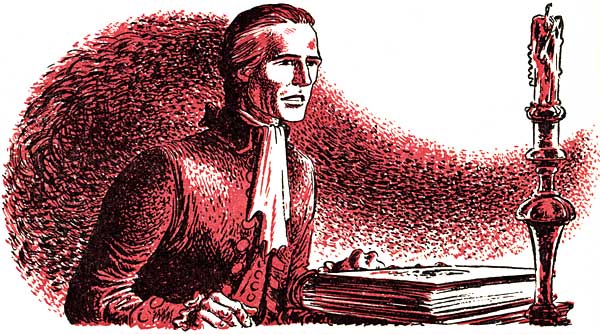
"Good Lord—I'm a fish!" Chris said, and he heard the words muffled as they came back to him through the water of his bowl. Well, what do you know? he thought, not without a feeling of pride, and commenced experimenting with his tail and fins with such enthusiasm and delight that some little time elapsed before Mr. Wicker's voice boomed close by.
"Better come back now. Take it slowly, son. Seventy-four, Book One: The Return."
The same strange sensations flooded Chris as he made the change back to his own shape, but when he stood once more[79] on his own two feet on the carpet in Mr. Wicker's study, he was pleased and happy despite his weakness. Mr. Wicker took hold of his arm and helped him to a chair, and taking a small vial from the cupboard at the end of the room, he dropped a pellet into it and handed it to Chris.
"This will seem to smoke. Sniff the smoke and drink the liquid that remains," he said.
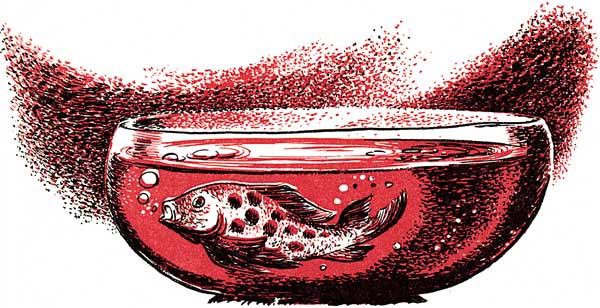
Chris did as he was told, and his momentary weakness vanished, leaving him quieted and as strong as usual.
"There now," Mr. Wicker said, rubbing his hands with immense satisfaction, "that was not so bad, was it? A peculiar feeling, but as you come to do it more often and more quickly, the change will come more rapidly and in time you will be scarcely aware of the sensations at all." He looked at his pupil with pride. "You will do famously, my boy. In another moment, when you have rested, we shall try another one."
From that time, Chris became increasingly proficient, and[80] as his ability grew he began to find magic a wonderful game, which he and Mr. Wicker played together. They played this new and unique form of hide-and-seek, each one taking a new shape, turn by turn, as a challenge to the other's powers of imagination and detection. Soon Chris could turn himself into a limited number of things, for even Mr. Wicker's magic had a limit: a singing bird in a cage, a part of the pattern in the brocaded curtains, or a section of the design in the Indian rug. The bluebottle fly or the goldfish became as easy as saying "Eureka!" and on one occasion Chris turned himself into the chair on which Mr. Wicker was sitting, and then walked across the room on his four wooden legs carrying Mr. Wicker, who laughed more heartily than he had in years at this display on the part of his student.
One day Chris wandered alone into the dusty shop. The time had nearly come when he could walk about in early Georgetown and know that it would still be the Georgetown of the past, and not the one into which he had been born. This afternoon, a rainy one, he had tired of changing himself into and out of objects. Mr. Wicker was busy, and Becky Boozer had gone off to market accompanied by Ned Cilley. Chris felt somewhat forlorn and lonely, as any boy might, and kicked an old piece of wood ahead of him into the darkness of the shop.
Going up to the shop window, he stood with his hands thrust into his pockets staring glumly first out the window and then, idly, at the three objects he had once loved to contemplate, the Mirabelle in her bottle, the coil of heavy rope, and the carved wooden figure of the Nubian boy.
Without interest at first, Chris stared at the little Negro boy,[81] so gaily dressed in full red trousers, gilded jacket and white turban. The figure's shoes, carved in some Eastern style, had curved up-pointing toes. Then all at once the idea came to Chris. If he was to be a magician, could he make this boy come to life?
The prospect excited him wildly, for he had no companion with whom to laugh and share jokes. Grown people, however gay and kind, were never quite the same. The more he thought of it, the more Chris knew it had to be attempted. He squatted on his haunches, examining the carved wooden figure attentively, and felt convinced that, once alive, the boy would be an ideal and happy companion.
But how did one change inanimate to animate? Chris got up and stole back to Mr. Wicker's door. He heard the magician going up the spiral staircase to his room above, and after changing himself to a mouse to slip under the door and see that the room was really empty, Chris resumed his proper shape and opened the doors of the cupboard at the far end of the room.
On its top shelf was Book Three, a book a foot thick and bound in heavy brass studded with semi-precious stones in the form of signs and symbols. With difficulty, standing on tiptoe, Chris lifted it down, and placing it on the floor, turned over page after page.
The afternoon, rainy before, increased in storm. Dusk came two hours before its time; thunder snarled in the sky.
At last Chris found it. There were the words, and there the charm. Certain elements were to be mixed and poured at the proper time. He hurried, memorizing as he closed the book, and hoisted it once more to its high shelf. Looking about, he found the ingredients that had been listed, and in an empty vial[82] poured first two drops of this, and then seventeen of that, and ran to heat it at the fire.
Mr. Wicker began moving about upstairs; the floorboards creaked, and still Chris could not leave until the potion fumed and glowed.
After what seemed an endless time, amid a growing grind of thunder and in the almost darkened room, the phial in Chris's hand gave off an arching rosy glow. Chris, his cheeks hot from excitement and the fire, tiptoed out just as Mr. Wicker's step creaked on the topmost tread of the spiral stair. With infinite caution Chris closed the door silently behind him, and running lightly forward, reached the figure of the Negro boy.
The words came out, interrupted by peals and cracks of thunder. The shop was black except for the paler crescent of the bow window giving onto the street. With a crash of thunder all but drowning out his words, the boy shouted in the emptiness of the shop as he poured the rosy liquid on the figure made of wood.
And then, appalled at his audacity, Chris dropped the phial which splintered on the floor. Watching there in the darkness, he shook so with nerves that he had to kneel.
For in the blackness lit only by the lightning and its own eerie glow, the wood was changing as he watched.
It was as if the stiffness melted. Under his eyes the wooden folds of cloth became rich silk, embroidery gleamed in its reality upon the coat, and oh! the face! The wooden grin loosened, the large eyes turned, the hand holding the hard bouquet of carved flowers moved, and let the bouquet fall. The feet of the boy twitched and shifted in their pointed shoes.[83]
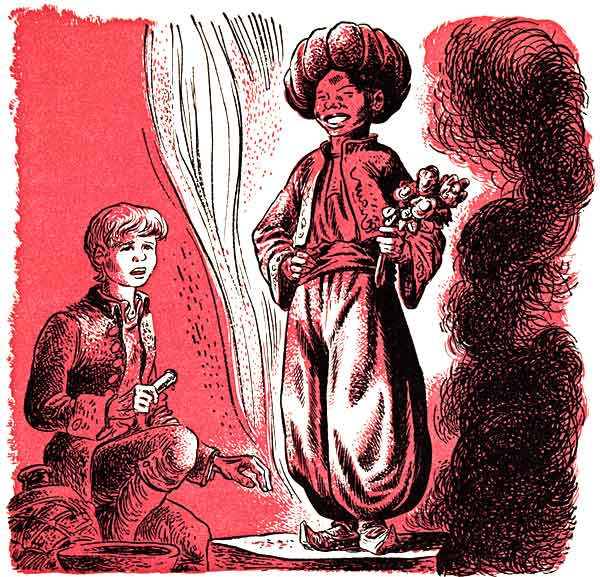
Aghast, Chris remained frozen as the boy moved slowly, and a final Boom! of thunder seemed to split the sky apart. Outside, the rain poured down as if over some skyward dam.
The boy looked down at Chris with a radiant smile and put out his hand.
"I'll help you up," he said to the kneeling boy in front of him. "I am Amos."
And as they turned, the light and the dark hands holding firm, the firelight was streaming from the distant door and Mr. Wicker waited.

rom that time on Chris and Amos were inseparable, with the exception of those times when Chris studied alone with Mr. Wicker. Amos, during these hours, soon endeared himself to Becky Boozer, to whom he became invaluable, for he took over those chores Chris had undertaken as his share. These consisted of carrying water, peeling potatoes, or watching the roasting meat in case it should burn. For Chris had less and less time for such jobs, and Amos's laughter and willing happy nature soon made Becky spoil him as much as she did Chris.
Another cot was put into Chris's room, and night after night they would hang out the two mansard windows, watching what went on below until it was too dark to see. Or else they would talk by the light of their candle until they fell asleep.
Chris now knew how lonely he had been until he set Amos free from his wooden shroud, but, warned by Mr. Wicker, he did not tell his new friend that he came from another year as yet unreached by the time they lived in.[85]
"It is enough for a while," cautioned Mr. Wicker, "that Amos get used to being limber and alive. That is change enough from a carved wooden figure. It would only confuse and trouble him to think you do not really belong where you are. So let him be happy. And I shall seal your lips with regard to the secret of the Jewel Tree, for that must be known to no one," and so saying he rubbed a salve over Chris's lips.
"Now tell me what you are to journey after," commanded Mr. Wicker. But when Chris attempted to talk of the Jewel Tree, the words would not pass his lips but remained in his mouth like a handful of marbles.
"Good," said Mr. Wicker, rubbing his hands. "Not even to me. Excellent stuff, this," he added, turning the tiny case that contained the salve in his fingers. "I got it in India years ago, and this is the last of it. But I hardly imagine I shall need it again. Its use is somewhat drastic, but occasionally wise."
"Mr. Wicker," Chris said thoughtfully one afternoon after his lessons and memorizing were over for the day, "of the three things in your shop window that I liked best, two have been explained. Yet the third, which still interests me, seems to have had, so far, no significance. I mean, of course, the rope."
"Ah yes," Mr. Wicker agreed, nodding and stretching his feet out toward the fire, "the rope. Very well, my boy, since it has come into your mind again, that means that the time has come for you to discover its use. Go and bring it to me."
Chris ran to get the coiled rope. He experienced almost a shock when he touched it. It had looked harsh and coarse to the touch, of rough hemp fibre, but on picking it up, the coils in his hand seemed almost silky. Certainly they were more than usually pliable. Returning to the study, the boy put the[86] rope beside Mr. Wicker's chair. The magician did not move, his feet still stretched comfortably towards the flames. His dark handsome face was dreamy and remote, and Chris wondered in what faraway place or time his teacher moved. The apprentice sat down cross-legged with his back to the fire, and presently Mr. Wicker took his gaze from the sparks and smoke to look thoughtfully at him.
"You have heard of the Indian rope trick, Christopher?"
"Yes—and no, sir," Chris replied. "I'm not sure how it works."
Mr. Wicker gave a chuckle. "Indeed? Well, let me tell you, my boy, no one else does either. The rope is made to go up in the air, so stiffly that the fakir—that is, the Eastern magician—can climb it. Some claim to have seen the fakirs climb up it and vanish from sight, and the rope disappear after them."
Mr. Wicker waved one hand as much as to say that those who had seen it could believe as they pleased.
"A good enough trick, in its way," condescended Mr. Wicker, "but this rope is capable of so much more remarkable possibilities as to throw the Indian rope trick completely in the shade."
With one of his quick gestures, Mr. Wicker reached down for the rope and was up and out of his chair, all in one movement.
"You shall learn, last of your lessons, a new way of using a lasso. Not lassoing—" Mr. Wicker held up a finger to stress his point, "that, too, you shall learn, but how to use this particular rope to make the most of its—shall we say?—qualities."[87]
Mr. Wicker smiled his sardonic smile, though his eyes were snapping as brightly as the fire.
"Now Christopher," he began, running the rope through his long, fine hands, "just push that table and the chairs to the wall, there's a good lad, and we shall get the stiffness out of this rope." Chris cleared the room. "And pull the curtains, my boy," added his master, "for one never knows but that Amos or Becky Boozer might pass by at the crucial moment. What they do not know," murmured the magician, "is best for them."
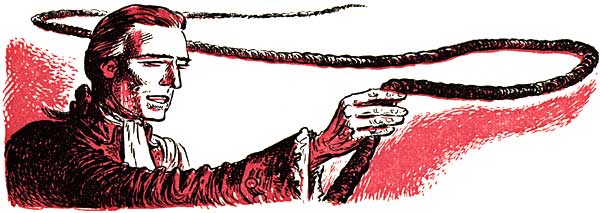
When the room was satisfactorily arranged, and candles had been lit, Chris returned to stand by the fireplace beside his master, who was turning the rope lightly in his fingers.
"Now Christopher, your attention please," said the magician, and his tone was crisp and authoritative. "Imagine that you are in need of a boat, and there is no boat."
With several twists of his hands the rope spun out into the middle air of the room. It moved and twisted like a live thing, and Mr. Wicker, Chris thought, seemed to be drawing the outline of a boat in the air with the moving line. Even as this thought flickered in his mind, the rope formed in mid-air the[88] skeleton of a dingy, and then, mysteriously, the rope added to itself until the bare struts and sides were filled in and there, rocking lightly from the speed of its creation, a small row-boat hovered in the air, as if it were tied up to a dock.
"Go and feel of it, Christopher," Mr. Wicker urged. "Climb in it if you like. I have left the two ends of the rope long enough to make oars, if necessary."
Chris ran over and felt the sides of the boat. It was sound and secure, no doubt of that. He went all around it, pounding its sides, and at last heaved himself over to fall into its center. The boat never stirred, and stamp as he would, the rope bottom and gunwales resisted firmly.
"Gee! Mr. Wicker!" Chris exclaimed. "This is the best yet—except for Amos. Golly Moses!" and as he sat down and took up the two loose ends of rope still remaining, he found that he held not rope ends but two oars. "Even oars!" Chris cried in delight.
Mr. Wicker stood with his hands behind his back, the firelight outlining his black clothes and neat dark head.
"Yes," he said, in a matter-of-fact voice, "Quite so. Now climb out and I will show you some of the other shapes of which it is capable. A ladder," Mr. Wicker remarked as Chris rejoined him, "is almost too simple. We can do that at any time."
Grasping the end of one oar, with movements too fast for Chris's eyes to follow, in an instant the boat was a rope again, coiled over Mr. Wicker's arm.
"Now!" said Mr. Wicker, and his eyes twinkled with mischief. The rope flew out again, but this time took a strange outline—the outline of an elephant.[89]
"It will have to be a small elephant," murmured Mr. Wicker, his hands flying, "because of the size of the room."
The elephant, like the boat, took shape, the final ends of the rope hanging down at its trunk and tail. After the elephant came a horse, an eagle, and a dolphin, and Chris's admiration and zest to learn the secrets of the rope grew with every change of shape.
"Very well," ended Mr. Wicker, "you shall learn." And placing his hands over Chris's while the boy held the rope, he began slowly to show him the magic twists and turns.

he time had come when Chris could go out beyond the confines of Mr. Wicker's gardens. It was a bright fall day when Amos and he stepped out the kitchen door. Becky Boozer's huge frame blocked it behind them as she stood in the sun to see them off. Each boy had been given meat and bread, some cakes and apples, for their midday meal, and Chris stood looking up and down the street for a moment before starting, savoring the promise of new sights and new adventure. The only drawback was that Amos would not, and must not, know why Chris might be surprised at certain places. Georgetown in the year 1790 might be new for Amos, but not nearly as new as it would be for Chris.
"Where-all are we going in the first place?" Amos asked.
Chris had long ago decided. "We'll take a look at the Mirabelle," he said.
While looking about him, Chris glanced more than once at Amos. The colored boy's brilliant foreign costume was very noticeable, his friend thought, but when no one paid any at[91]tention, Chris decided Amos's clothes were not unfamiliar to the seafaring men among whom they were walking.
A ship had just come in, the sailors browned and cheerful at being once more in their home port. Merchants in coats of fine but sober cloth were talking with the captain and mate, while they kept an eye on the cargo being laboriously unloaded by stevedores.
For some time Chris and Amos stood watching the men carrying out bales or kegs on their shoulders. When one part of the cargo had been assembled on the dock, an auction was held forthwith to sell it off at once to the highest bidder.
Listening and looking, Chris saw bolts of silk, hardware, china, wines and liquors, needles and pins—all manner of things auctioned and sold. The ship, American-owned, had come from England, and Chris overheard one man say to another: "See there, the thin man. That be Mr. Mason's agent. I heard he's here to buy the ballast bricks for his master's plantation on the island."
Chris, not understanding, asked, "Ballast bricks? Please sir, what's that?"
The men, astounded to be interrupted by a boy, and looking down to see two, each with an apple in his hands, turned around, and after a moment's scrutiny, answered.
"Ballast bricks? Why, anyone knows that these are the bricks brought over in the hold, my lad, should there not be sufficient cargo, both to make ballast for the vessel and to sell once here. English bricks are cheaper than those we can make ourselves. Did you not know, young man," he said, frowning with disapproval, "that our bricks for building houses have all come from British kilns?"[92]
"No sir, thank you sir," Chris said, and moved away, not in the least abashed.
How I should have loved to have told him I didn't belong in this age anyway, and that in my time, we do make our own bricks! he chuckled to himself.
Further on, a ship being painted a dazzling white caught their eyes.
"The Mirabelle!" Chris cried, running forward, and sure enough, black and gold letters along her bow pronounced that indeed it was the Mirabelle.
"I'd know those lines anywhere!" Chris said to Amos, and the two boys stood gazing at Mr. Wicker's ship.
The Mirabelle was a three-masted schooner of more than usually trim lines. Even at the dockside, the curve of her bow gave an instant vision of how the waves would curl back as she drove forward over the sea. At the waterline, a clear light green contrasted well with the white of her sides. Above decks, the size of the masts and neatly furled sails showed at a glance that the Mirabelle was hardy enough to weather many a storm, and also that her crew were able and well trained.
Looking about, Chris soon spied Ned Cilley, on deck lounging against the side of the ship and smoking his pipe. Master Cilley's eyes lit up as he saw his friends, and hurrying down the gangplank, shook them by the hand as warmly as if he had not seen them for a month, instead of just the night before when he had shared with them what Becky termed, "a taste, a mere spoonful" of supper.
"Eh well, lookee here!" he exclaimed, delighted. "Chris and Amos, by me soul!" Ned Cilley beamed on them and leaned back on his heels for a better view. "Lookin' about, lads? Eh,[93] that's the way. Is she not the finest ship that ever ye did rest your eyes on?"
The boys were agreeing enthusiastically when a remarkable couple came into sight, pacing the decks of the Mirabelle. Soon the watchers were given a better look, for the two men came down the gangplank to examine cases that had been brought to the dock for loading, and Chris and Amos were hard put to it not to laugh out loud at the comical pair.
The first man was so round and so short he appeared to have no legs at all. Below a tight round paunch, two small feet looking rather like mice, went in and out as he walked. The roundness of his face was underlined by three folds of chin, but his small piercing blue eyes had a way of suddenly opening wide that made Chris feel the man was no fool. He constantly burbled with laughter and was in a high good humor, occasional remarks from his companion causing him now and again to chuckle with amusement.
What the other man could be saying that was so entertaining Chris could not imagine, for he was the opposite of the fat good-humored one.
This second person was twice again as tall as the plump little fellow beside him, and was as dour and thin as the other was cheery and fat. He seemed in a state of perpetual depression, and no amount of chuckles on the part of the plump gentleman could cause even a passing smile over the long sad face of the dour man.
"Who in the world are they?" Chris asked of Cilley as they drew near. Cilley looked scandalized at Chris's impertinence in finding them in any way droll.
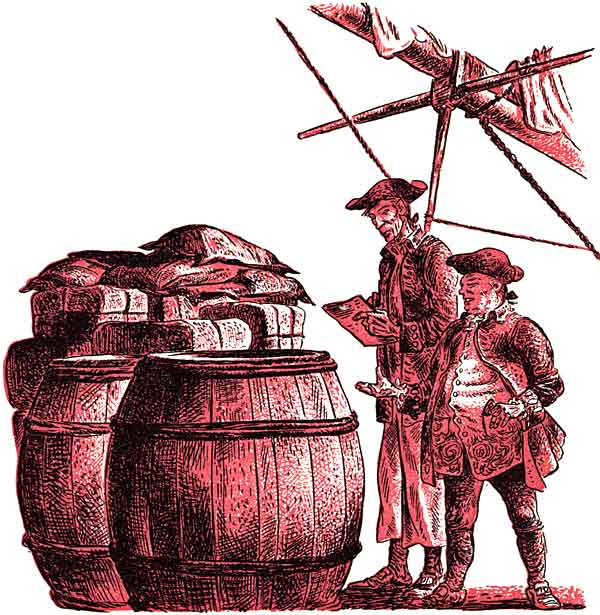
"Them? Why, bless me cap and buttons! That-there's the captain of the Mirabelle no less, and his first mate. Captain Ezekial Blizzard, he is, and Mr. Elisha Finney," Ned Cilley told them, watching the earnest conversation of the pair with evident affection.
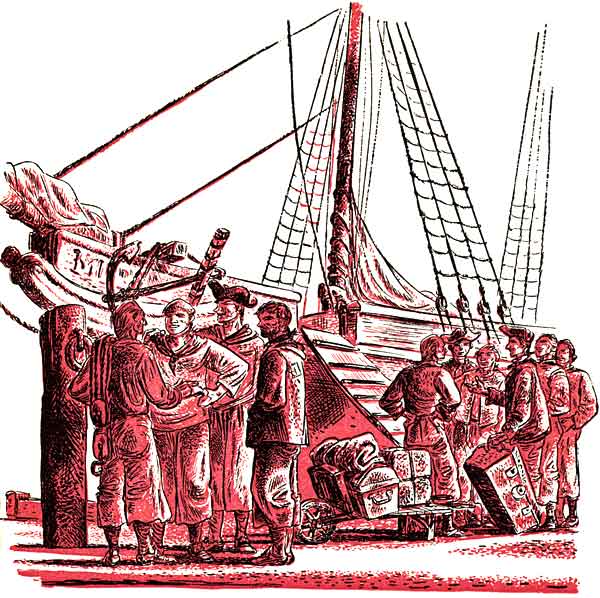
"Blizzard and Finney, that's them," he said. "And a better captain and first mate is not come by in the whole land, I shall warrant you. He may look too plump for his own good," Master Cilley went on, lowering his voice and bending down to be on a level with Chris and Amos, "but believe me, there's no sounder captain afloat. They all know it hereabouts, for Ezekial Blizzard knows the Chiny Seas better than the sight of his own feet, make no mistake about it. As to Elisha Finney, he's glum, I don't deny, but faithful! That's true of the two of them—whatever they can do for Mr. Wicker is law for[96] Ezekial Blizzard and Elisha Finney. They swear by Mr. Wicker, so they do," Ned said, wagging his head with the certainty of it. "Mr. Finney's kind, too," Ned went on, "though he don't look it, bless me cap and boots! He's tenderhearted as a bird, under that gloom, is Finney."
"Could we go on board the ship?" Chris asked, when the Captain and Mr. Finney had moved off to the far end of the wharf.
"No, me lad," Cilley answered gravely. "'Tis better not. Wait till the master do present you proper to the Captain, for the Mirabelle is Captain Blizzard's castle, like. I would sooner ye were asked aboard by him."
Then, seeing Chris's crestfallen face, Cilley clapped him so heartily on the back that the boy staggered forward a pace or two.
"Come now! Cheer up!" Ned cried. "Come meet some of the crew!" he invited, and taking Chris and Amos's arms, drew them towards a group of seamen.
Chris looked quickly around at the faces of the men, for these, he secretly knew, were to be his companions on a long sea journey soon to start. With a deep sense of relief he found that he liked them all. All, perhaps, but one. Then he gave his attention to Ned Cilley, who with a flourish was making the introductions.
"Me lads!" he cried, "Here are two likely young 'uns, living at the house of Mr. Wicker. Ye've heard me speak of them. Amos, here, on me right, and Chris, that's on me other side." He beamed at both and on the men confronting him. "Now boys," he roared, "this good man here is Bowie."
A short, muscular, bowlegged man with a friendly grin,[97] nodded his head at them and cut off a piece of black tobacco with his knife, stuffing it into his mouth, knife blade and all. Chris gave a shiver as the blade went in and came out and Bowie champed contentedly on his chew.
"This here's Elbert Jones," Cilley went on, "and that one's Abner Cloud, and that one," pointed Ned, "that one's Zachary Heigh."
Chris smiled and nodded, or shook hands, and Amos followed suit, but when they had reached Zachary, a tall young man of eighteen years or so, Zachary bent his handsome surly face and fumbled at his shoe. Chris stood there with his hand out, feeling the red blood surging angrily up his cheeks, and then he wondered who Zachary was looking at from the corner of his eye.
Chris turned his head and did not have to hear the name muttered by Cilley or by Bowie at his back. Chris found himself staring at Claggett Chew.

laggett Chew possessed a face and bearing not easily forgotten. A giant of a man, standing well over six feet three, he stood bareheaded in the morning sun. Contrary to the custom of the time, he wore no pigtail at his neck, nor even hair caught back, tied with a bow. Claggett Chew's head was shaved so close that the pale skin of his skull showed through the peppery stubble, making him seem bald. Below the bare skull, as if in counterbalance, his black eyebrows started out, tangled and thickly black, and under them, as out of a rocky cave, his small pale eyes blinked like cornered foxes in their dens. His nose, overlarge to start with, had at some time in his life been broken, and its crooked shape leaned to the right as if still bending beneath the blow that had battered it.
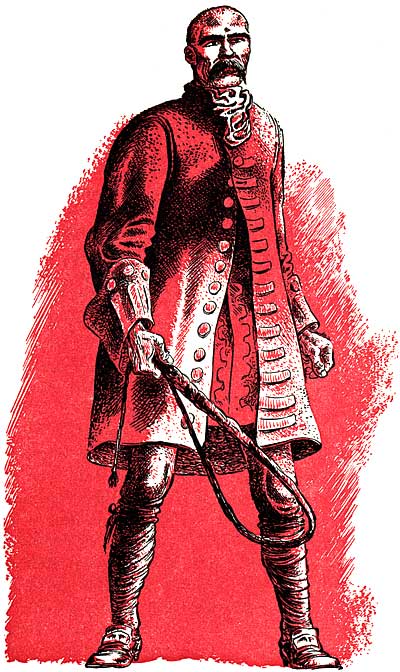
A long untrimmed mustache shadowed his mouth, and stray hairs caught inside his lips when he opened and closed them. His lips, like his eyes, were pale, and his skin sickly as that of a man who sees but little of the light. His cheeks and chin were [100]stubbly, like his head; his beard seemed more reluctant than half grown. His whole appearance, in his sallow yellow vest, gun-gray coat and breeches and canary-colored stockings, was one of mingled power and weakness; strength joined with an unhealthy habit of never being in the sun, and a cruelty best enjoyed when he knew that he could win.
His cold eyes pinned Chris with their gaze as if the boy were a butterfly transfixed by a pin. His thin, pallid lips curled with disdain and yet, Chris thought, uneasiness perhaps, as he eyed the two lads and the little knot of men. One strong, too white hand held a whip, its long leather tail ending like a scorpion's sting, in a length of wire. He held the five feet of the whip loosely caught in his hand against the plaited leather handle, and Chris had an icy sensation as he looked at it that it was never far from the large white hand of Claggett Chew.
A little behind Claggett Chew, examining the scene through a pair of jeweled lorgnettes, stood an even weirder figure.
"Osterbridge Hawsey," whispered Ned Cilley, as if to himself, as he followed the direction of Chris's eyes.
Osterbridge Hawsey, younger than Claggett Chew by twenty years to Claggett's forty, was dressed in the height of the French mode. Anything more out of place on the dirty swarming docks of Georgetown could scarcely have been imagined. His three-cornered hat was rakishly set at an angle on his fair hair, which was meticulously rolled in curls above his ears, and the curls were caught at his neck with a black velvet ribbon. Beside Claggett Chew's offensive bare skull, the hat, in its delicate blue velvet, silver braid, and airy rim of ostrich feathers, was ludicrous. Osterbridge Hawsey's costume was of a piece with the hat, for his coat was of fine blue velvet of too pale a[101] shade for any use outside a drawing room. It, too, was edged in silver braid, and its owner, holding a lorgnette with his right hand, with his left pushed back the velvet folds to display the delicacy of his flower-embroidered waistcoat. Satin knee breeches, a cascade of fine lace at his throat, and lace falling gracefully over his small well-kept hands made up the picture. As Chris looked at him, fascinated and repelled, he noticed that the young man wore a patch in the shape of a crescent moon, on his left cheek.
Chris, who had been not a little overawed at seeing Claggett Chew, could not restrain himself at the sight of this fop. The touch of fear he had felt, looking into the pale expressionless eyes of Mr. Wicker's enemy, found relief and release in an uncontrollable burst of laughter when from his pocket Osterbridge Hawsey drew a tiny bottle of smelling salts and held it delicately to his nose.
Chris's young laughter rose in peal after peal. Amos's warmer, quicker laugh joined in, and in a second, laughter had spread to the group of seamen who doubled up, convulsed, fell on one another's shoulders as they wiped their eyes, and slapped their hard thighs with their roughened hands.
The pair that so amused the rest, Claggett Chew and his fine friend, had stopped some ten feet away at the first sound of mirth. Then into Claggett Chew's gray-white face came astonishment, for he was used to creating many impressions—fear, hatred, or cringing obsequiousness—but never before had he or any of his friends been laughed at. Furthermore, he, the dreaded Claggett Chew, and his gaudy friend Osterbridge Hawsey, were held as being of so little account that a boy dared to laugh at them!
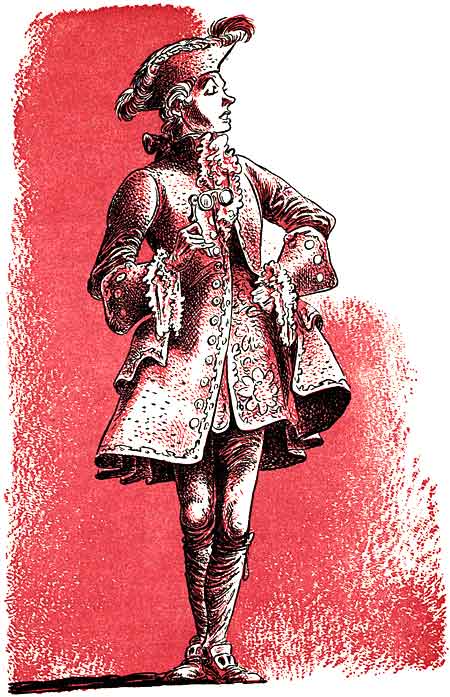
After a surge of deep ugly red to his head, Claggett Chew's face became whiter than before, and his eyes were murderous.
"Oh, Claggett, they seem to be laughing at me!" Osterbridge Hawsey whined in a high-pitched voice.
Unfortunately, at this moment Chris, forgetting caution in the grip of his laughter, held on to Amos shouting feebly: "He's got a patch on his cheek! What do you know—a beauty patch!"
The derision in his voice, in spite of his laughter, was unmistakable, but before he could so much as draw another breath, he heard Claggett Chew's voice for the first time.
"So—you ill-found ugly twirp! You idiot whippersnapper! Let me give you one to match!"
And quicker than the eye could follow, the whip flicked out, and with a cutting sting, lashed Chris's cheek. The cut, from the metal wire, was deep, almost to Chris's jawbone; but he did not feel the hurt as much as he realized—his laughter gone—that Claggett Chew was now his deadly enemy.
"Next time," came Claggett Chew's sneering voice, "I shall take an eye from you, my laughing boy, and see if that amuses us as well!"
And turning on his heel, followed by the sauntering, giggling fop, the pair picked their way along the wharf and disappeared.
It was only then, looking around at the sobered, silent sailors, Chris remembered that Zachary Heigh was the only one who had not laughed.

arely were Claggett Chew and Osterbridge Hawsey out of sight, when Chris simultaneously became aware of two things. One was the deep throbbing ache of the whip cut, so painful it made him feel sick and faint, and the second was the black figure of Mr. Wicker. Mr. Wicker was threading his way in and out of the crowds and litter of the wharves, and although to most he might have seemed leisurely, Chris was able to detect in the step of his master a certain haste. He came up to the little group of men, glanced at the back of Zachary Heigh, who was moving away as if to some interrupted duty, and at Chris's white face and the reddening handkerchief which he held to his chin. Mr. Wicker looked slowly at all the faces and then raised his eyebrows as if in surprise.
"Well, lads," he said, "what has happened here? You all look angry and somewhat a-frighted. What occurred, Ned?" he asked, addressing Ned Cilley, whose kind face was puckered with sympathy for Chris and who stood pulling at the stocking[105] cap he held in his hands. But Chris spoke up before Ned could reply.
"It was my fault, sir. I expect I got what I deserved, but it seemed to happen in spite of myself. I laughed at Osterbridge Hawsey's beauty patch—and at him—all of him, really. We all did. Claggett Chew got mad, and I guess I wouldn't blame him. It was a dreadful thing to do—to laugh at someone to their face—and he lashed out with his whip and gave me a beauty patch!"
In spite of the pain Chris managed a grin as he took the handkerchief from his chin to bare the deep, cruel cut.
"But truly sir," he ended, "I never saw anything like Osterbridge Hawsey before. He's a dilly!"
And before they knew it they had all, including even the habitually grave Mr. Wicker, burst into another shout of laughter. Mr. Wicker soon stopped, however, and reached back into the pocket in the flap of his coattails. When he drew out his hand it held a small glass box. With unhurried gestures Mr. Wicker's fine fingers took off the lid.
"What a fortunate coincidence that I happened by just at this time," he said casually, "and that I have with me such an excellent ointment." Master and pupil looked at one another for a moment, and there was the hint of a wink in Mr. Wicker's right eye, and the vestige of an answer from Chris's left.
"This will help to stop the bleeding, my boy," said Mr. Wicker, "and take away the pain. It hastens the cure," he went on, lightly applying the ointment to the wound. "In an hour you will scarcely know it happened," he concluded.
Seeing the color seep back into Chris's cheeks, the men touched their caps to Mr. Wicker and went back to their in[106]terrupted tasks. Ned Cilley, with his hand on Amos's shoulder, moved off to point out some detail of the Mirabelle, and Chris and Mr. Wicker were left alone. Mr. Wicker looked down kindly at the boy, but there was a sadness also in his face.
"Perhaps," he said as if to himself, "I have set you too great a task, my poor Christopher, for you are but a boy." He laid his hand on Chris's arm. "You are a boy, but what lies before you is a man's task, and no mistake. You cannot in the future allow yourself the luxury of such childish enjoyments as a laugh at Claggett Chew, or his friend!"
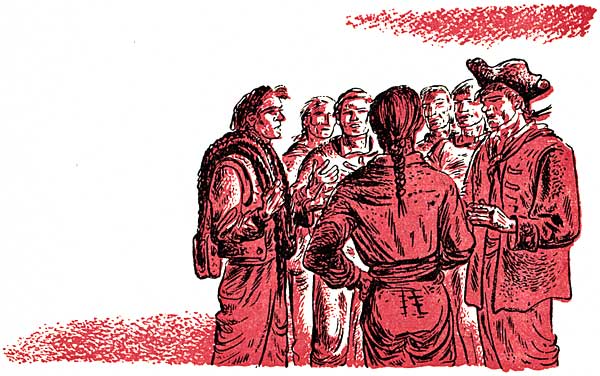
"I know that now sir," Chris replied solemnly. "I asked for trouble that time."
"Yes," agreed Mr. Wicker in a tired voice, "You did. Too bad," he added, and Chris saw fatigue for the first time in his master's face. "The laughter you could not resist has meant[107] that you came forcibly to Claggett Chew's notice in such a way that you will never be forgotten." Mr. Wicker looked from some distant horizon back to Chris. "I saw it happening while I was in my study, but could not warn you in time," he said. "So I came down with the ointment for your poisoned wound."
"Poisoned wound, sir?" Chris whispered, suddenly feeling much worse than he had before.
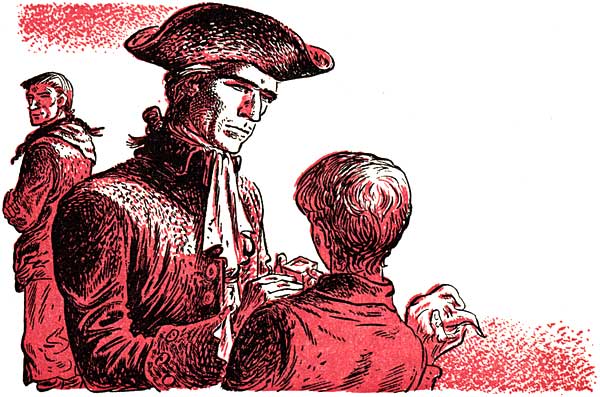
Mr. Wicker sighed. "Yes. Sometimes Mr. Chew has a way of wiping poison onto the metal tip of his whip. It is a slow poison—it does not take effect for days or weeks. In fact, so long after his lash that no one attributes the whip cut to the death that finally follows. Never fear," he said smiling his reassurance, "the ointment I have put on will take care of that too, and your cut will be closed and healed before the day is over. What is unfortunately more lasting," said Mr. Wicker, "is Mr. Chew's memory. Well"—and Mr. Wicker shrugged[108] his shoulders—"there's no help for what is done. Use caution in the future, Christopher. That is all I ask."
"I shall, sir!" Chris assured him. They turned to join Amos.
"Enjoy yourself the rest of the day, my boy," Mr. Wicker urged. "But be constantly on the alert and look in all directions. Here," he said putting his hand in his pocket, "take these few coins in case you should need them. Now find Amos, and be off with you!"
Although Chris would have liked to investigate all the wharves and see as many of the vessels as he could, he understood the warning given him by Mr. Wicker. So with Amos he moved away from the scenes he preferred, taking the first road he saw leading off Water Street.
M Street was, for Chris, completely unrecognizable. It was merely a broad unpaved road in what seemed, at best, a country town. Groves of old trees, pasture lands and orchards of large size surrounded the few houses. It was hard for Chris to realize that this was the core of the capital of the vast and teeming country into which he had been born.
With difficulty, for the streets all had different names if they existed at all, Chris looked for his own street. Going back along what he had known as M Street, not even the Pep Boys' or Iron Horse Grill was to be seen. Instead of two wide stone bridges, now there was only a rickety one crossing Rock Creek Park.
The boys walked to the bank above the park and looked down. The broad asphalt traffic lanes were gone, and so was the tidiness of the park lawns. Below him, Chris saw the tangled thick forests that had always stood there. The creek[109] itself, in the quiet of this earlier time, could be plainly heard running over its stones.
Chris turned and led Amos to where he half expected to see his mother's house. But where his house would stand in some future year, nothing was to be seen but a dense grove of trees growing along the top of a little rise of ground. Someone had once built a fire at the corner, where his front door would one day be. Chris kicked idly at the ashes and picked up a metal button blackened by the fire.
"What you-all looking for?" patient Amos asked.
"Just something I hoped I'd find," Chris answered, filled with a sense of desolation.
Then he made himself remember that his house had yet to be built, and aware of the hollowness of his stomach, he said to Amos: "Must be lunch time. Let's go down to the creek to eat."
They scrambled down the bank near where, in his time, there was a children's playground, and weaving in and out of the thick wood, found the creek, clear and fresh. Here they ate their lunch, and then, running and leaping, followed the turns of the stream until they neared the marshes and the river.

he two boys came out toward the mouth of Rock Creek and as the woods thinned, they saw ahead of them a sandy sloping bank on which a small boat was drawn up. Around the coals of a fire nearby, three men were crouching. Remembering Mr. Wicker's warning to be cautious, Chris put out a hand to touch Amos and the two stood still.
"Let's climb up a little above them," Chris suggested. "We're beyond the bridge—they might be—well, we'd better be careful. I want to see what they're doing before they see us."
Amos agreeing, the two boys, with extra care for rattling twigs, moved stealthily up the banks of the Potomac that rose with increasing steepness. The men, who were huddled near their fire now, came directly into their view below, and Chris and Amos could see that they were playing cards. One seemed to be losing to the other two. He had piled a heap of his small possessions in front of him on the sand, in lieu of money.[111]
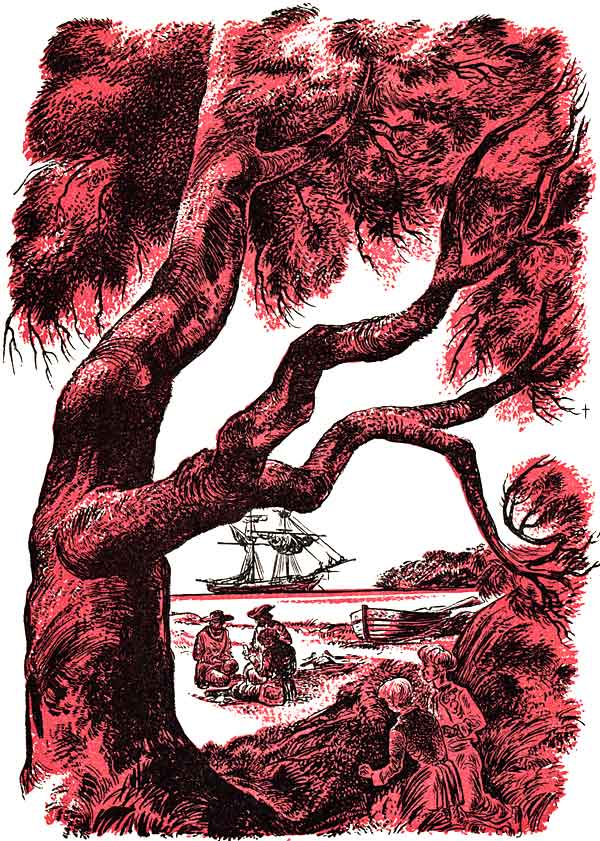
They were certainly a villainous-looking trio. The boys could hear some of their exclamations, and it was with a mingled feeling of curiosity and uneasiness that Chris recognized the losing gambler to be Simon Gosler, the humpbacked cripple.
"Come now, Gosler!" they heard one of the men cry out in annoyance, "Pay up—you've lost!"
"I've no money to pay you," complained the sly voice of the cripple. "I'm a poor man—well you know it. A cripple—just a poor old cripple!"
"Ah—none o' that!" cut in the second winner. "We know how well you do at your begging—more in a day than we get in a month's pay. Pay up now, or it won't go well with you," he rasped out, laying his hand on a dagger stuck into his belt.
"What about your glass, your spyglass, Gosler?" urged the first man. "Put that up and it will cover your losses well enough!" he sneered, but Simon Gosler hugged his coat to him and looked from side to side searching for a way of escape.
"No, no, good fellows," he moaned, "not my glass. I won that from the Captain himself three years ago, and that I never shall part from willingly."
"You'd part from it for silver quick enough!" snarled the first gambler, "and of that you must have plenty, for 'tis rare you ever lose. Come now, we'll give you a few minutes more to make up your mind, but make it up you must. Either the glass or silver, you may choose."
The two gamblers rose menacingly and moved away to put their boat into the stream. Simon Gosler was left mumbling and sniveling and fingering his coat pocket, in which he kept his glass. Chris, watching him, had a sudden inspiration and whispered to Amos. "Hide here behind those bushes and don't[113] follow me. Don't move or show yourself. I'm going to have that glass."
So saying he moved carefully back until he was out of sight of Amos, and then, for the first time on his own, he tried a change of shape. Choosing a broad flat stone at the edge of the shrubbery and safely removed from the sight of the two winners, he changed himself into a silver coin and allowed himself to drop with a sweet metallic ring on the stone, waiting winking in the sun for Simon Gosler. The old cripple saw the coin before it had bounced twice on the stone, and with a quick sly look over his shoulder at the backs of his companions as they pushed at the boat, hoisted himself up on his crutch and began hobbling over toward his find.
But instead of a coin, he found only a resolute boy awaiting him, tossing and catching a silver piece. It was one of those Mr. Wicker had given Chris but an hour before. He looked Simon Gosler in the eye.
"I've heard what went on, Simon Gosler," said Chris, his eyes on a level with the rheumy watering eyes of the cripple, "and if you will sell your spyglass to me, I'll buy it off you with this silver piece. Otherwise you shall not have it."
Simon Gosler's eyes dripped tears of greed at the sight of the coin, and then another expression washed over them. Fast as he was and fast as was his movement, Chris was faster. As the old beggar braced himself and brought the head of his crutch down where Chris's head should have been, someone from behind dealt him a staggering blow with a sizable club, and yet when he turned around no one was there. When he faced about again, rubbing his head and whimpering with rage and frustration, he found himself once more facing the boy who[114] was tossing and catching, tossing and catching, the round silver coin.
Chris stood with his legs apart, his head back, his eyes full of scorn. His hand did not cease to toss and catch the silver piece. "Well, you old villain," he challenged, "will you take the coin in fair exchange, or shall I hit you again with that club you just felt?" he asked. "It doesn't feel the same when you get it back as when you give it out, does it, you old faker? Hurry up—your friends will soon be coming back, and I don't think they intend to argue," he added.
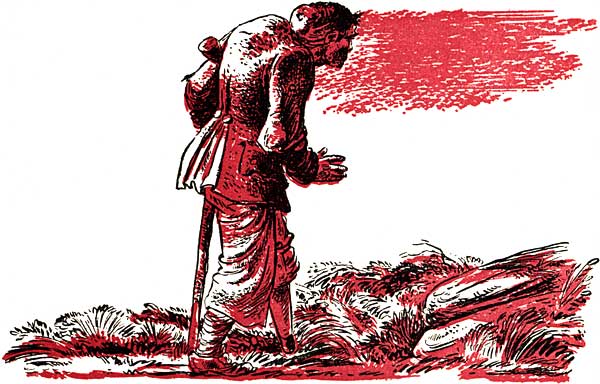
Gosler, still rubbing his head and muttering, finally spoke. "Very well, you nasty young man, I'll sell my glass. Give me the coin!" and he stretched out a dirty claw.
"Oh no!" Chris shook his head decisively. "No indeed! You put the glass down between us—carefully, mind you—and[115] back away. I'll throw you the coin when I've seen if the glass is worth the silver!"
Mumbling to himself, Simon Gosler did as he was told. He reached back in his coat pocket to draw out a small spyglass, which he laid down on the ground. He then backed away. Chris picked up and examined the glass, tested it, and then just as the two gamblers came back up the riverbank, tossed the silver piece to the beggar. Gosler caught it in mid-air with the dexterity of years of practice. In an instant Chris had vanished into the thick shade of the wood, and going as fast but as quietly as he could, regained the place where Amos waited for him.
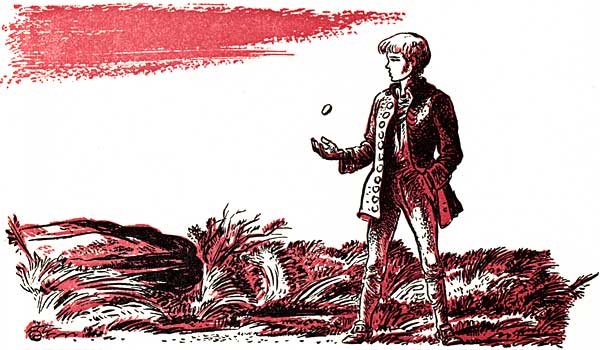
"Gee, Chris!" Amos exclaimed, for he had caught all Chris's expression of speech, "We got us a spyglass!"
"We sure have!" Chris agreed, "And it's a fine one—best I[116] ever saw," he said. "Here, try it out over the river there, where that ship is anchored."
Amos pointed the glass through the shrubs toward a distant ship that swung at anchor close to the shore, and while he tried out their prize, Chris watched the departure of the three gamblers. Gosler had evidently paid up while Chris was returning to their hidden perch, for he was now hustled into the boat by the other two. Soon the three were far down the stream and their boat was moving into the main flow of the river.
"Here," Amos said passing back the glass, "you look. That's a mighty fine ship out there, black as the Mirabelle is white, but she looks fast and strong just the same."
But Chris, taking the glass, was idly following the progress of the three men. Gosler, lost in gloom, sat in the stern hugging his rags about him. The other two bent their backs to the oars and headed straight for the anchored ship.
Turning the glass to the brig Chris hunted for the name as the prow swung about. Through the glass the letters, gold on the black-painted side, leapt at his eye across the distance. Venture, Chris read, and with a beating heart he saw his adversary's ship for the first time.

ome along, Amos! We must get a closer look at that ship!" Chris cried, putting his glass away. Scrambling down, the two boys ran along the stream until it was shallow enough to cross. The water was icy, telling, as well as the turning leaves and cooler air, that fall had come and winter was on the way.
Hurrying forward, Chris and Amos reached the mouth of the stream where it joined the river. There on the left bank of Rock Creek, high rushes grew in rank profusion on the marshy land. They rose higher than the heads of the two boys and were too closely packed to allow for easy passage.
"We'll have to skirt the very edge," Chris said glancing about. "Barefoot would be the best. This soft ground would soon go over our shoes and maybe suck them down."
"Keep right against the rushes," Chris warned Amos, "and if a boat shows up coming from the wharves, we can't take any chances. We'll have to dive into the rushes and hide, just in case it's Claggett Chew."[118]
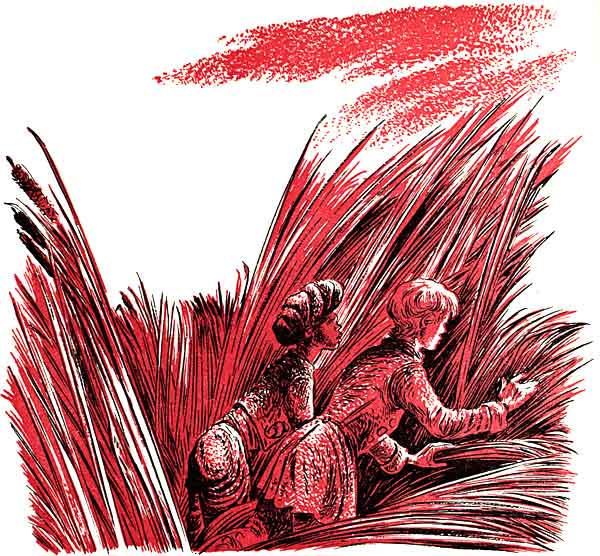
"That's right," Amos nodded his head vigorously. "I don't want to meet him again, and you do less'n me!" he chuckled.
The two went on, making slow progress, for the river was deep at that point, with little foothold between the end of the jungle of reeds and deep water.
"Keep an eye out, Amos!" Chris called back over his shoulder as he went ahead. It was no time before Amos's voice came huskily up to his friend.
"Chris! Chris—hold on! There's a boat with four men in[119] it just left the last wharf, and they're headin' this way! Get in those rushes quick—my clothes is mighty bright!"
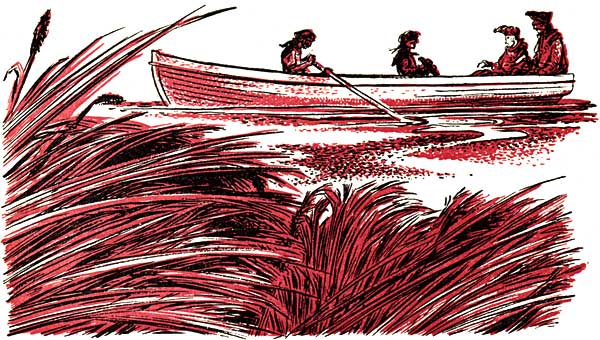
Rushing and panting, they shoved their way into the dusty rushes, groping back until they could barely see the river through the stalks. And it was just in time, for barely were they hidden when they heard, carried over the water, the dip and splash of two pairs of oars and the creak of oarlocks. Then, in another moment, came the high-pitched voice of Osterbridge Hawsey. Chris gave a shiver as it reached him.[120]
"Claggett," came the voice of the fop, who with Claggett Chew was sitting in the stern of the boat, "Claggett—I find myself quite, quite fatigued. A little wine, I fancy, might revive me when we reach the ship. Heated, I think, and spiced, to ward off the night chill. And Claggett," went on the voice, almost upon them now it was so clear, "what do you think of this muslin for my new shirts? Is it not delicate? Irish, cela va sans dire, as the dear French say. I feel sure it will be satisfactory."
From Claggett Chew the two boys heard not a word, and peering out, they saw the boat shoot by. Osterbridge Hawsey, wrapped in a great cloak, was admiring a bolt of muslin that he held, but Claggett Chew, his face shadowed by a hat, was holding his whip upon his knees and glowering at the water.
The boat passed, and some time after, the two boys heard from across the water the echo of wood against wood as the dinghy reached the Venture's hull. After a while, as the boys were about to move along, a heavy dropping sound, and the shuddering of the marshy ground, made the two in hiding look at one another in concern.
"What in the world?" Chris murmured.
The sound, accompanied by steps, oaths, and a rhythmical drop and shudder, continued farther along the shore. Stealthily, trying not to shake the rushes and so show where they might be, Chris and Amos pushed through the marsh.
The sun was setting as they came near the steps and voices. Pushing through the reeds towards the river, Chris found that they were nearly opposite where the Venture floated, below Mr. Mason's island, and at a desolate part of the river.
Chris gestured Amos forward, and they went on step by step until, in a pause of the thundering dropping sound, they[121] knew themselves to be near its origin and parted the reeds enough to see.
There, within a few yards of them and at the edge of a hard-beaten track from the main shore, lay a mass of cannon balls and shot for guns of various sizes, such as are used on men-of-war. The crew of the Venture, able to carry but one at a time, kept a line going from shore to pile, and this, as they dropped the cannon balls from their shoulders, was the sound and shaking of the ground the boys had heard and felt. Seeing the red caps and kerchiefed heads of men above the rushes, the boys let the reeds fall back.
"I'm going to have a look at the ship through the glass," Chris whispered, and moved forward closer to the shore.
Parting the stalks, he trained the glass on Claggett Chew's ship. It was a fine, rich vessel, that was evident, and swarming with activity. At this hour of dusk, other boats along the river had stopped their commerce for the day and there were none to observe what Claggett Chew might be about. Chris and Amos were the only watchers.
The cannon balls and ammunition were taken out in boats and hoisted up in nets. Chris observed everything closely, and saw still other crewmen disappearing with their burdens down the hold. Then something caught his eye and he examined the name along the side through the spyglass.
Curious, thought Chris, that all the letters of the ship's name seemed exact except the second and third. Among the other letters of carved and gilded wood, the E and N were not quite as straight in line as the rest.
Oh well, Chris thought, it's doubtless a custom of the time for all I know.
Putting the glass in his pocket, he rejoined Amos, but as he[122] did so the last two sailors put down their cannon balls and wiped the sweat off their foreheads with their arms. In the ensuing silence the rustle of the rushes as Chris and Amos moved away was plainly to be heard.
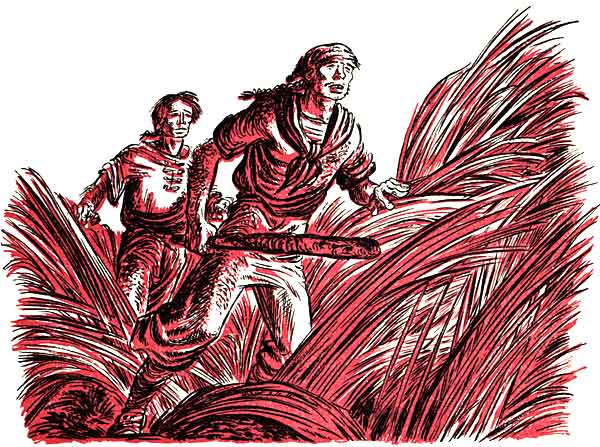
"What's that?" one man cried out. "Is a spy there? Here—take this club and beat about—we'll catch 'em!"
The two men charged into the marsh so fast that Chris barely had time to whisper to Amos: "Hurry Amos—run! I'll be all right. I'll draw them off! I'll meet you where we ford the stream!"
Amos safely out of sight, the men came only on a stray dog foraging for rats, wagging its tail and letting out a yip or two as it followed a scent along the ground.[123]
"Give it a kick—there—it's only a stray dog," one said.
"Oh—devil take it—what do I care?" answered the other, turning back.
The dog lay panting at the river's edge. Looking past the ship as it rested, it saw what it thought was snow upon the water and the banks. But it was just thousands of ducks migrating south, and when they rose to move farther away, the sky was overcast and thunderous with their wings.
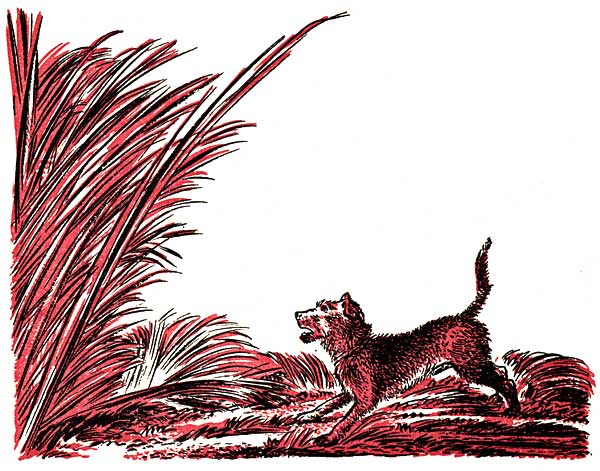
Long after dark, cold, dirty, and quite wet, the two boys reached the house on Water Street.
"Where did you go?" Becky inquired, frowning with solicitude at the bedraggled pair.
"Oh, no place much," Chris answered, yawning.

he following morning while Chris was telling Mr. Wicker of the ammunition being loaded on the Venture, Becky Boozer announced a visit from Captain Blizzard and Elisha Finney.
"Show them in, Becky," Mr. Wicker told her. To Chris he said, "I wonder what brings them here so early? It must be a matter of some importance. Stay with me, Christopher. I shall present you to the Captain."
The extraordinary pair came in and Chris was introduced to Captain Blizzard and Mr. Finney. The Captain was all smiles except for his eyes; Chris noted that his eyes did not smile at all. Mr. Finney, true to form, cast down his eyes, sighed, and let the corners of his wide thin lips droop almost to his chin.
When a chair large enough and solid enough had been found for Captain Blizzard, and Becky had brought in a decanter of sherry and glasses to set before the visitors, Chris shut the study door and sat down on the floor where he could observe the three faces before him.
Mr. Wicker spoke first.[125]
"Well, Captain, what brings you here so betimes? No trouble of any kind, I trust?"
Captain Blizzard set down his glass of sherry and cleared his throat. "Now, sir, needs must I come with unpleasant news, and sorry I am to bring it. I have heard that the Venture plans to sail at any time, and you well know she is a fast-sailing ship." He folded his plump hands over his paunch and twiddled his thumbs with agitation. "Sir, it has been noised about that the Venture is headed for the West Indies."
He paused and glanced at Mr. Finney who nodded forlornly, his mouth drooping.
"But 'tis not so." The Captain looked with anxious eyes at Mr. Wicker. "Early this morning Ned Cilley brought me the information that the Venture is to sail to the China seas."
Mr. Wicker's face was grave but showed no surprise. "I knew some trouble was ahead," he said slowly, "but did not know what form it was to take." He paused. "News of sailings and destinations get about so rapidly, it is more than likely that someone overheard the destination of the Mirabelle, and sold his knowledge to Captain Chew. Although," he added thoughtfully, "I think Claggett Chew guessed it. Well," and Mr. Wicker looked alertly at the two men, "what advice do you give me?"
Captain Blizzard wagged his head. "Nay sir, 'tis for orders that I came to you. It is for you to say."
"How soon can the Mirabelle put to sea?" Mr. Wicker asked, and Chris's heart skipped a beat.
"At any time, sir," the Captain at once replied. "We have nearly water enough, and quite sufficient stores. The men are all assembled."[126]
The Captain fell silent and no one spoke for several minutes. Mr. Wicker leaning his chin on his folded hands was lost in thought.
"How move the tides?" he finally asked, raising his head.
The Captain, with surprising briskness for so large a man, pulled some folded charts from his pocket. Without a word the three men rose and went over to the table, pushing aside the china bowl filled with flowers to spread the charts flat on the table top. Captain Blizzard leaned his knuckles on the boards.
"The tide will be high at midnight, sir," he informed them. "See"—he pointed a short forefinger at a spot on one chart—"here is the sandbar that the tide covers for but a short time, and should there be other ships crowding the river near this point, we must slip through there then or not at all."
Mr. Wicker examined the charts and nodded. "Very well," he said, "so must it be," and Chris felt that his heartbeat would stifle him, it pounded so fast and thickly in his throat. All at once, looking up at the thoughtful face of his master, Chris longed to be able to stay safe at home. The imminent journey, so far and perhaps so perilous, seemed suddenly too much for him. Mr. Wicker had taken the river charts and rolled them up, and now turned to the Captain and first mate.
"Captain Blizzard, and you, Mr. Finney," he said, "should water casks be seen going on board, the whole of Georgetown will know you mean to sail. I therefore ask you to so contrive it that the casks be hidden in bales or boxes so that they seem to be anything but what they are." He tapped the rolled charts thoughtfully on the palm of one hand. "Our only chance to steal a march on the Venture will be to sail at least a day before her." The two men listening nodded in agreement. "There is[127] one other thing. Your orders for where you are to anchor, once near China, will be secret, and carried on the person of this boy." He laid one hand on Chris's shoulder. "He has a task of utmost secrecy to carry out and will require your help, encouragement, and silence."
Captain Blizzard and Mr. Finney looked solemnly at Chris who looked as solemnly back.
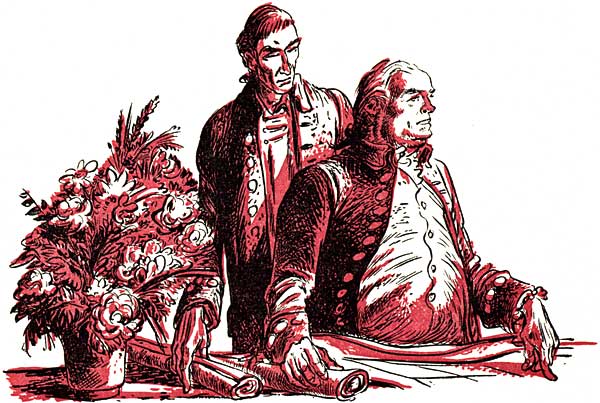
"Not only that," Mr. Wicker went on, "but his presence on the ship must not be known until the Mirabelle is well to sea." He glanced down meditatively at Chris. "I shall arrange to bring him aboard somehow, and give you your sailing orders later."
He strode over to the window looking out to his gardens and the trees where the apples showed their russet cheeks.
"Leave me these charts for yet a little while, and I shall ponder on our plans," said Mr. Wicker. He turned. "See that[128] the water casks are taken on at once, Captain, and hidden, and make a place for Christopher, here," and at a beseeching look from Chris he added with a smile, "and Amos."
No sooner were the Captain and Mr. Finney gone than Chris spoke up in great excitement. "Mr. Wicker, sir, I have a plan! May we look at the river charts again?"
Master and pupil spread out the charts once more, and Chris pointed eagerly.
"Look, sir! Here is the sandbar, and here"—he put his finger down—"the Venture. Or she was, yesterday. Now sir, the sandbar being just below and ahead of the Venture, once the Mirabelle has slipped by, wouldn't it be too bad if something happened to make the Venture drift with the tide and run aground?"
He looked eagerly up into Mr. Wicker's face and saw in it the reflection of his own excitement.
"There are times, Christopher," said Mr. Wicker with his eyes snapping, "when you surprise even me. But how is it to be done?"
"Well, sir," began Chris, "it's a little tricky but I think, what with the things we know, it can be worked."
He began outlining to his master the details of his plan.

t was perhaps as well that Chris had more than enough to think of. Otherwise the wrench at leaving home might have been even more distressing than it was. His last day passed like a flash, though from his attitude no one, certainly not Becky, would have guessed that the next morning he would not be there to eat his breakfast in the sunny kitchen window. Amos, quick to sense all Chris's moods, knew something was afoot, and when Chris and Mr. Wicker finally told him of the sailing plan, Amos's eyes grew rounder than ever and sparkled more brightly, but he said never a word.
At ten o'clock that night, when Becky had gone heavily to her room, wondering perhaps why Chris had given her so hard a hug, Ned Cilley knocked at the back door. He had brought a light cart on which there stood a large wicker hamper. Ned and Chris lifted it into the kitchen while Mr. Wicker drew the curtains and then held a candle high. The candlelight flickered and flapped like a trapped bird at the corners of the room, and sharp bird-wing shadows cut across Mr. Wicker's tall dark[130] figure. Yet to Chris, who was to hold the scene ever after in his memory, the kitchen by the light of that one candle, and the figure of his master standing in its center, moved Chris as he had never been touched before. Amos stood near the basket, looking first into its square depth filled with shadow, and then up enquiringly at Mr. Wicker, but he did not speak.
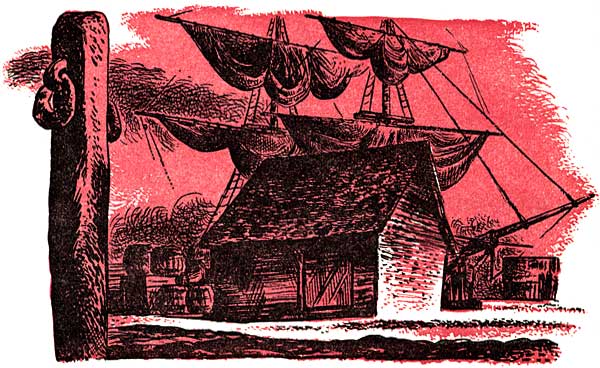
"Be of good heart, Amos," Mr. Wicker said to him kindly, "and look after young Christopher as best you can."
Then, at a gesture from Mr. Wicker, Amos, agog, stepped into the hamper where he stood uncertainly, his expression half terrified and half delighted.
"Yessir, I will!" he piped up, shrill with excitement. "I'll keep my eye on him!" he promised, and then curled up in the hamper. Ned Cilley shut down the top and he and Chris lifted it to the cart. Mr. Wicker spoke low into Ned's ear.[131]
"All is well understood?" he queried. "This is no time for misunderstandings!"
"Aye aye, sir! All is clear!" the good Ned replied.
"Then Godspeed to you all and bring you safely home," said Mr. Wicker. "Be on the lookout for this lad, Ned, when you get past the bar."
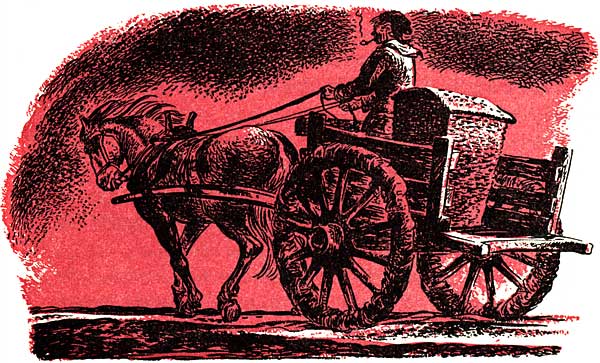
"We shall," Ned whispered back, "and good luck to the two of ye!"
Clucking to his horse, on wheels covered with rags, and with cloths about the horse's hoofs to deaden their sound, Ned Cilley and his hamper went quietly away in the direction of the wharfs. In a moment, cart, horse, and driver were swallowed up in the denseness of the night.
A black night it was indeed. Although there was a moon, thick clouds scudded over it and an autumn wind bent the[132] trees, tearing the leaves from them. A mist rose from the river, but it was blown away from all but the most sheltered places.
Mr. Wicker and Chris stood in the silent kitchen. Looking about him, Chris remembered with a pang the first morning he had seen it, with Becky in her gaudy hat standing near the fire.
"Come, Christopher," Mr. Wicker bade him, taking up his caped black cloak and another one for Chris. "First, wind the rope about your waist, and once on board, bind it under your shirt. Let no one, not even Amos, know of it."
Chris did as he was told. Mr. Wicker then gave him a leather pouch hung on a cord.
"Here are some oddments of magic that may prove their usefulness," he remarked. "Wear them about your neck." So saying he slipped the leather cord over Chris's head.
"What happens to the rope and pouch when I change my shape, sir?" Chris asked.
"They will remain with you, have no fear of that," the magician replied. "What would be the use of magic if it proved unable to adjust itself?" A smile played over Mr. Wicker's face. "So, all is ready," he said glancing around. "Now we must be off and lose no time, for we have much ahead of us," said Mr. Wicker drily, blowing out the candle.
Before he knew it, Chris stood—until what far-off time?—outside Mr. Wicker's house. His master locked the door. The wind, swooping down like some great bird, tugged at their cloaks and chilled their faces.
Chris led the way to the creek and the marsh. This time both he and Mr. Wicker wore high boots which kept the icy water and mud from their feet.[133]
"What I wouldn't give for a flashlight!" Chris muttered as they came to the marsh.
"Yes, the twentieth century has many conveniences," Mr. Wicker replied, and Chris could imagine, behind him, the man's sardonic smile and amused eyes.
They came out suddenly from the blackness of the woods to the wind-whipped river, and though the moon was still obscured, the river held a pallid sheen of its own that gave a little light. There was not a sound to be heard but the hurried lap of water against the shore, the suck and pull of Chris's and Mr. Wicker's boots in the mud, and sharp, hair-raising rustles, from time to time, in the reeds. Chris's heart thudded in his throat at these furtive noises, for they could only be made by rats or watersnakes, and Chris liked neither of these, especially by night.
Pushing along the marsh edge and feeling their way, the two figures at last came in sight of their goal. The high dark hull of the Venture rose above the water, an amber lantern hanging at her stern. The wind swung the ship, and the tide, still flowing up the Potomac, showed that the bow, held by the anchor, was pointed somewhat downstream.
"The anchor may have dragged," Chris whispered to Mr. Wicker. "Now for our boat!"
The rope seemed to uncoil from about his waist almost of itself, and with the gestures he had been taught, Chris formed a very adequate craft; a trifle lopsided, it must be admitted, as he had had small practice, but seaworthy nevertheless.
"I shall see that the men sleep soundly," Mr. Wicker murmured. "You do the rest."
"I shall, sir!" Chris agreed, and then the moon showed an[134] edge for a moment in the clouds. "Look sir—the Mirabelle!"
Toward sleeping Georgetown, for it was nearly midnight now, a whiteness showed itself, close against the distant wharfs. The Mirabelle was edging out, and Chris knew that Ned, Bowie, Abner Cloud, and others were pulling her by the ship's boats into the main flow of the river. Once turned, she would float noiselessly down the Potomac past the Venture, and once he was aboard, would hoist her sails and set her course to sea.
"Then quick!" bade Mr. Wicker. "We took too long! It seems we are a trifle late!"

They stepped into the boat, each taking an oar, and with only a few strong pulls came alongside the silent Venture. They moored their boat to the anchor rope. Mr. Wicker touched Chris by way of wishing him luck, and disappeared. For half a second more Chris waited. No sound came from the ship but a light showed in the Captain's cabin.
In a twinkling, a monkey with a pouch about its neck ran up the anchor rope and pausing on the gunwale, sniffed at the pungent flower smell that it now knew meant sleep for all the sailors. Then it bounded toward the light.
A window of the cabin on the lee side had been left open. Clinging to a piece of rigging before it sprang to the sill, the[135] monkey's eyes caught what seemed to be a shadow darker than that of the mist or of the night, moving away from the sailor left at night watch. The man now lay slumped in sleep, and the same heady scent of spices and flowers that had overcome Chris when he had first entered Mr. Wicker's shop blew away on the gusty fall wind.
The ship tugged and strained at her anchor, wind and turning tide making taut the line that held her close to shore. The Venture, her rigging and masts scarcely visible, so sombre was the night, lay ominously silent, excepting for a murmur of voices from the cabin. Abruptly aware of the passing of time and the approaching white cloud on the water that was the Mirabelle, the monkey sprang to the side of the open window and peered inside.

A smoking lamp hung low over a center table, dropping a dusky round glow on the larger circle beneath it. Claggett Chew was blearily studying a paper spread out before him, leaning his ugly bare skull on one hand. His eyes were blood-shot, and an empty wine bottle and glass holding only wine dregs showed he had been drinking and was now half asleep.
Osterbridge Hawsey, in a heavy silk robe and embroidered slippers, lounged sideways in a chair with his legs hanging over[136] the arm. His hand trailed an empty glass on the floor, and a silly drunken smile played over his face.
"Claggett," he was saying, "is the place marked?" He hiccuped delicately. "Hup! Oh dear! the hiccups!" he complained with a frown. "Let me have more wine!"
Claggett Chew did not reply nor rise to fetch another bottle. Osterbridge Hawsey gave a hiccup and spoke again, "Mark it—hic!—Claggett. You may forget. All those—hup!—walls, to get over, or—hic! under." He sighed. "Oh dear! Hic! Think of those jewels, Claggett! Hup! Devil take these hiccups!" he exclaimed in a flurry of annoyance, but made no motion to change his comfortable position.
"Claggett!" Osterbridge Hawsey shrilled. "Are you asleep, or angry, or—? Hic!—Put a cross where the Tree is, I say! I want those—hup!—jewels, Claggett, and so do you! Hic!"
Befuddled, his perceptions hopelessly blurred by excessive wine, Claggett Chew made a mark on the map. "There!" he growled, his upper lip drawn back over his teeth, "will that shut you up?"
A moving shadow duskier than the shadows themselves came through the door and hovered over Osterbridge Hawsey. Claggett Chew suddenly started up.
"I smell him!" he muttered thickly. "He's here! Hullo! Night watchman!" he shouted drunkenly.
As he got up, stumbling and thrashing about in the uncertainty of his movements, his chair crashed to the floor and the monkey made a leap, cuffing the lantern from its hook. The light was dashed out, and in the dark as he jumped, the monkey seized the creased, well-thumbed paper as he leaped back toward the pale square that was the window. Behind it Clag[137]gett Chew's oaths and exclamations became fainter as the spicy scent grew stronger, and at last his mutterings trailed off into snorts and, finally, snores. The monkey, clutching the paper to itself, sat on the window ledge stuffing it into the pouch about its neck, and a monkey smile flitted across its face as it heard a final dreaming sound from Osterbridge Hawsey.
"Hm-mm. Hic! Jewels! Hup!" came from Osterbridge Hawsey.
Down the anchor rope scrambled the monkey with the agility and speed for which monkeys are famous. Mr. Wicker was already in the boat.
"How shall it be, sir?" came the low voice of Chris. "Shall I become a beaver and go down and gnaw the rope off at the anchor?"
"No," said Mr. Wicker. "It can be more easily done than that and nothing to trace it. Get in the boat. Here comes the Mirabelle."
Taking his own shape once more, Chris saw the white ghost-like sides of the Mirabelle soundlessly passing down stream. Not a creak nor a splash of water came from her as she passed, but from the stern a tiny light, struck by a flint perhaps, blinked once, and twice, and then a third time.
"Now!" came Mr. Wicker's low voice. "Let me have my hand upon that rope!"
He only seemed to hold the anchor rope a moment and give it an easy pull. The tugging strain was suddenly gone and the Venture veered away like a frightened waterfowl.
"Will she go where she should, sir?" Chris wanted to know, leaning forward.
"That she will, Christopher!" came the familiar voice in[138] the dark. "And we must get out of her way, for here she comes down at us. The wind and the tide and—hm-m—other forces will drive her solidly upon the bar. If I mistake not, it will be several days before they get her off," and on the night air Chris heard a faint short chuckle.
"Pull, boy!" his master told him sharply. "Here she comes!"
Chris grasped his oar and spun the boat only in time, for the down-flowing tide and rising wind combined to drive the Venture forward at increasing speed. The tide being still high, the ship was carried well upon the sandbar before it grounded, lolling over to one side much like the sleeping sailors.
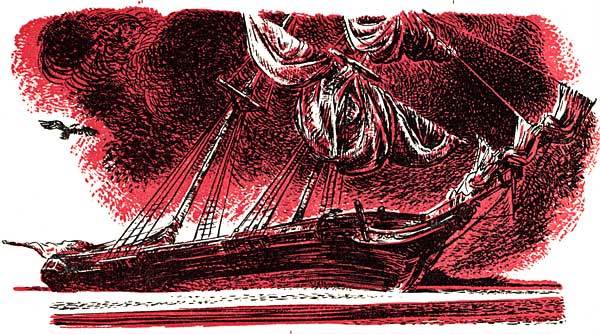
"Quick, lad! Now we must catch the Mirabelle, and you and I must part."
"Oh, sir!" Chris cried, holding his oar above the water and turning his head toward the man beside him. Mr. Wicker clapped Chris on the shoulder and a glint of moonlight showed him to be smiling.[139]
"I shall miss you too, my lad," he said. "Now, let us send this boat over the river as fast as she can go. And bear in mind—keep your own shape at all times unless you can change it out of sight of prying eyes." They pulled at the oars. "Oh yes, I nearly forgot. Among the effects placed in your sea chest you will find a conch shell. Hold it to your ear, Christopher, as children do to hear the sea. You will be able to hear my voice, if ever you should need to."
"Oh—like a walkie-talkie?" Chris asked, pulling at his oar.
"Somewhat." And Chris knew his master smiled at him.
"What about getting you to shore, sir?" Chris enquired, pulling in rhythm so that the rope boat flew down the black and silver river.
"Have you forgotten who I am, my boy?" he was asked in return.
"No sir," said Chris, feeling a little small.
"Then undo the dinghy and clamber up the side, for here we are," said Mr. Wicker, and the towering hull of the Mirabelle rose above them.
Chris grasped a rope ladder that hung down beside them to the water's edge and turned for a last word.
"I'll do my best, sir, but I hope you'll stay with me!" he cried.
"All that I can, Christopher," came the distant voice. "Godspeed!"
And looking about, Chris made out, coasting on the air, a sea gull, balancing upon its black-tipped wings. Swallowing a lump in his throat that proved bothersome, Chris jerked at one oar and deftly coiled the magic rope over his arm, holding to the ship's ladder with the other.[140]
A signal flashed, a lantern swung in an arc, and dim figures waiting in their places hauled on the lines. As Chris stepped to the deck over the side, the great white sails rose, spread, and bellied out from the three masts. Chris looked in wonder as the Mirabelle, proud as a woman, lifted up her head.
Soon on the silent river only a dwindling sight of lonely sails was to be seen, heading toward Chesapeake Bay and then to sea. But anyone with eyesight good enough might have seen a solitary sea gull, following.

he long days passed on board the Mirabelle. The hours rolled majestically past as did the waves through which the Mirabelle cut her way.
Amos and Christopher were kept out of sight until Mr. Wicker's ship was several days out to sea, for the crew, not knowing that the success of their voyage depended on Chris, would have been surly at the presence of two such young boys on board, useless cargo, in their opinion, who knew nothing of seafaring. But when Chris and Amos appeared under the banner of "stowaways," the sailors considered them full of spunk, and welcomed them warmly.
Both Chris and Amos found life on a sailing vessel strange and fascinating but difficult to get used to. Ned Cilley as their best friend on board was the one to whom they turned whenever his duties gave him free time. However, to Chris's surprise, it was the first mate, sad-looking Mr. Finney, who would patiently instruct them in sea terms and answer their endless questions.[142]
As the days passed and the Mirabelle pursued her long course through tropical water, Chris, with many free hours to occupy, at last understood how the model of the Mirabelle had been so painstakingly arranged inside a bottle. For the time seemed long between glimpses of shore and shore, or until they sailed for a time along some wild and beautiful tropic coast. Then Chris would lean on the side of the ship looking at the mountainous or jungled shore. A scent such as comes from the opened door of a hothouse would drift out to sea to the sailors, who looked yearningly toward the land and the greenness. A warm breath of flowers, damp moss, and leaves in the sun would mingle with the rough salt smell of the sea. Chris and Amos imagined to themselves what the forest or the mountainsides would be like if they could only land and investigate them.
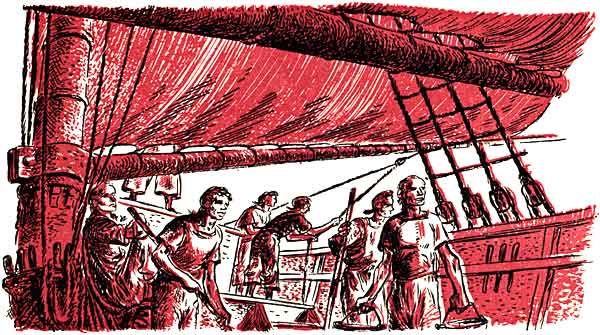
Now and again small flocks of birds, migrating perhaps or[143] blown out to sea, would land on the Mirabelle, and Ned Cilley made a large cage for some of the sweet-singing gaily feathered creatures for Chris and Amos. And on one occasion when the Mirabelle was sailing past Brazil, a flock of butterflies was carried out on a breeze from shore and hung on the rigging until the boys imagined themselves in a blossoming wood.
Chris had found, his first day at sea, the conch shell Mr. Wicker had mentioned, and he alone of all the Mirabelle's crew knew how the Venture had fared.
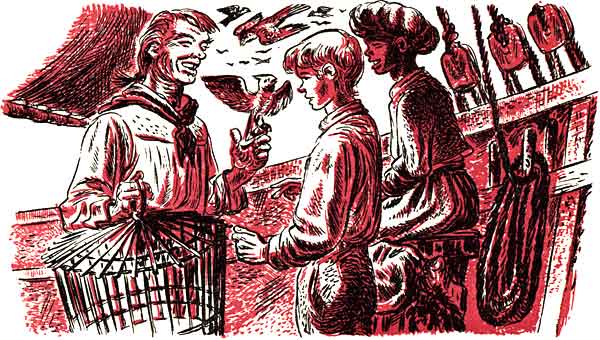
That first evening, in the little cabin Captain Blizzard had given Chris and Amos, Chris had waited impatiently for Amos to sleep. The two boys each had a hammock swung across the cabin by night which they rolled up and put away to give more room by day. But that first night poor Chris had begun to despair that he would ever hear Mr. Wicker's voice from the shell, for Amos was excited and had no wish to go to sleep. He[144] swung back and forth, happy as a dark bird in his hammock, his round eyes looking toward the porthole where there was a faint gleam of night sea.
"Chris," Amos said, "we're sure going on a mighty far trip! That Mister Finney, he showed me on a map, but I never heard of any of the places we pass by. The Bahamas, he say to me, then the West Indies, Cuba, Barbadoes"—he was ticking them off on his fingers as he named them—"an' on to South America. Away down at the tippy end around—what's the name of that loud-named place?"
"Cape Horn?" Chris said. He was scarcely listening.
Amos tried to prop himself up on his elbow and promptly fell out of the hammock in a flurry of arms and legs and a heavy landing thump that brought a shout of laughter from Chris. After an attempt at making his bed again in the hammock, and some little difficulty in clambering safely back in again, Amos composed himself with the least possible movement in his swinging bed and yawned.
"I disremember," he said, "where else we're going. Wise Man islands, or Solemn Islands—"
"You mean, Solomon Islands?" Chris asked him. Amos gave another mighty yawn.
"That's what I said. Miss Becky, she read to me from the Bible about Solemn, how wise he was." There was a pause. "On that way—" Amos's voice was becoming indistinct.
"We go past the West Indian Islands next," Chris murmured, almost to himself. "I remember that."
"And the Cell-Bees Sea," Amos said in a whisper.
"Celebes," Chris corrected softly.[145]
"What I said," came Amos's voice, and then at last there was silence in the cabin.
He almost got as far as the China Sea! Chris thought to himself, and holding to the hammock, eased himself out and on bare feet went quietly to his sea chest.
Its square bulk stood in the shadow of the wall, but fragments of light from the night sky caught the brass nailheads and bands upon it so that it appeared to wink cheerfully at Chris in the gloom.
Slowly, to avoid any creaks that might awake Amos, Chris lifted the lid, thrust in one hand and found the shell. He held it near the small port for a moment, its rosy interior faded of color in the gray light. Then he turned it in his hand and put it to his ear.
At first he heard only the rushing sound of surf on a beach. Then the sea sound became fainter and a voice so familiar that it meant home to him came to Chris's ear as if from a long way off.
"Christopher? Christopher, here I am," came Mr. Wicker's voice. "How are you? All going well I hope. Please do me the favor to tell the Captain not to put ashore at his usual place in Tahiti, but to go by night to a cove he will find twelve leagues farther along the coast. I will tell you what to do nearer that time. He will find ample fresh water near that cove, but the Venture is up to mischief. You must escape it, and all on board the Mirabelle shall be witnesses to what Claggett Chew plans to do."
The voice faded out and then returned.
"You would probably like to know how far behind the[146] Venture is. She ran aground—most unfortunately and most surprisingly—and is three full days behind you. But she is a fast ship and will soon lessen the distance. Please to tell the Captain so; he is the only one to know of my gifts and that it is possible for me to communicate with you. Tell him not to stop for water or food until his stores are running low. You must not waste time. Have you heard me? Tap the edge of the shell three times for 'Yes.'"
Chris tapped three times, feeling much happier and all at once not quite so much alone. The voice came back to his ear.
"I am following your progress from this room in the manner you know. Practise your magic alone, or you will lose the knack. And now good night. Oh yes—Becky Boozer has been crying into her apron all day. Partly for Ned Cilley but I fancy—" Chris heard a chuckle from a well-remembered room—"but I fancy, largely for two boys! Good night, Christopher. Sleep well."

s the Mirabelle sailed farther into tropical seas, Chris and Amos worked out a pattern for their days. Before sunup, while the air was still cool from the night, the two boys were awakened by Ned Cilley or Abner Cloud. They joined the sailors on deck to do their share of chores—mending rigging, patching sails, scrubbing decks, or polishing brass. When the sun rose the boys breakfasted.
The men of the Mirabelle then went on with their various tasks, but Amos went up to the Captain's bridge where he listened to Mr. Finney and Captain Blizzard, and Chris went down to their cabin for an hour or more.
Supposedly, Chris was studying lessons. This was only partially true, for instead of sums, he was practising magic, in which he soon attained a high degree of proficiency.
What he most enjoyed was turning himself into some small commonplace creature to plague his friends on board—a mouse, one day, a flea the next, a fly on the third. Quite naturally, no one suspected his ability to adopt such fantastic dis[148]guises. So little did they guess—he had one or two narrow escapes from being swatted or stamped on.
It was Zachary Heigh whom Chris wanted to watch, and as a flea or a fly he often rode about on Zachary's jacket listening and observing. But it was not until the Mirabelle had rounded Cape Horn one morning that Chris, in the disguise of a fly, rode unnoticed on Zachary's jacket when that sulky young man, after looking around to make sure the others were all at work, slipped down to the sailor's quarters below decks.
There he dragged out his sea chest, and from under his belongings pulled out a second chest. Fitting a key to the lock, he lifted up the lid. Chris, perched on his shoulder, peered over to see the contents. They were disappointing—merely a gray powder carefully packed in a piece of tarpaulin.
Wonder why it has to be kept so dry? Chris pondered, but Zachary was already refolding the tarpaulin and locking the lid. In the next moment, Zachary had uncovered a length of white coils. Then Chris understood.
By golly! he exclaimed to himself, dynamite! Or gunpowder! And so much! What's it for?
Zachary made no other disclosures of interest that day, but after that Chris spent all the time he could, both day and night, watching the young sailor. He was determined to discover if he could what Zachary intended to do with the gunpowder.
It was hard for Chris not to be able to ask Mr. Wicker's advice and not to have his master's superior knowledge to lean on. Yet had he known it, it was just this lack which was making him quick witted and more resourceful.
One night a short time after Zachary's uncovering of the gunpowder, Chris noticed that Zachary remained on deck[149] after the others had gone to bed, and continued to sit with his back to a stanchion dreamily gazing at the starry sky. Chris was in a fever for Amos to sleep, which his good friend soon did. Then a gray mouse scuttered along the wainscot of the ship's passageways until it reached a good vantage point from which to see the young sailor on deck. Chris had chosen well; a mouse is used to the dark.
For several hours Zachary remained still and the mouse dozed, woke with a start, twitched its ears, and waited. Then, long after midnight when, alone of the entire ship's company, only the helmsman and night watch were awake, Zachary very slowly slid his way to the ladder leading to the hold. The mouse, scurrying forward, was able to follow by means of a dangling rope and a leap into pitch-blackness at the rope's end. The poor mouse hit something and ricocheted off. It lay stunned for a moment or two a few inches from Zachary's feet as the sailor stood at the foot of the ladder in the black heavy air of the hold. Then Zachary lit a candle end he had brought in his pocket, and lifted it up above his head to give the maximum amount of radiance.
The glow of the candle stub, like a yellow daisy in a cavern, spread petals of light for only a short distance. By its sputtering, the mouse looked up to the towering figure Zachary now made above it, and hearing the sharp squeakings and furtive scratches that signaled rats, the mouse thought it more prudent to adopt the shape of a fly. This Chris did, and on Zachary's shoulder the fly's many-faceted eyes could not only see everything, but see them several times over.
Zachary then put the candle on the corner of a packing case and from under his shirt pulled out the coils of the fuse Chris[150] had seen a few days before. He took up the candle stub and began a long and patient search, measuring with the length of fuse, and hunting for a secure hiding place for the gunpowder. In the end he found a cramped space, just big enough for him to slide into, made by the shifting of the cargo which had seemingly rewedged itself firmly, forming a curious little cave of barrel sides, crates, and heavy bales of cotton overhead. Dangerous, thought Chris, should anything rock the Mirabelle in such a way that the cargo shifted back suddenly to its original tight formation. The hold of the Mirabelle was large, the packing case cave was surrounded by hundreds of pounds of solid cargo. It gave Chris a trapped feeling that he did not like, and he was relieved when Zachary edged and squeezed himself out again into a freer part of the hold.

Zachary measured with his fuse from the crate cave, where he evidently intended hiding the gunpowder, to the farthest point away from it and nearest the ladder, for the treacherous young man wanted all the time he could get to escape from the[151] doomed Mirabelle. Time to climb the ladder, reach the ship's side, and perhaps row away to a safe distance.
The fuse proved to be rather shorter than Zachary Heigh wished. His candle stub, set on a crate, was burning very low and he had only a few more moments in which—that night at any rate—to decide where he would hide the lighting end of the fuse. Just before the candle went out, Zachary's fuse coil reached a group of molasses barrels, and here the young man decided that the fuse, when the time came, would be hidden and lit. He made a mark in white chalk behind one of the barrels and then hurriedly began coiling up the fuse as he turned toward the ladder.
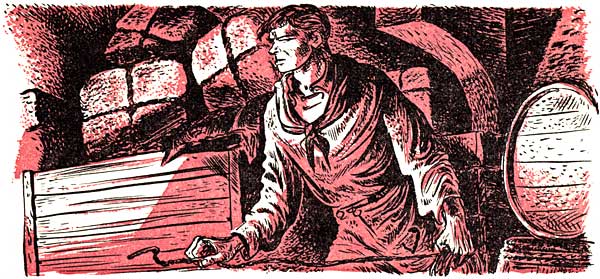
At that moment the candle end, drowned in a pool of its own melted tallow, guttered, blinked, and went out. The utter blackness of the hold rushed over Zachary and the fly who clutched at the threads of the sailor's coarse shirt. Zachary was only a young boy, scarcely older than Chris himself, and the fly could almost feel the quickening of Zachary's heartbeat at the sudden flood of dark, the sense of the late hour, and the[152] rat-infested hold. Zachary moved quickly in the pitch-black, his hands outstretched to feel the ladder, his breath coming and going rapidly through his parted lips. The heat of the airless place, the heavy smells of the cargo itself, oppressed and weighed on both Zachary and his unsuspected companion. The Mirabelle was moving slowly forward in calm tropic seas, scarcely making headway on an almost breathless night. Down in the hold the ladder eluded Zachary's reaching fingers, and the creaking of the ship was all that was to be heard except for the faint sound of Zachary's breathing.
Then all at once, as sometimes happens in a roomful of talking people, there came a moment of total silence. For a second there was a space in the creaking of the ship, the pad of rats, or the slight shift and reshift of boxes. And in that second, just as Zachary's fingers touched the ladder, to Zachary and to Chris on his shoulder, came the distinct sound of another man's breathing.

xhausted as he was by his long vigil and the effort needed to change his shape, it was another hour or more before Chris could sleep that night. The sound of that heavy but held-back breathing, so close to Zachary and himself in the black hold, frightened Chris almost more, once he was safe in his cabin and hammock, than it had at the time. Zachary had bolted up the ladder like a frightened squirrel, with Chris, as a fly, holding on for dear life. Even so, Zachary moved none too fast to suit Chris, who flew off toward his own cabin in a chattering fright. The lumpy form of Amos, asleep in his hammock, was reassuring, but Chris lay shivering and puzzling for a long time before he finally fell asleep.
The next day, lying on his stomach in the hot sun, he dozed with his cheek on his folded hands, his mind going over and over the details of the night before. Try as he would, Chris could not remember having seen any member of the crew even near the hatch leading to the hold.[154]
Let's see, he began in his mind, a bunch of the men were singing—Bowie was one of 'em. They went down to their quarters first. They were really closest to the hatch. Mr. Finney called Abner up to the bridge, and Abner came back and went down a while later. Guess Mr. Finney went to his quarters—I don't remember seeing him cross the deck or come over that way at all.
Then—let's see—Captain Blizzard took a turn around the deck. It was getting dark. He joked with the cook at the galley door, and probably went on, for I didn't see him come by again. Next, Ned Cilley was relieved at the helm by Elbert Jones, who took over. Ned went on down.
Or did he? Chris wrinkled his brow with concentration. I guess so, he thought, but I don't know so. It looks to me as if it could have been one of several people, and I'll be switched if I know who. I'll keep my eyes open. Maybe whoever it was will give himself away somehow and give me a clue.
The Mirabelle was nearing Tahiti. The air was balmy, and already a different fragrance pervaded it, together with a softer quality which Chris now knew meant land.
At noon one day Captain Blizzard announced to Chris and Amos: "Should the wind keep up as it is now, by nightfall or by dawn at the latest, we should sight Tahiti. We've water and fresh stores to take on there." He beamed over his many chins at the two boys. "'Tis a fair place, is Tahiti, and one you lads will have an interest and a pleasure in seeing."
Chris lost no time, as soon as he could do it without being noticed, in hurrying down to his cabin. Locking the door, he took the conch shell from his sea chest and held it to his ear. The voice of his friend—so far distant now!—came to his[155] ear and Chris smiled with the pleasure this brief link with home gave him.
"Nearly to Tahiti, eh, my lad?" came Mr. Wicker's voice. "Then listen carefully. Ask for a private interview with the Captain, and when you are alone with him, tell him that these are my orders: He is to sail on past his usual anchorage, making all speed. You will know the reason for it at sundown today. Tell Captain Blizzard to go around the point—he will know—and continue for twelve leagues farther on. This must be done by night, for he must not slacken. Then he will see by moonlight a reef. The water is phosphorescent, and when it breaks over the reef it will shine in the night. Then must he heave to, and you will go over the side, and as a fish, find out the channel, for the coral is dangerous and the way into the cove almost impossible to find even by day.

"The land there is like a cup with a chip in its rim; the chip is the entrance to the cove. This entrance, overhung by slanting trees and jungle, is just large enough to allow for the passage of the Mirabelle.
"Nevertheless," went on Mr. Wicker's voice in the shell, "the masts and the sides of the ship could be seen from the sea. So with all haste, once anchored in the cove, the men must go[156] ashore, bring back palm fronds and leafy branches and camouflage—as you say in your time—the Mirabelle from her topmost mast to the water's edge.
"Let the men rest, but by midafternoon have them hide along the shore facing the sea, for they shall all be witnesses to what is to transpire. Then you must do your part, for you must board Claggett Chew's ship and see to it that his vessel does not gain many days' advantage over the Mirabelle. By daylight the Mirabelle will find her way safely to sea again, and you will rejoin her with the aid of the rope." The voice paused and then enquired, "Is all this clear?"
Chris tapped three times, his heart thumping with excitement at the prospect of the imminent action.
Going up to the Captain's cabin, he took advantage of a moment when Mr. Finney and Amos were outside to ask Captain Blizzard if he might speak with him alone.
"Certainly my boy," boomed out the Captain, his blue eyes abruptly keen and penetrating. "Mr. Finney will be some time on deck. We cannot be overheard in here."
He motioned to a stool as he let himself fall heavily into a teakwood armchair made especially for his bulk. But Chris was too excited to sit down, and delivered his message standing.
When he described how in the night—that very night, he realized with a jumping pulse—he was to go over the side of the Mirabelle and find out the channel, the Captain looked at him piercingly.
"How now, lad," he said in his deep voice, "how are you to find the channel in the dark?"
This was a question Chris was unprepared for, but he took[157] a long breath which gave him a moment of extra time, and then replied.
"I—I see uncommonly well by night, Captain sir," he said, "and I'm a very strong swimmer."
His face froze with nervousness that this might not do as an answer, and he stood stiff and still before Captain Blizzard. The Captain sat forward in his chair looking at him for a long moment, considering. Then he said: "Well, I do not care for it, I cannot say I do. This ship is more to me than wife or mother or family. She's all I have, young man, and you can understand that to trust her to so young a lad, clever though you may be, to go safely past jagged coral reefs into a cove I never even guessed at, well"—he threw out a hand and then rubbed his chin with it—"You can understand I do not fancy it. However," and he leaned back in his chair again, "I take orders from Mr. Wicker, the owner of the Mirabelle, and since he says so, this is how it must be."
He paused, fingering his lower lip and looking sideways in a reflective fashion at Chris standing before him.
"He told me you would have information from him for me, from time to time. We shall say no more, but I trust you understand the responsibility you have? This ship, its cargo, and its men will be in your hands."
Chris felt cold for a moment, chilled as he had never been before, but he spoke up firmly. "Yes sir. I think I can do it safely, or I should not try, sir."
Captain Blizzard's round pink face creased in his winning smile. "Aye, aye. No doubt. Just bear it in mind at the time, eh lad?"
"I shall sir," Chris replied.[158]
He then went on to describe what else was to follow—the covering of the ship with leaves to make it blend with its surroundings. Camouflage was not a word the Captain, or anyone else of his time, yet understood.
"After we see—whatever we are to see," Chris ended, "I'll be absent for a while. What can be said during that time, sir?" Chris thought to ask. Captain Blizzard pondered for some minutes, and Chris was grateful that he asked no questions. At last he answered.
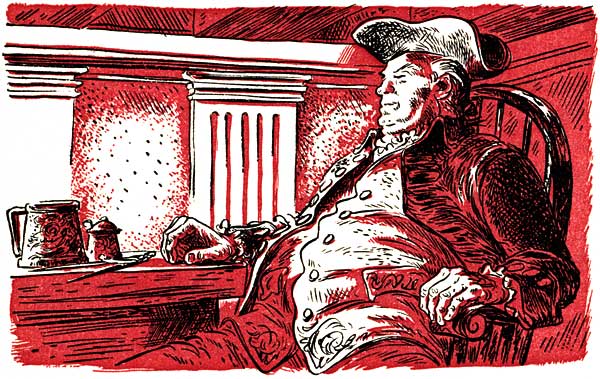
"I shall say you have a tropical fever, Christopher," he said. "I am somewhat skilled in medicaments—I have to be, as captain of a ship, and the crew know it. I shall say that you are in my own cabin so that I can care for you. I shall allow no one to enter it but myself. It will be a most contagious fever for a time," he added with his eyes twinkling. "I shall bring you food with my own hands. Nothing much—broth and gruel,[159] and I daresay I can eat it myself if I cannot throw it out the porthole!" He winked at Chris. "Have no fear on that score, Christopher." He looked steadily at the boy in front of him. "You have your part to carry out, I have mine."
Not since he had left Mr. Wicker had Chris felt such confidence as he did in the words and actions of Captain Blizzard. He knew now that his absence, for as long as he had to be away, would be covered up and satisfactorily accounted for.
Their conversation had taken some little while. As they went over for the last time all the details of what lay ahead of them in the next few hours, Chris, glancing out the windows of the Captain's cabin, saw the splendors of a tropical sunset streaking the sky.
"Oh sir!" he cried, "Mr. Wicker said we'd know the reason why we must take shelter tomorrow at sundown today. And now it is sundown!"
With quite surprising silence and agility for so large a man, Captain Blizzard was out of his chair and half-way to the door of his cabin before Chris had much more than finished speaking. Over his shoulder, continuing with rapid quiet steps to the bridge of the Mirabelle, he said: "Run down to your cabin and fetch up that good spyglass of yours, my boy. We shall have a good look, for as you know, night falls in a few moments after sundown in these waters."
Racing to his cabin and back, even in those few seconds Chris could see a change in the sky. The brilliance of the colors, their extravagant and awe-inspiring cloud effects, had taken on an intensity of light which meant they were at their peak.
Standing beside Captain Blizzard on the bridge, Mr. Finney[160] and Amos just beyond, Chris and the Captain looked through Chris's powerful spyglass at the wide stretch of the horizon.
All around lay only the sea and the dazzling sky. Not even a porpoise or flying fish broke the surface of the water which was placid save for the long swells over which the Mirabelle dipped her white sails. The color ebbed from the sky as if drained from some celestial bowl, and in the place of the scarlets and turquoise, the clear yellows and the plums, came a deep blue that was the forerunner of a fine clear night.
Chris turned slowly, his glass to his eyes, searching the edge of what was now their world, and especially the line where the sea and sky meet.
All at once, as if a white dagger had stabbed the rim of the ocean, white sails grew upward against the encroaching night, and Chris found what he had been looking for.
"There sir!" he cried, pointing to the distance, and the Captain and Mr. Finney swung their glasses to where his finger led, far astern of the Mirabelle.
Captain Blizzard's round cheerful face hardened as he looked, and Mr. Finney's lugubrious countenance seemed positively despairing, while Amos hopped on one foot crying: "Leave me look through your glass, Chris! What do you see? What is it you-all see?"
It was Captain Blizzard who answered him.
"We see the Venture, Amos, Claggett Chew's ship, coming up fast astern. Let us all pray that the wind holds."

he captain, turning quickly, bellowed for all hands to come on deck. When they were assembled below him he spoke. "Men, you have followed me for many a voyage and I have always brought you safely home. Is it not so?"
A good-humored and enthusiastic roar of assent came from the sailors. Captain Blizzard began again.
"What lies ahead of us in the next few hours will not make good sense to many of you. Nevertheless I ask for your instant help, and you shall see what lies at the end of my orders when we reach that time. Are you with me?"
"AYE!" cried the sailors, their faces close together below their captain, and upturned to see him and catch every word. All but Zachary Heigh, Chris noticed. Zachary remained sullen and apart, his arms folded on his chest, taking no part in the enthusiasm of his companions.
"Well and good," roared Captain Blizzard. "I thank you. Now crowd on all the sail she will take, boys, for the Venture follows hard upon us!"[162]
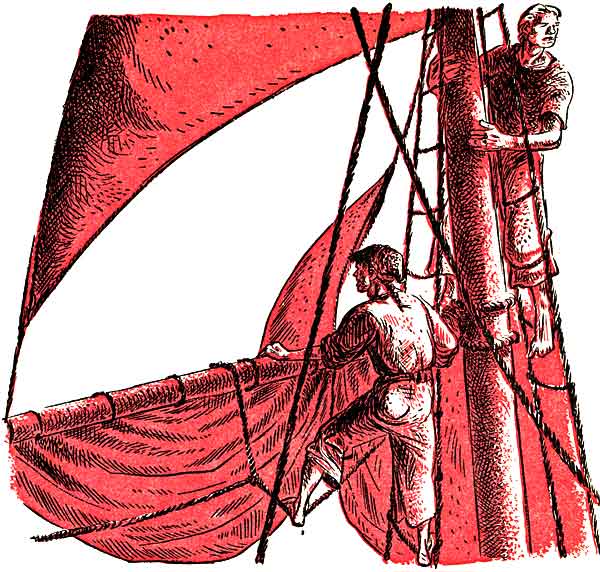
Without a word the men sprang to work, darting up the masts and out over the rigging like monkeys. Every bit of sail the Mirabelle possessed bellied out on the night breeze, and Chris could feel the ship leap under his feet as the additional canvas caught the wind and the graceful ship surged forward.
Night fell before the men had finished and Chris and the Captain could no longer see the sails of Claggett Chew's Venture.
The Captain turned to Chris. "It would be my advice, lad, to go below and sleep for a bit. You too, Amos. I shall send Ned to awaken you when land is sighted."[163]
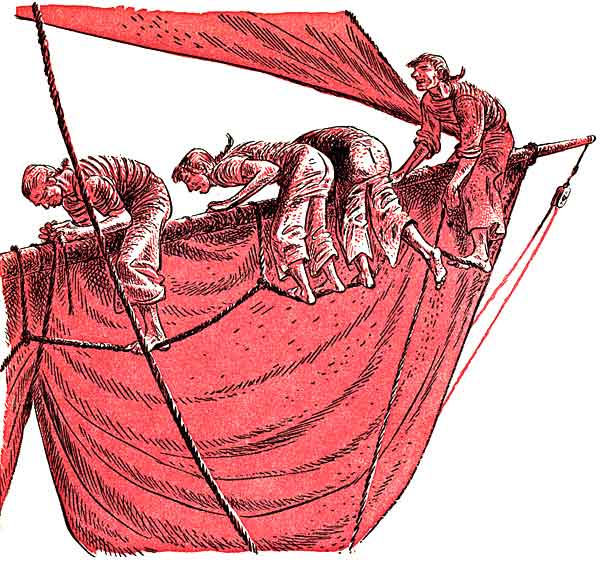
This seemed good reasoning, and the two boys went below where they snatched a few hours' sleep. It seemed only a minute to Chris from the time he lay down in his hammock, knowing he was too excited to sleep, until Ned Cilley was at his side with a lantern, bringing food for Amos and himself.
"Best eat up, lads," Ned told them, "and join the Captain, sez he to me, for land is just ahead and the Captain do be waiting you on the bridge, Chris, me lad."
The food was bolted down in no time and Chris, feeling fresh and alert, ran up to the warm darkness of the bridge.[164]
To his surprise the usual lanterns were not lit; only a small shaded light shed its rays on the compass near the wheel.
At his questioning look Captain Blizzard muttered: "Impossible to tell how close behind the Venture may be. We have come quickly, but they have the faster ship. I have no wish to give them more clue than necessary as to where we may be." He looked keenly toward the bow, his hands clasped behind his back. "Land is off the starboard quarter, and Abner Cloud is out on the bowsprit looking for the reef. We have passed our anchorage—they expected us, or some other ship, for fires were lit on shore. Sail has been taken in; we are going slowly and will soon be there, by my reckoning."
His eyes grown used to the dark, Chris now saw that it was a remarkably light night. There was no moon, but a myriad of stars gave a clear pallid sheen to the sea. Chris, looking to his left, could make out the blacker mass against the stars that was Tahiti. The Mirabelle was close inshore, and the scent of hot sand from the beaches, of flowers and of plants, made Chris take many deep grateful breaths.
"May I go forward and be with Abner?" he asked the Captain.
"Aye," replied that good man, for by this time Chris was as surefooted as any sailor and for the last month or more had been clambering barefoot in the rigging with the best of them. "Aye lad," the Captain told him, "and hurry. Happen your eyes are sharper than Abner's. Sing out when you spy the reef. We will heave to, and then God be with you, my lad, to find us out the channel to the cove!"
Chris ran forward to the bow of the Mirabelle, and out along the bowsprit where, at the tip, he could see the long[165] form of Abner Cloud stretched out at full length. They murmured a greeting and waited, eyes straining ahead.
Then both saw the phosphorus gleam and fade, gleam and fade as the waves broke over the coral. Eerie jade-green and white-gold, the phosphorus shone in the starlight.
"Reef-ho!" sang out Abner, and the sound of his shout was echoed back from the closeness of the shore in faint dangerous mockery. "Reef-ho!"
"Reef-ho!" came a third time from the bridge, and then "Heave-ho!" thundered Captain Blizzard. "Drop anchor, lads!"
Abner left his place to go back and lend a hand, and in his sudden solitude Chris grasped a rope and swung down to the water.
A porpoise slipped away from the Mirabelle and moved this way and that to get its bearings. Then the mass of the reef to the left and the hidden shelf of a second but obscured underwater reef to the right made dark patches in the phosphorescence. Far below lay the ghostly spread of sand, and the porpoise nosed its way forward.
The channel to the cove proved to be some five hundred yards long, and it seemed no time before the porpoise passed from the shadow of the trees at the shore into the starlit cup of the cove. Taking a turn about in the enjoyment of flipping its fins and giving a leap or two, the big fish then went back toward where the Mirabelle hung suspended on the glassy sea.
A boy it was that pulled himself up hand over hand along the anchor rope and stood dripping sea water on the bridge before Captain Blizzard.
"I've found the channel, sir," he said, abruptly conscious of[166] his importance from the admiring way in which Amos was staring at him. "There's a dangerous shelf of coral that juts out on the port side—if you let me go first, and the men man the boats and row her in, I think we shall do it safely even in this light."
Captain Blizzard looked at him, his expression both serious and trusting.
"Well lad, we do what we must, and you and I understand one another. Ahoy there!" he roared down to the shadowy decks from which the black spikes of masts rose high to break the sky. "Man the boats! We shall tow the Mirabelle to cover, for there's a channel here!"

He turned to Chris as the sound of running feet and of the boats being hoisted overboard came loudly in the stillness of the night.
"Now Christopher, my boy, do you go down and go over the side again, and remember what we spoke of a few hours agone!"
The next half-hour was an exhausting one for poor Chris. It was an impossibility for him to keep for long at a time, either his own, or the shape of the porpoise. He had to enter the water under the eyes of the sailors waiting with their oars[167] poised above the sea, in the shape they knew; Christopher Mason. But once he dived under, in order to seek out the treacherous channel in the half-light, he needed his fish's eyes and senses. He therefore would swim a few yards as a fish, but had to surface again as himself in order to let the men see him, and call: "The length of two boats, keeping to starboard, boys. Then ease her over this way—to port."
So it went, almost foot by foot until the Mirabelle was safe inside the cove and turned broadside to the entrance. Then, and only then, with the anchor safely dropped to the white sandy depths of this hidden harbor, did Chris, tired to his very bones, climb up the ladder and over the ship's side. There remained the camouflaging of the Mirabelle, for the stars were fading and before long, dawn would banish secrecy.

But Captain Blizzard and Mr. Finney awaited Chris on deck. Captain Blizzard had his hands clasped behind his back in his habitual gesture, and as Chris stood before him swaying with fatigue, there was a look on the Captain's face that Chris had never seen there before. The usually cheerful, joking man was grave, while Mr. Finney, so sober and forlorn as a rule, looked positively jubilant.
"My good lad," the Captain said, "you said you could do it,[168] but truth to tell, I doubted it from the bottom of my heart. Now that you have succeeded where I am sure no other could have done as well, I find I have no words of praise good enough for ye." He looked almost tenderly at the tired boy. "I am proud of you, Christopher. You did a man's task with a boy's body and mind. And it took a man's spirit, too."
Without further words the Captain of the Mirabelle held out his pudgy hand to hold Chris's in a steadying grip, and Mr. Finney swung out his hand, his long face breaking into one of the rare smiles Chris was ever to see on it.
"Now, me boy," thundered the Captain, "do you go to your well-deserved rest. Depend upon it, we shall cover the ship with green until she looks like the proverbial Christmas hall decked with boughs of holly, as the song goes!" he added chuckling. "A little later in the day you shall be called to see what you make of the result. And now, to bed with ye both!" and he clapped Amos on the back.
Never had his hammock seemed more like a cloud to Chris than it did on that night, nor was sleep ever more engulfing.

hen Chris awoke he saw that Amos had already stolen out of the cabin, for his hammock was rolled up and put away. By the strength of the sun and the heat that seeped even through the boards of the ship, Chris judged that the morning was well advanced.
Dressing was rapid, for Chris, like the rest of the sailors in the tropic heat, wore only his breeches. His bare chest and shoulders were tanned and healthy and the soles of his bare feet as tough as shoe leather.
Running up to the bridge he was startled at first, at coming on deck, at the sudden green shade everywhere. Then looking up he saw that to their very peaks the masts and rigging of the Mirabelle had been hidden with palm fronds. That side of the ship that could be seen from the sea through the narrow channel entrance had been completely covered with green. The work was not yet finished, but most of the crew were sleeping during the hot hours, while a handful had volunteered to complete the job.[170]
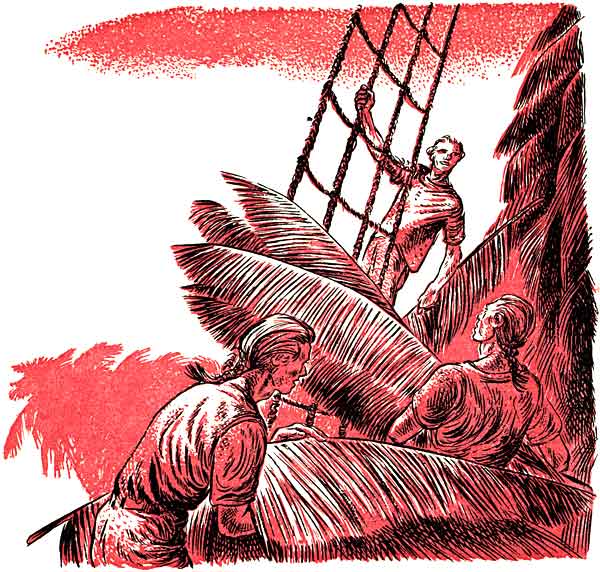
The cove by daylight was even lovelier than it had seemed by starlight the night before. The deep water, with a white base of coral sand, flashed in emerald, turquoise, or sapphire blue. Its clarity and sparkling colors put the Jewel Tree into Chris's head and he had a moment's throb of fright when he realized that it was this very night that he must board the Venture to impede her progress toward the Chinese prize.
He put these thoughts from his mind until the time came, and decided to tackle what was most pressing. The most ur[171]gent matter that first claimed his attention was breakfast, and when he reached the bridge he was delighted to see fruits from the island piled in shady corners. These and bread and cheese made up his meal, which he ate while watching the final leaves and fronds put in place on the sides of the Mirabelle.
Captain Blizzard came up to him, his hands clasped behind his back, and nodded toward the men pulling themselves slowly over the ship's side and falling exhausted into the shade to sleep for a few hours.
"They will be fresh enough in a while," he said, "and then we shall one and all row ashore to see what we shall see."
He paused, and Chris, looking up, saw that the Captain's gaze was fixed on Zachary Heigh. Zachary was obviously not only far from sleeping, but was restless, jumping up to look out to sea and then sitting down again. It would be only a few minutes more before up he would jump once more to pace the deck or lean at the ship's rail.
"It would seem," the Captain said casually, "that Zachary has something on his mind."
Mr. Finney joined Chris and the Captain at that moment, and looking down at Zachary nodded his long sad face in lugubrious agreement. Chris opened his mouth to say something to the Captain of what he had seen Zachary doing. Before the words could leave his mouth, he was interrupted by the appearance of red-faced Ned Cilley. Cheerful as a sand flea at the prospect of going ashore, Ned had come from his rest with a small company of the sailors to ask permission of the Captain if they might leave the ship.
"Well, why not?" the Captain demanded. "And why not take along the rest too? We were all to go ashore presently,[172] in any case. Those who still want to sleep can do so even more comfortably on the shady sand under the palms."
So in an instant the decks of the Mirabelle were crowded with laughing jostling men, duties over for that day, tumbling down the ladders to the dinghies in which they rowed ashore.
Chris and Amos were shoved along with their friends, Chris hiking up his breeches to cover the coil of the magic rope around his waist; the leathern bag hanging in plain sight about his neck. The sailors had often teased him about it, saying that he kept his riches there, but they made no attempt to snatch it from him. There had been no time to warn the Captain, but as the last boatload of sailors leaped into shallow water and scattered under the shade of the trees, Chris searched and searched again for three faces among the crowd that he did not find. Zachary Heigh, the Captain, and Mr. Finney were not to be found.
Aghast, as he understood now what Zachary's plan was—to blow up the Mirabelle just as the Venture and its crew came near enough to shoot down the unarmed men—Chris rushed back to the water's edge and stood there hesitating in the powerful sun. How could he change himself to a fish or other shape, unobserved? The sailors from the Mirabelle were everywhere—in the thickets for the shade, as well as along the edge of the cove where he now stood, indecisive. To use the rope was just as impossible, for the beach was broad and Chris was acutely aware that he stood out like a single tree in a field, there on the white sand in the broiling sun.
"Better come outen that sun, Chris!" someone called to him. "There's too much of heat in it to be good for unkivered heads!"[173]
Chris knew the voice of the sailor was right, and was on the point of jumping into one of the dinghies, where they lay pulled up on the beach.
Far out on the cove, the decks of the Mirabelle were deserted and unlike themselves, so empty of life. Sweat started out on Chris's forehead, as he imagined Zachary in the hold lighting the fuse, and he wondered where the good Captain and Mr. Finney might be. He wondered too if he could row over in time, or if he would be blown up with the ship.
The boy had his hands on the scorching wood of a dinghy, his muscles tensed to thrust it into the waters of the cove, when out over the still harbor, jangling in the heat, came a prolonged and piercing scream. Hot as he was, Chris felt himself go cold at the sound. He knew instantly, although he had never heard it before, that this was the death cry of a man. The scream came a second time, terrified and despairing, and out over the water following it came a low, scattered rumble.
Silence fell for several frozen seconds, and then all at once Chris became aware as he stood rigid with horror by the boat that the sailors of the Mirabelle had rushed out from the coolness of the shore to stand stiff and appalled beside him. A babble of voices broke out, and one by one the boats were hastily launched, heading back to the ship, leaving Chris shaking and unnerved on the sand. Over the water as brawny backs bent to the oars the words came floating back:
"Someone's dead for sartin sure—"
"Who was left on board, you say?"
"Leave the lads—no sight for young-uns."
"Pull, you lazy lubbers! The Capt'n and Mr. Finney bean't among us!"[174]
It was a little later that Chris remembered Amos having taken his arm and led him into the shade, and of how sick he was—the heat and the scream, the fear, and a sense of having failed in warning the Captain, combining to churn his insides into a queasy place that violently rejected his pleasant breakfast of so short a time before. Then weak, but somehow feeling better, Chris lay in the cool while Amos found a cold pool of water with which he bathed his friend's face, and then sat fanning him without a word.
Chris must have dozed, for when he came to himself the light had changed, and men were carrying a shapeless bundle wrapped in canvas to a grave dug in the sand. Chris started up and joined the men gathered solemnly about the grave, and as he searched among them, knew a great sense of relief and joy when he saw, standing at the grave head, the Captain and Mr. Finney. As Chris came up to them, Captain Blizzard was speaking, a Bible in his hand.
"Men of the Mirabelle, by rights as captain of the vessel I should read the burial service for Zachary Heigh, that met his death by accident, boxes and crates killing him in the hold the way they did. But," and the Captain scanned the tough weather-beaten faces near him slowly, one by one, "you that helped to uncover him know what he meant to do. We harbored a viper, men, who meant to destroy our ship and cargo and leave us to who knows what fate? Had not the bung of that keg of molasses above the lighted fuse most providentially fallen out and the fuse been put out by the sirup, no doubt neither Mr. Finney nor I nor the Mirabelle would be here to tell the tale."
He paused again, but there was not a stir from his audience.[175] From under their dirty headkerchiefs or straggly unkempt hair, the men who knew no other life but the sea, no happiness or danger unconnected with it, never took their eyes from their captain.
"So, men," Captain Blizzard resumed, "the gunpowder that was meant to be the end of our fine ship is now safe and out of harm's way, and the traitor who intended this infamous deed has been dealt with by fate and killed in a tomb of his own finding. Therefore, feeling as I do for my ship and my men, I cannot bring myself to read the holy words over this man who had no charity in his heart."
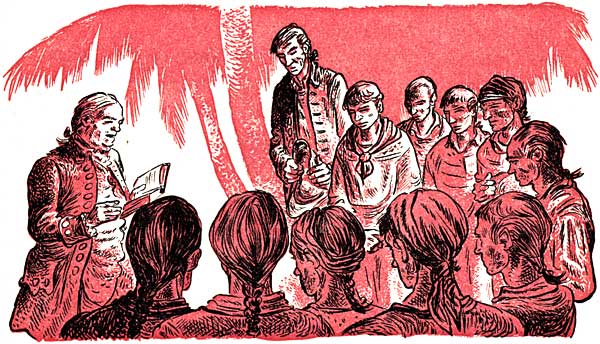
Captain Blizzard handed the Bible to Ned Cilley and stood with his hands behind him, nodding his head as if to stress his words.
"Yet," he said, "he is being buried far from home and kith or kin. It is not proper that he should be left without even a[176] token of respect." He gestured with his plump hand to the Bible. "Do you settle among yourselves who shall do the reading, but pardon me that I am so small a man, that I cannot forgive a villain!"
So saying he turned slowly away, followed by Mr. Finney, who was more than usually sober and solemn. Into the dry clatter of palm fronds rose the rough voice of Ned Cilley laboriously reading.
"I am the Resurrection and the Life—"
But Chris, watching the disappearing backs of the Captain and first mate, was thinking what a curious and fortunate thing it was that the bales had fallen on Zachary just at the right time, and when there was not a ripple on the cove.
Chris watched the fat short man and the tall lean one go, resolution and anger still evident even in the set of their shoulders. The boy was thoughtful, thinking back over what Ned had said of them, that first day on the docks: Faithful! he seemed to hear Ned say, that's true of the two of 'em! Whatever they can do for Mr. Wicker is law for Elisha Finney and Captain Blizzard.
Chris thought them two very remarkable men indeed.

arely were the last spadefuls of sand packed down into Zachary Heigh's grave when Amos, who had wandered to the beach facing the sea and long outer shoreline, sang out: "Ship ahoy!"
Remembering their orders the men rushed over from the cove but remained hidden behind trees or shrubs. Chris and Amos climbed a tree from whose branches they had a fine unobstructed view up and down the coast. To the left, far distant, a point of land jutted out into the sea, tropical trees carrying their green out in a long curve. To the right, just appearing from the direction in which they themselves had come a few hours previously, came a majestic ship black from stem to stern. Black was its hull, but black too were its sails. It looked exceedingly ominous on the afternoon blue of the sea, and as it came almost level with the channel to the cove, its sails were lowered and the watchers on shore could hear the splash of the anchor as it was heaved overboard.
Then Ned Cilley, oldest of the Mirabelle's sailors, came[178] panting up from the cove and Zachary's grave to look out from the leaves at the base of the boys' tree.
"Oh, Lordy, Lordy!" he exclaimed when he caught sight of the black ship, the last of her somber sails being taken in, "what did I tell you, lads?" he cried, addressing anyone and everyone near enough to hear him. "That be the Black Vulture, the pirate ship. No vessel is safe near the Black Vulture! What a God's mercy that all of us, and the Mirabelle, are out of sight, for the men aboard the Vulture know no pity, lads!"
Growls and murmurs rumbled along the shore from clump to clump of leaves where the men stood hidden. Chris pulled his spyglass from his pocket and looked eagerly at the pirate ship only a little way out from shore.
It looked familiar, although Chris had had time to see so few ships he could not be certain. He shifted the glass, looking at details here and there, and at the name in gold carved letters against the black-painted side. Vulture. The letters stood out neat and clear and then Chris's heart stopped and started again.
"Ned!" he called down softly, for sound carries far and clearly over water, as every sailor knows, "Ned, don't most ships just paint the name on the side?"
"Aye lad, that they do," Ned replied in a puzzled tone, looking up through the leaves at the two boys.
"Then isn't it unusual to have letters carved of wood and gilded, on the side of a ship?" Chris persisted.
"Aye, that it be." Ned's puzzled tone was sharper now and he looked up at Chris and then out to the pirate vessel. "What're ye aimin' at now, me lad, eh?" Ned asked. "What's in your mind?"
"Just tell me what ships you know whose name is not painted[179] on but set in carved letters, Ned," Chris said, and he lowered his glass and looked down.
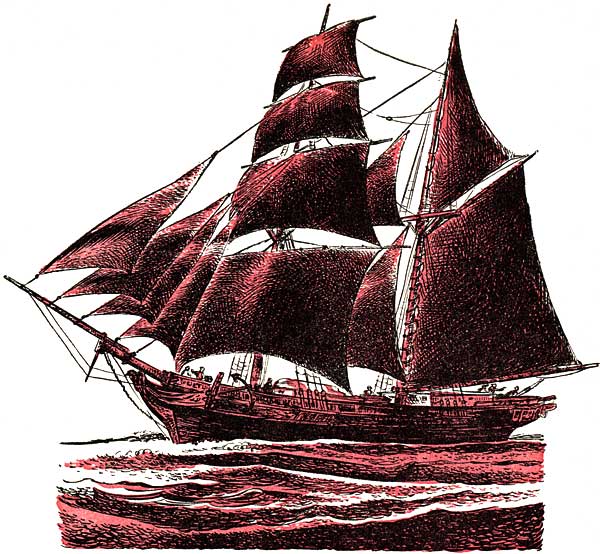
Their conversation, in the silence, had had some quality of excitement in it that had been caught by the others, for when Chris glanced down he saw half the ship's company knotted around the base of the tree, and a half-circle of faces turned up to his, along with Ned's.
Ned's face puckered with effort for a few moments, as he muttered: "Let me see, now. There's the Southerner—no,[180] that's painted on, or the Priscilla Drew—no; that's painted too." He turned, searching the faces of his friends. "Come, boys, what ship has carved letters for her name, not painted ones? Where's a better memory nor mine?"
The Captain and Mr. Finney came to join the crowd, standing back in the shadow of the palm grove. Both men were listening attentively. It was Bowie who finally spoke up slowly, as if unwillingly.
"There's only one ship that ever I did see with carven letters on her side, and that was Chew's ship, the Venture."
He was surrounded at once by a low murmur of assent from all sides. "Aye aye!" "That be so!" "'Tis so!" Chris from his higher perch, pointed an accusing finger out to sea.
"Look then, for there's your same ship! The Venture and the Vulture are one and the same! Here—take my glass," he cried handing it down. "See the two second letters—they are just a bit aslant. Weeks ago, at home, I thought it seemed strange that the E and the N looked loose. But loose they are! Once at sea they're changed—bolted in, maybe, I don't know how—and there's your merchant ship at home and pirate ship at sea!"
The men turned, wonderingly but angrily too, for the remembrance of what Zachary Heigh had tried to do, and so nearly succeeded in, rankled, and they now began to understand many things. Voices began to rise dangerously high in the growing ill-feeling.
"Ah—the dirty dog—"
"And his friend with the airs!"
"Have we then been harboring the like of him at home?"
"Aye—to let him go free to scuttle the next fine ship, take all her cargo, and leave her valiant men to drown!"[181]
The Captain came forward, his hands upraised. "How-now, men, be still! We are here to see what may take place, but if your voices should carry, as well they may, over the water, we should have little chance of it. Do you be still and watchful."
A low cry came from Amos, who had not taken his eyes from the sea.
"Look! Around the point! Here comes another ship—looks like that was what the ol' blackbird was a-waiting for!"
Sure enough, as the fine white sails of a good-sized vessel made its way around the point of land, distant shouts and confusion could be heard on the Vulture. Looking through his glass, which he lent to Amos every few moments, Chris could make out scurrying figures on the deck of the pirate ship, men springing up the rigging and others walking up the anchor as quickly as they could. On the bridge Chris could see the tall gaunt height of Claggett Chew. The humpbacked figure of Simon Gosler stood rubbing his hands, at one side of his master, while on the other, observing the work of the sailors with a supercilious air, leaned a familiar and ridiculous figure. Dressed as if for a court ball at Versailles and holding his lorgnette a few inches from his nose, Osterbridge Hawsey remained elegantly aloof from anything so degrading as hard work. He looked on with a superior smile as the black sails were unfurled, the anchor was heaved dripping from its bed, and the hard-pressed dirty crew made all speed to go in advance of the oncoming ship. Still others among the pirates could be plainly seen manning the guns that had already been brought out from their hiding places, while still more stood by to furnish their comrades with cannon balls and powder. Amos became so excited he leaned too far forward, and, nothing learned from[182] his nightly difficulties with his hammock, fell out of the tree onto the heads and shoulders of the men below, causing astonishment and swallowed laughter before he was hoisted back up again.
"Bless my cap and buttons!" Ned Cilley cried, "there's to be a fight for sartin. I can see the flash of light on the swords and axes!"
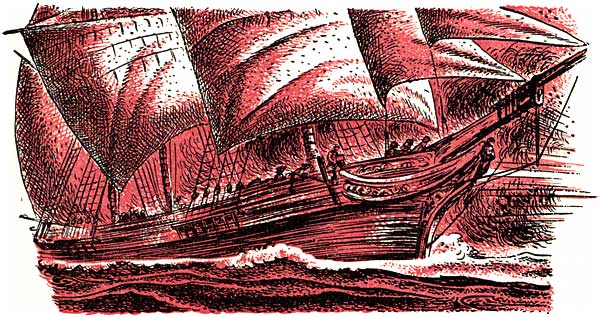
Quicker than it would take to tell, the Vulture, black sails spread, moved forward to head off the merchantman evidently homeward bound from China.
The pirate ship sailed down the coast, turned, and forced the oncoming vessel to stop. Then, as well as the watchers could guess, a parley ensued, but if the pirates thought the prey would be an easy one they were mistaken, for the merchantman came forward suddenly, all sails set, in an effort to ram the Vulture. But the rich cargo vessel was hopelessly at a disadvan[183]tage. The pirate guns opened fire, ropes were thrown over to the peaceful ship, and with yells of triumph that carried even above the tumult of the fighting, the pirate crew leapt on board. Tiny figures could be seen falling into the water from the merchantman, and in a bitter hour or so the sound of fighting died out altogether.
The men watching from the shore had been kept there only by the obedience the Captain was able to extract from them, for rage was in the heart of every man at the sight they were forced to see, but were powerless to prevent. Even among such hard-bitten old salts as they all were, more than one could be seen mumbling a prayer for the unfortunate men who had put up such a gallant fight.
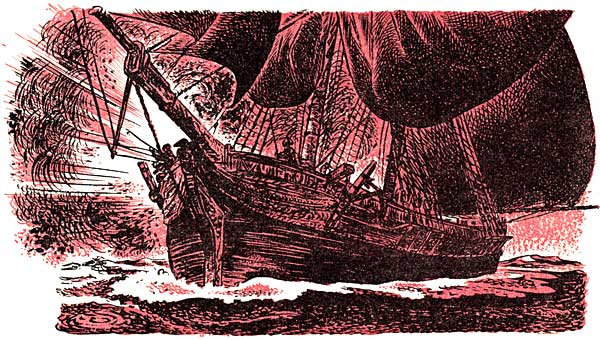
"Come, lads," Captain Blizzard said to them at last. "We have seen what we had to see, and many is the witness now against Claggett Chew and all his company!"[184]
"Aye! Aye! That we are! We'll bear witness to such villainy—they should all hang for it!" the voices cried.
"Then let us go back to our own ship, for the dreaded Vulture is not yet gone, and unarmed as we too are, what chance have we against cannon balls and armed men?"
The men turned about and trouped back to the dinghies, while Captain Blizzard stayed behind a moment to speak to Chris.
"My boy," he said, his hand on Chris's shoulder, as in front of them in the late afternoon light the men of the Mirabelle made their way back to the ship, "'tis my advice you had best return with us now, or you might be missed by one or another of the men, and they have much time to think. You shall do what has been set for you to do—we shall stay here another day to take on water and fresh fruits."
He looked smilingly down at Chris but his eyes were concerned. "It will not be a moment too soon for me until I see you safe and sound on board again, my lad," he said, "for I like you well and would have no smallest harm come to you."
Together they went down to the beach and the waiting dinghy. Chris dared not look at the sky above them for he knew night was darkening it, and with the night he must leave.

s soon as the night was dark enough, Chris loudly complained of not feeling well—of being hot and dizzy, and in no time Captain Blizzard had, as loudly, told him he was to go to bed on a cot in the Captain's cabin. Captain Blizzard closed the door behind him, and in Amos's and Ned Cilley's hearing, told Mr. Finney that he was much afraid that Chris had a touch of the sun and was coming down with a tropical fever.
Chris remained alone in the cabin from that time. Soon, in the cool of the night, the sailors of the Mirabelle set out in dinghies to a cascade of fresh water that emptied itself into the cove at its farther end, taking with them casks and barrels to replenish the ship's water supply. Their deep voices swept back over the water to where Chris stood by the open port of the Captain's cabin. He was forcing himself toward the moment when he must board the Vulture. His resolve was held back by his mounting anxiety as to how best to carry out what would be necessary, and a strong natural reluctance to leave the Mirabelle.[186]
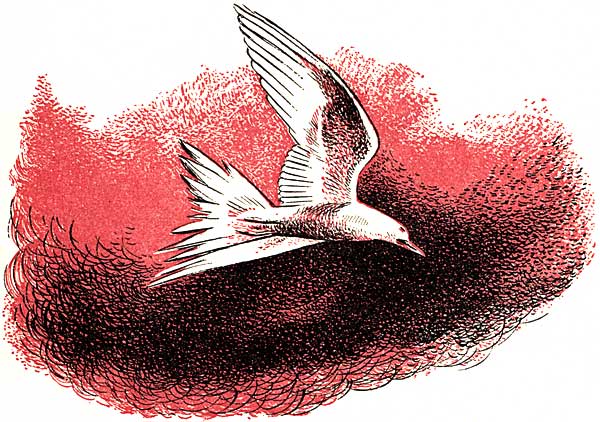
Leave it he must. He stood pondering on what shape to assume, and when he heard the cry of a belated night bird, and saw it coast by on silent wings to vanish in the night, he decided to take that shape. It took all his courage and determination, but this was the first step toward what he had trained for so long to do, and he knew he must do it, and at once. The boy looked a last time around the cabin, then spoke the magic formula in his mind, and, with a sudden enjoyment in the sense of flight, he soared away from the ship out over the cove.
The bird swept twice around the Mirabelle, rising higher as it went. Below, the few lights of the ship had been carefully hooded away from the sea, and the bird, spiraling lightly on air currents, drifted out from land.
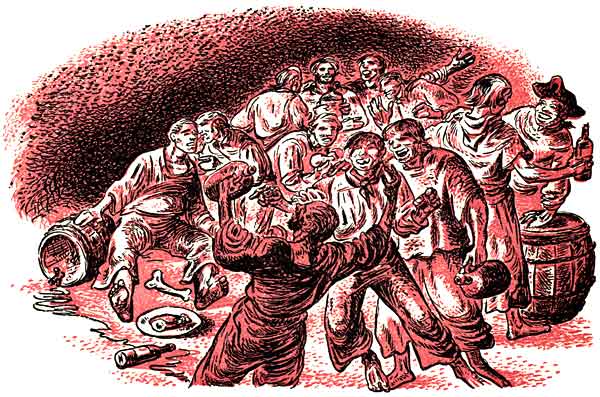
The black bulk of the Vulture was easy to find in the clearness[187] of the night. She was riding at anchor close inshore farther down the coast, and final boatfuls of men were returning from the merchantman carrying the last of the spoils. Sweeping by toward the beach Chris saw that most of the bandit crew were already drunk, shouting and carousing around fires where they roasted wild creatures they had earlier killed. He noticed that a few Tahitians stood apart at the joining of the palm forests and the sand, watching the coarse faces of the drunken men. The Tahitians, fitting so well into the beauty of their island, gold of skin and crowned with flowers, carrying themselves with dignity, were as far removed as could be imagined from the idea of pagan men. They contrasted sharply at that moment with those from "civilization," who in filthy rags of clothes and wild disorder of gestures and voices staggered about[188] aimlessly gorging food and drinking. The watching pagans glanced from the brawling pirates back a short distance down the beach where already a few bodies had been washed ashore from the fight. Their distaste and bewilderment were plain.
Chris soared high above the din and the smoke of the fires, and then seeing Osterbridge Hawsey being rowed back to the Vulture, followed after.
Osterbridge Hawsey had two baskets at his feet. One was filled with carefully chosen fruits, and the other with the exotic flowers of the island. Hastily changing himself into a green parakeet, Chris alighted on the rail of the Vulture just as Osterbridge Hawsey reached the top of the ladder. Determined to make a good impression and perhaps catch Osterbridge's fancy, Chris, in his bright parakeet plumage, bobbed his head and sidled up and down the ship's rail, eyeing Osterbridge Hawsey with his head on one side as he had seen parakeets do.
The maneuver succeeded, for Osterbridge, with a little cry of pleasure, declared himself enchanted.
"I must have that little bird!" he exclaimed, and carefully taking off his fashionable hat—even more out of place in the tropics than it had been on the Georgetown docks—he slapped it quickly over the parakeet which allowed itself to be captured.
This, Osterbridge Hawsey's own prize, made him crow with delight. Clambering as gracefully as possible over the battle-scarred side of the Vulture, he took the parakeet gently out from under his tricorne.
"A parakeet—as I live!" he shrilled, sounding very like a parakeet himself. "My soul—what a prize!" he rattled on,[189] entirely to himself as it turned out, for the sailors were not at all interested in a pet. Exhausted from the battle or drunk from captured wine, and all despising the fastidious ways of Osterbridge Hawsey, they paid not the slightest attention. They obeyed occasional orders from him, for they knew they would be whipped by Claggett Chew if they did not, and so hauled up the baskets of fruits and flowers, dumped them unceremoniously in the Captain's cabin, and left as quickly as they could to rejoin their shipmates on shore.
Holding the parakeet firmly, Osterbridge Hawsey tied a long silk cord to its right leg, fastening the other end to the arm of his chair so that he could closely observe his new pet.
Chris did not disappoint him. As the parakeet, he played the clown for all he was worth. He strutted up and down, and bobbed his head whenever Osterbridge Hawsey spoke, so that it appeared that the brightly feathered bird was in constant agreement with his captor. Or he would cock his head to one side as if weighing one of Osterbridge's remarks, in a truly comical manner.
Looking about meanwhile with his black beady eyes, Chris saw that Claggett Chew was lying in a bunk against one wall, nursing his left leg which had been given a sword thrust in the fight. He was obviously in pain and perhaps feverish, and Osterbridge Hawsey's childish talk irritated and bored him so that he turned his face to the wall. Light from the swinging lamp that Chris remembered from many weeks before threw black hollows into Claggett Chew's eye sockets and deeply lined face. Now and again he could be heard grinding his teeth at the pain of his wound, but Osterbridge Hawsey, throwing his fine coat and plumed hat to one side, lightheartedly[190] amused himself by trying to tempt his new pet with some fruit.
"Claggett!" he cried, as if Claggett Chew could possibly be interested in a parakeet at that point, "do look at what I captured! This is my very own spoils of war!" he crowed.
Claggett Chew made an impolite noise and said nothing. "Well," Osterbridge Hawsey gave a shrug as answer to the noise, "you know how I detest fighting. It is vulgar, messy, and noisy. I can imagine no possible good word to say for it. And I see no reason why you could not have made them give up their cargo without a skirmish. Ugh!" he said, at the remembrance.
"Now, a good gentlemanly fight with a rapier is quite another thing," he went on. He smirked and made a face at the parakeet who did its best to smirk back. "That is a graceful and fine art. Refined, and not at all degrading to one's character."
No sound from Claggett Chew. Osterbridge Hawsey rattled on and Chris, pecking at the fruit proffered him, thought that sometimes Osterbridge Hawsey might quite possibly talk just as gaily to himself as he did to the unresponsive Claggett Chew.
"Claggett—your men!" his voice rose. "Really. They are making an exhibition of themselves on the beach. Just as well there is no one to see but some aborigines. Quite revolting. How can you bear to associate with such types, when you are so much above them yourself—but there, I must not pique you, must I, poor Claggett? I expect your wound smarts a trifle?"
Claggett Chew turned his face toward Osterbridge Hawsey, his eyes blazing with rage and his mouth working with the fretful annoyance of an ill man, but he only muttered and turned away again.[191]
"Do you know," his more delicate friend pursued, stretching out a long finger for the parakeet to perch on, which to his evident pleasure it instantly did, "Do you know, Claggett, this dear little creature seems fearless and almost human? Quite touching."
He paused, admiring the vivid colors of the feathers which perhaps awoke a kindred feeling in Osterbridge Hawsey, loving a fine display as he did.
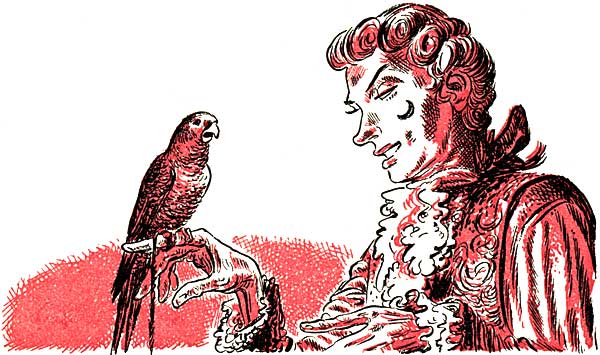
"I shall give you a name, my little feathered captive," he said, and pondered. "I wonder what would be suitable? Something French, undoubtedly." He waved a hand and the lace at his wrist fell forward in a not overly clean frill. "Louis, after the dear king? No—that would be too great an honor for so small a bird, gaudy though you are. I think, 'Monsieur,' after the king's brother. That's it. Little Monsieur." He broke off, dreamily. "To think that I once knew such a royal, such a distinguished man!" He sighed reminiscently.
For the first time words came from Claggett Chew. He bit[192] them off as if the saying of them cost him very great effort.
"More extinguished than distinguished, I would say."
Osterbridge Hawsey permitted a sad condescending smile to cross his face and he shook his finger at Claggett Chew. "Ah, Claggett—you never knew him, you see. I am sure you would have liked him—such charm! So distingué. Oh dear me yes. A most unusual royal personage," Osterbridge Hawsey said, smiling happily at his parakeet. "Most of them are so much alike—"
He singled out several fresh fruits, peeling some for Claggett Chew. Silence fell over the cabin except for Osterbridge Hawsey's delicately smacking lips as he finished the fruit and licked his fingers one by one, the increasingly heavy breathing of Claggett Chew, who fell asleep, and the distant sound of shouts and clamor from the shore. Osterbridge Hawsey made a pouting face at the sleeping figure of Chew; evidently Osterbridge was bored. He went to the door and clapped his hands, but no one responded. Except for the two men and the parakeet, the Vulture was deserted.
Osterbridge Hawsey came back into the cabin holding a bottle of wine which he uncorked and poured into a glass. Chris, foreseeing what would follow, hopped up to the back of his new master's chair where he hoped he would be forgotten, and tucked his head under his wing in case Osterbridge should look at him.
Waiting for the right moment was the hardest thing Chris had to do, but he knew, as Osterbridge Hawsey drank glass after glass and his book fell from his fingers, that the right moment would not be long in coming.

he tropic coolness of the night intensified as the hours advanced. An added freshness swept out from the shore carrying its scent of flowers and earth. The feasting pirates had evidently fallen asleep over their food and empty wine mugs, for they did not return.
With a growing sense of uneasiness, Chris cautiously brought his head out from under his jade-green wing. He had had for the past hour the eerie feeling of being stared at, and he pecked at his scarlet and yellow breast feathers while sending a glance about the cabin.
He knew without having to look, where the source of his uneasiness lay. Claggett Chew had turned on his right side and fixed him with a pale, piercing, and unblinking eye. So fixed, it was, that for a heart-thudding moment Chris imagined his enemy to be dead. But after a longer pause than usual, the pale heavy lids finally blinked, though the unwavering eyes did not move from where Chris was perched, as nonchalantly as he knew how to, on the back of Osterbridge Hawsey's chair.[194]
The intelligence behind the stare was infinitely keen and resourceful. Chris, preening himself in a difficult effort to appear what he was not, knew that if Claggett Chew had not already guessed his disguise, he was certainly more than suspicious.
Hastily, and with increasing starts of fear that sent the blood spurting through his veins, Chris cast about in his mind as to how he could distract Claggett Chew. As a parakeet, he was chained by the tough silk cord that bound his bird's foot. He glanced down. Osterbridge Hawsey's now sleeping head lolled like a child's to one side. Chris eyed the length of the coral silk cord, and then hopped lightly from the back of the chair to Osterbridge Hawsey's shoulder. A blink of his parakeet's eyes, from under their gray lids, showed him that Claggett Chew had him fixed in a penetrating and unwavering stare. In his role as parakeet, he moved sideways up Osterbridge Hawsey's shoulder, making for the shelter that the lolling head would afford to hide him from his enemy's eyes.
As he moved step by step, the parakeet made small low, raucous noises—not loud enough to awaken Osterbridge Hawsey, but enough, he hoped, to make him seem a natural creature to the man who watched him so intently. As he neared Osterbridge Hawsey's neck, seeing the ridge of collar on which he intended to perch, Chris took heart and with a last quick effort, climbed the collar to hide behind Osterbridge Hawsey's head, under the thick cluster of curls tied with what was now a ratty black bow. He was, in this precarious shelter, about to change himself into a fly, when a scraping noise froze him with fear. Looking around Osterbridge's neck he saw that Captain Chew was making desperate efforts to get out of[195] his berth, and had not taken his eyes from the place where he had last seen the parakeet. Chris knew in that moment with what an astute and formidable enemy he was faced. Paralyzed, he remained in his green and red parakeet feathers watching the motions of the injured pirate.
Claggett Chew might be suspicious but he was also a fevered and badly wounded man. From his insecure hiding place, terrified at every sleeping movement from Osterbridge Hawsey, and even more fearful of what Claggett Chew intended, Chris stared out as purposefully as Claggett Chew had only a few moments before.
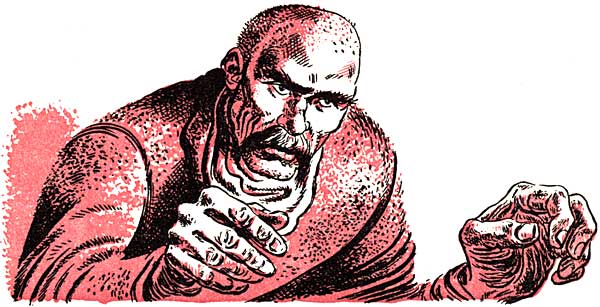
The ashen-faced man across the room in the glare of the hanging lamp heaved and pushed at the sides of the bunk, his eyes brilliant with high fever; the sweat of illness and strain glistening over his bare head and colorless face. He ground his teeth at the sudden, almost intolerable flashes of pain that gripped him when he moved his leg. Still he persevered, grasped at a corner of the bunk and pushed himself upright.[196]
If it was possible for his white face to become paler, some last vestige of color seemed to leave it. Claggett Chew threw up an arm to catch on something to steady himself, swayed and closed his sunken eyes. His arm caught the lamp, which, rocking, threw jet shadows as jagged as its light was harsh. Claggett Chew's prominent broken nose, and the deeply grooved lines running down from it to the thin lips under his mustache, changed the cruelty of his face into a brutal mask. To Chris, he scarcely looked human. He was a picture of all that was heartless and evil. But holding to the edge of his bunk, weakened and ill though he was, the power of his will still ruled his body.
He doesn't know when he's licked, Chris thought, and not knowing—he isn't!
Then, trying to hoist himself upright, Claggett Chew began beckoning and appealing to Osterbridge Hawsey, and Chris shook at the momentary possibility that some noise or word would awaken his sleeping hiding place.
"Osterbridge! Osterbridge!" Claggett Chew cried hoarsely. "Wake up! Hear me!—Fire take your eyes!" he muttered in his rage, "can you not rouse? Osterbridge! Osterbridge!"
But after a slight shift in position, Osterbridge Hawsey slept on. Claggett Chew, his face livid with pain, blood weaving down his chin where he had bitten his lip in an attempt to stifle his groans, managed to push himself up and totter to a chair against which he leaned weakly, calling out again: "Plague your bones! Osterbridge! You sot! Help me—you sleazy fashionable!"
He started across the few feet of floor separating him from his friend, and, stooped though he was to adjust his height to[197] the low-ceilinged cabin, nevertheless his bulk was a terrifying sight as he stumbled and staggered forward. His hairless head nearly scraped the ceiling, and his shoulders were as broad across as those of two men. His hands, white but strong and bony, twitched at the finger ends as if they were unused to idleness without hurting, or without the handle of his whip to grasp.
Two steps forward, Chris saw, was all Claggett Chew needed to show him where the parakeet had gone, snatch him up, and snuff out his life as a candleflame is pinched between finger and thumb. Chris was tearing with his beak at the silk cord on his foot, raking at it between every look he sent towards Claggett Chew. Chris knew that if the pirate touched Osterbridge Hawsey, or worse, fell, the touch or the noise would succeed in awakening the heavily sleeping fop and the parakeet, exposed, would be an easy prey for Claggett Chew.
The Captain of the Vulture, sweat rolling down his tortured face, his eyes starting from their deep-sunk sockets with the strain of keeping himself on his feet, began roaring at Osterbridge once more.
"Osterbridge! Scummy no-good! Wake! That parrot has a scar on his jaw such as I once gave a boy! Osterbridge!" he roared with a final terrible effort.
Then everything happened at once. Osterbridge Hawsey was aroused at last and sat up abruptly, heavy-headed and bleary, thickly asking: "Claggett! What a noise! Cannot a man be allowed to doze in peace? Where are your manners?"
In the same instant, Claggett Chew reached out to pluck the parakeet from behind the sheltering head and neck of "the fashionable." Chris, with a superhuman effort, changed him[198]self to a mouse, tearing his foot from the frayed cord that held it, and leaped into the air. Simultaneously, Claggett Chew, overcome by the approaching blackness he had been fighting, crashed to the floor unconscious.

mouse streaked out the door of the Captain's cabin and did not stop until it reached the farther end of the Vulture, where it hid quaking behind someone's old shoe. The little creature, quieting down at last and feeling its heart regain a more familiar rhythm, sniffed distastefully at the shoe. It was plain to see, it thought, that the Vulture was an untidy, ill-cared-for ship. Old shoes were never left lying about on the Mirabelle.
The thought of the Mirabelle brought Chris's mission on the pirate ship into sharper focus. He glanced up at the sky; there was little time left in which to work safely, for Claggett Chew's sharp eyes had noticed the infinitesimal scar on his cheek and his astute brain had put two and two together. Chris wondered, with a new start of horror, if Claggett Chew could read his thoughts, and if this was why he had stared at him with such intensity.
Well, he shrugged, he knew what had to be done and if he worked quickly, and Claggett Chew's swoon lasted long[200] enough, not even he could stop him. Looking about to make sure he was unobserved, he took his own shape again with a sigh of relief. It was almost like holding one's breath for long periods of time, to be in the shape of a bird or a mouse, but to be himself, he knew, held even greater dangers.
For the first time he opened the leather bag at his neck and felt inside. The first thing his fingers closed on he pulled out. He turned the object in his palm toward the starlight to see what it might be.
It was a folding knife in a case of tortoise shell inlaid with strange signs in silver and mother-of-pearl. Chris opened it—the blade was razor-sharp—and put it experimentally point down on the wood of the deck. As if by itself the blade revolved with immense speed, sinking in so fast that only just in time did Chris snatch it out and hold it more tightly. Trying it out he found that the blade would go through anything, sometimes so easily as to scarcely seem to cut, leaving no trace of a mark, it was so keen. At other times when he pressed on it, the blade whirled around, boring a hole as deep as might be necessary.
What a useful gadget! Chris thought.
This is just what I need and now is the time! he said to himself, and sprang up the nearest of the Vulture's three masts.
What he had to do would take long, and there was little time left that night in which to do it. For he intended slitting the lines of the rigging here and there, not so deeply that they would give way at once and be soon repaired, but so that with the first hard blow the lines would break.
Growing daylight should have warned him long before he was done, for Chris wished also to slit the sails, very slightly,[201] when they had been unfurled and the Vulture was under way. The sound of voices broke his absorption in his task. Looking down from the top of the mainmast where he clung, Chris saw a boatload of returning sailors and realized with a start that it was nearly sunup. In a moment a rat ran down the mast to disappear into the foul-smelling hold of the pirate vessel.
How long must he wait in the hold? Chris wondered. Although he might be in the shape of a rat, it was only his outward form that had changed. He could not eat grain or refuse that was not suitable for a human, and he did not relish having to hold his own in a fight with a true rat, there in the darkness. He contemplated boring a hole in the hull of the Vulture but decided to wait until the ship was under sail. He bitterly regretted not having brought food with him, feeling hungry after his exertions about the ship. There was nothing else for it but to hide as safely as he could in his own shape.
This he did, after a thorough search in his rat form to find what seemed a safe, hidden place high at the top of a pile of the loot stolen from the merchantman. There the exhausted boy, curled closely against any sudden movement of the ship, fell into a sound sleep.
The dip and sway of a sailing ship cutting the seas, and a ravenous appetite, combined to wake Chris. For the first few moments he was confused at where he was. Little or no light seeped into the hold, and he was further troubled by having no idea how long he might have slept.
His first thought was to find food. Climbing down from his sleeping place he felt his way back to the ladder leading up to the deck. The hatch at the top of the ladder was open and[202] through it came a long faded shaft of light and a freshening draught of air. By the quality of the light, Chris judged the time to be well along in the afternoon. He was debating with himself whether or not to change his shape and venture up to find something to eat, when on one of the lower treads of the plank ladder he caught sight of a plate of food.
Chris stood staring at it for a moment. His mouth watered, for he had not eaten in many hours and the sight of meat, bread, and fruit was almost more than he could resist. But resist it he did, for he argued in himself: If this has been put here, it must be for me. If it is for me, it may well be poisoned. I shall not be tempted, much as Claggett Chew would like me to be! He therefore left the plate of food where it was, hoping the rats would find it before long and he would have proof, through their actions, whether or not his theory was right. Then, as a shadow fell over the hatch far above his head, Chris hastily became a fly, soaring up to hit Simon Gosler on the nose.
Crawling in a leisurely fashion on the beggar's hump, he lingered long enough to see what the cripple was about. Simon was looking down the steep ladder, shading his rheumy eyes against the brilliance of the setting sun with one filthy, crooked hand. Chris, crawling nearer, could make out what the old man was muttering under his breath.
"The Cap'n, he say go down an' see, is the food et up, sez he. But 'tis a weary hard way for a pore ol' cripple to hop down thet steep ladder. I'll not do it. He's a sick and fevered man. I shall say it was et up—the rats will have got it before I get to his cabin, in any case, an' then who's to be the wiser? Besides, there's no boy on this ship. What a fancy!"[203] he muttered. "He is an ill man, is Claggett Chew. May his bones rot! I need do no more for him than what I have a mind to, knowing as many of his misdeeds as I do. Hah!" He rubbed his hands with anticipation. "Any day, Simon Gosler could be Cap'n of the good Vulture, an he say the word to the right quarter!" His eyes, no longer hidden behind black patches, narrowed with cunning. "And in the meantime, who gets the best share of the spoils?"
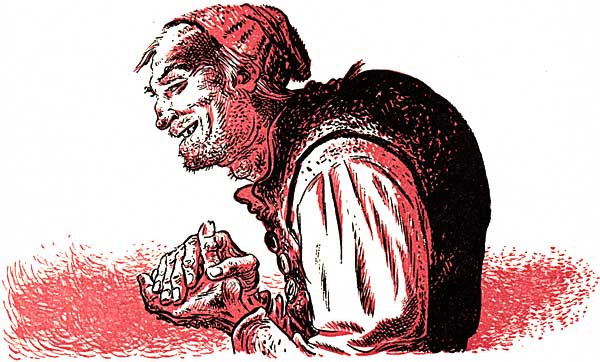
The beggar broke off in a cackle of glee, rubbing his dirty gnarled hands with satisfaction, and turned away to go back to the Captain's cabin with his message.
Chris flew away in the direction of the cook's galley, where as a fly he found it easy enough to eat his fill of meat and what few good things the Vulture afforded.
Refreshed, he flew hard against the wind in order not to be blown off the ship entirely, up to the safety of a part of the[204] rigging from where he could ponder on what he had heard, and see whatever there was to be seen.
Tahiti seemed to have been left far behind, for the Vulture was well out to sea, and no smallest cloud on the horizon gave any hint of distant land. The sailors had set the sails and a good breeze filled the black canvas of the pirate ship. The pirates themselves, still surly from having eaten and drunk too well after the fight of the day before, were quarrelsome and tired and lay about in sprawling groups on the deck far below. Looking aft, Chris saw Simon Gosler hobbling from the Captain's cabin, and Osterbridge Hawsey's graceful, overdressed figure outlined in the doorway. On an impulse, Chris flew down to hear what they were saving.
"I thank you, Gosler, for your message," Osterbridge was saying, "for Captain Chew seems much relieved to have heard it, and I think will now rest quietly and sleep. Who is it, you say, who has some knowledge of medicine—the ship's carpenter?"
Here Osterbridge Hawsey rolled his eyes upward and shrugged his expressive shoulders.
"Dear me! At least to be a sawbones, he has the saw!" he said disdainfully.
"And knows how to drive a nail into a coffin too, master," whined the beggar.
"Enough!" cried Osterbridge in sudden anger. "Fetch him at once, and tell the cook, as you pass the galley, to bring the Captain some plain hot broth! He is much fevered."
The atmosphere seemed right to Chris for all he had to do. Without Claggett Chew's commanding and forbidding presence, the pirates would be in a turmoil. Chris returned to the[205] higher rigging to wait until darkness should be more profound.
It was not long before the tropic night fell, deeply blue in the first hours until the stars should give off their high clear light. As the Vulture rolled and pitched over the sea far down beneath him, Chris clung to the rigging and took the chance of changing himself into his own shape. Then, with all the haste he could, he moved a hundred feet above the hard decks, up the masts and along the sails, setting the new knife gently here and there to part the fibers of the cloth. As he went the lines were touched occasionally in vital spots.
It took long, for it had to be done with care. Chris scarcely made a move without looking down to see whether the sailors might not have glanced up at the dusky full-bellied sails, but they were weary after two such hard-filled days and soon fell asleep on the planks of the open deck. Only Simon Gosler hobbled in and out, watching a sailor here, stealing from another there, lifting his head slowly above the window of the Captain's cabin to spy on what went on inside. Like a dark malevolent spirit, Simon Gosler, crippled in thought and body, moved restlessly about the pirate ship.
Chris completed his task on the sails and rigging and slipped down to hide behind the third mast as he looked out to see where Simon Gosler might be. He could see him nowhere, and holding his breath, stepped over two sleeping pirates sprawled on their backs on the deck to reach the hatch of the hold. He had one last task to perform before leaving the Vulture.
The hatch top was open, laid back as before, and Chris, feeling some danger, changed to a mouse as he crouched on the top rung.
Hesitating, sniffing the fetid air of the hold, he finally ran[206] down the ladder edge. There he sensed imminent death at its foot in time to leap as far as he could as he reached the last few rungs of the ladder. For Simon Gosler stood waiting at the bottom armed with a club, which he brought down with a splintering crash on the wooden crossbars as the mouse ran past and leapt out of sight. Curses instantly filled the hot air like so many wasps. Simon Gosler thrashed around with the club laying it about him on the floor, narrowly missing several times, and yelling at the top of his raucous lungs for companions to help him. In no time figures carrying flaming torches clattered down into the hold and Chris, his own shape regained, knew he would have to be quick as he had never been quick before.
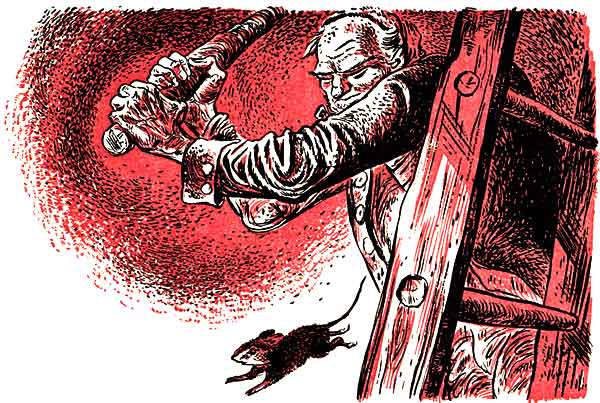
With a flick the new knife was open in his hand and the[207] blade pressed with all his strength against the hull of the Vulture. He was crowded into a corner as far as possible from the advancing row of torches and shouting men. Frantic rats, terrified by the flames of the torches and the reverberating noise, scampered over Chris's feet or ran up over his bending back and shoulders, but he did not move. The blade whirled in the stout wooden side of the Vulture, but it seemed no time before the flicker and wavering red of the nearest torches sent their flares over him from a distance. Chris could make out the silhouette of hunting figures as the first black trickle of sea water pierced through the side of the ship and stained the dry planks. Still the boy pushed the knife on a moment more until the water was a steady spurt, wetting his hand with its coolness. Then, as the torches sent their flames moving into the obscure corner where he had been, a fly soared up and out, over an empty metal plate and four dead rats, over the stooped screaming figure of a humpback, and a scattered line of searching men, out to the freshness of the night and the open sea.
Only Osterbridge Hawsey, curious at the torches and the shouting, looked out the cabin door in time to see a tiny boat scud past, back toward Tahiti. And only in his befuddled dreams did he puzzle over how the small craft could sail against the wind, or wonder how it could sail so well, when it seemed to be made of rope.

hris and Amos lay belly down in a low clump of pine scrub at the top of a precipitous rocky pinnacle. Below them in the blistering noon lay the palace walls of the Lord of the Seven Seas, Descendant of the Sun and the Moon, Overlord of the Mountains and the Plains, Prince of all the Isles, Father of Plenty, and Brilliance-Before-Which-All-Cast-Down-Their-Eyes, the Emperor of China.
The two boys were uninterested in titles. Somewhere within that city-within-a-city, inside the enormous spread of the palace walls that were surrounded in their turn by the city of Peking, lay the goal they had come so far to seek, the Jewel Tree of the Princess of China. Now, like a general planning his campaign, Chris lay looking down at the high angular walls, thinking of how he would gain entry.
On regaining the Mirabelle in a boat made from the magic rope, Chris had reappeared among his friends, "recovered" from his fever. He had given much thought to what he considered would be the last dangerous section of the journey,[209] and after listening to what his master said through the shell, was permitted to take Amos on this stage of the voyage. It was reasoned if something happened to Chris, Amos might be able to carry out their mission by himself.
The boys had come to Peking on camel-back, a camel made from the magic rope. As Amos had never seen a real camel, he thought the rope animal quite natural, and as remarkable a creature as a real one. Chris took care to make it or disentangle it out of Amos's sight, and so many were the strange and wonderful things to be seen, that Amos had no time to concern himself over the reality of a camel.
The arid countryside was blanched by the excessive heat. Flies droned over the dates and figs that the boys pulled from their pockets to eat. Amos wriggled with excitement as he pointed out details to Chris.
"Chris! Look at that procession going in the big gate! All those pigtailed gentlemen dressed in embroidered coats. I like that blue one with butterflies on it. No, I'd sooner have the black satin one with the dragon in red and yellow!" He looked again more closely. "Or the one with the peacock in green and purple. Which would you sooner have?"
Chris paid little attention to Amos's exclamations. Leaning on his elbows and looking at the scene below, his mind worked busily on these last vital problems. But Amos was not waiting for an answer. His mind was on the present moment and the present scene, forgetful of what lay ahead of them, a few hours away. He chattered on.
"I like their funny black hats and droopy mustaches. Why don't they look like us, Chris?" he asked. And then, "Who-all's in the curtained stretcher they're carrying?"[210]
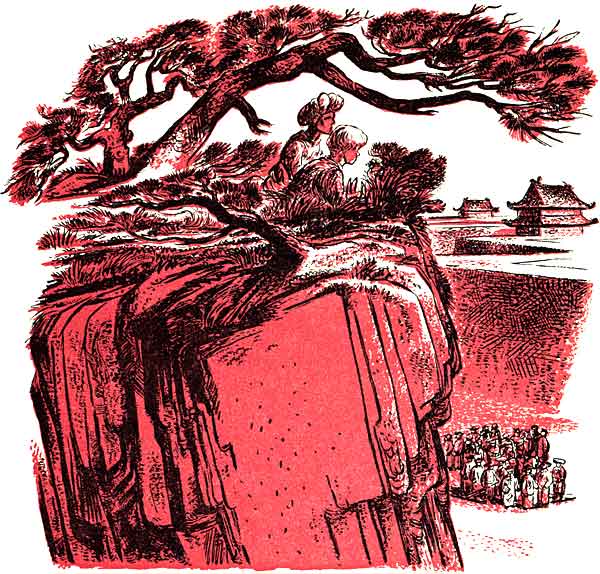
"It's a palanquin, Amos. They carry dignitaries in them."
"Hate to be a dignitary in all this heat," Amos said, unenviously. "What are they doing now?" he enquired, and both boys parted the prickly pine needles to look out and down.
The leader of the procession rapped three times on the great gate with a gold staff. Sentinels and guards came forward, walking on the broad gate top, and after talking with the members of the procession, turned to give an order.[211]
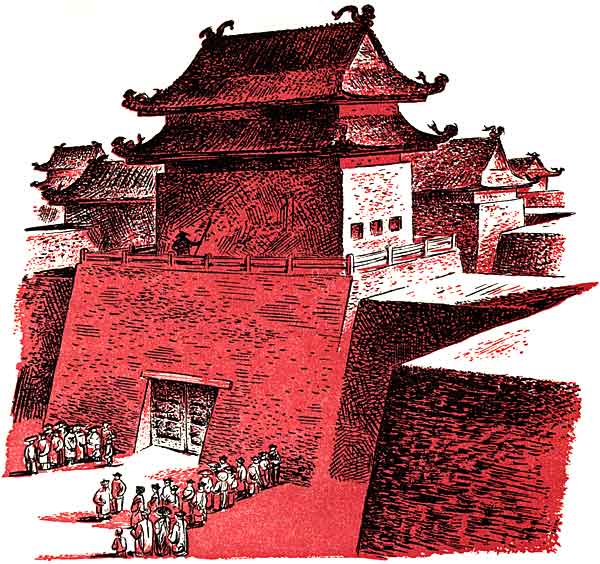
Gaily dressed trumpeters with dragon masks on the visors of their helmets raised long brass trumpets. A prolonged throbbing "Wai! Wo!" shuddered out, and the great outer gates of the palace, studded with pronged spikes of carved metal, swung slowly outward. Sixteen men came into sight, eight on either side, pushing wide the gates.
"Gee! Imagine the weight of those doors!" Chris murmured, and taking out his spyglass looked through it. "Golly Moses!" he exclaimed. "Take a look, Amos. Those gates are made of[212] bronze, nearly three feet thick! And now they have the gates open, look at the depth of the walls. They're as deep through as a room!"
The waiting procession, the richly dressed courtiers and curtained palanquin, moved inside and the gates were slowly pulled close by lines of men dragging at ropes and chains to shut them. From within the main gate drifted out the sound, becoming fainter and fainter, of other trumpets sounding the order for the opening of other gates. Ten times, the boys counted, the trumpets blew, and the same "Wai! Wo!" throbbed against the sultry air.
"Lawsy me!" Amos sighed, when no more trumpets were to be heard. "Ten walls and ten gates—at the very least! 'Course we don't know—" He rolled his worried eyes toward Chris, "We don't know whether those folks got to the Emperor or not. Likely he's in behind a couple more walls, just to be on the safe side." He searched his friend's face. "How are we going past all that many guards and trumpets, Chris? Even if we could tie up a guard or two, how in the world we going to push open gates that heavy?"
Amos need not have been so concerned, for Chris had a good plan. But just at that moment the heat overcame Chris. Putting his head down on his arms, he slept.
Amos slept too, and it must have been several hours later that the rising sound of a crowd talking and laughing with excitement penetrated their sleep and brought them to consciousness. For a moment they both lay rubbing their eyes and peering out. Then they realized, by the growing crowd on either side of the palace gate and along the narrow street lead[213]ing away from it, that someone of importance was about to come from the palace and parade through the streets of Peking.
"Wonder what goes on?" Chris muttered, as the crowds below swelled and grew. Boys climbed upon one another's shoulders, teakwood stools were brought for the richer people to stand on, and along the street that led away to the right around the palace walls, Chris and Amos could see embroidered silks hung from all the windows, and Chinese people in their best holiday clothes laughing excitedly. All were looking toward the gates, and at last, from far within, even more distantly than before, came the first sound of trumpets. These had a sweeter, clearer sound than those the boys had heard at noon.
"Never heard a sweeter note," Amos said. "Might be made of silver, 'way they sound."
The boys counted, and twelve times the low, lovely notes swung out on the air.
"Twelve gates!" Chris said to Amos, "And look, you were right, they are silver trumpets!"
The trumpeters atop the great outer gates were now differently dressed, and there were not two but a dozen lined along the deep palace walls. The trumpets, ten feet long, were curved, and of silver that in the sunlight dazzled the eye. As they were blown, the final gates were pushed aside.
A long procession emerged of such fantasy and variety of color that the two boys were spellbound. Elephants and camels, llamas and horses, all richly caparisoned in Eastern silks, passed along with their riders. Guards with curved swords and many-thonged whips formed a double hedge between those in the procession and the bystanders. Still others led leopards and[214] black panthers on chains as an added protection to those they guarded. Palanquin after palanquin passed by, but still the crowd seemed to be waiting for something.
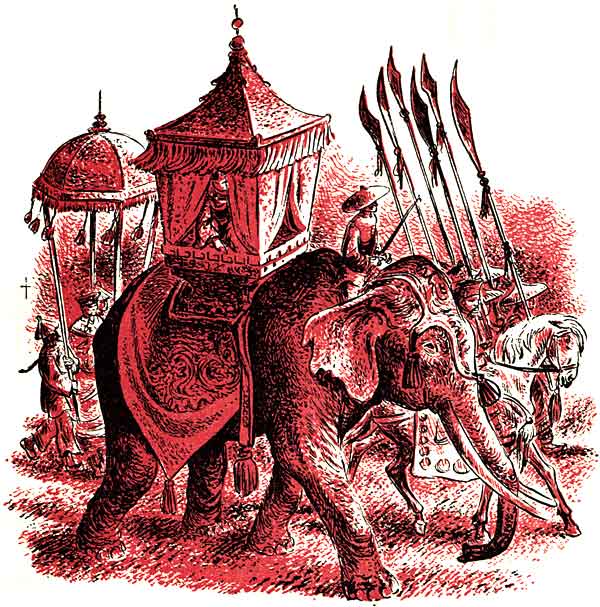
Then, as the silver trumpets continued their sweet lingering notes, a murmur arose from the crowd. Four lines of youths preceded a palanquin more finely decked than the rest, and the murmur rose. After it came four lines of Chinese girls, fanning the air with peacock fans on long staves, fans of white egret feathers, and ostrich plumes dyed a yellow gold.[215]
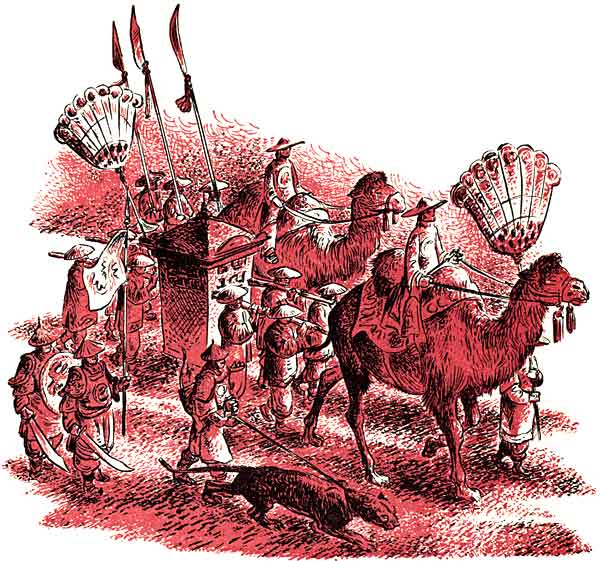
"Amos!" Chris breathed, "That color! Yellow is the royal color of China!"
He did not have to elaborate his thought, for the palanquin that finally came in sight showed by its richness that it could belong only to royalty, and by its beauty and grace, only to a woman. Made of silver and rock crystal, studded with diamonds and pearls, and hung about with sheer curtains of embroidered yellow silk, the palanquin belonged without doubt to a young girl of the royal house. As it appeared under the[216] high arch of the outer gate, a roar of joy and greeting arose from the waiting crowd and with one accord every man bowed low, covering his eyes with the wide sleeve of his left arm. The women and girls in the crowd, and those leaning from the upper stories of the houses, threw down before the palanquin objects that flashed and twinkled in the sun.
Remembering in time, for he had been so much absorbed he had momentarily forgotten it, Chris whipped out his spyglass and looked at the curtains of the palanquin. The thin silk was transparent enough under the strong focus of the glass, and behind it Chris could perceive, leaning delicately against silk cushions, a Chinese girl as beautiful as a dream. Her slightly uptilted eyes were large and dark, her skin put a magnolia flower to shame, her mouth was lifted in a charming smile, and her long exquisite fingers held a spray of jeweled flowers. All about the palanquin rained a shower of jeweled buds and petals, for no doubt a real flower was thought too inferior for the only child of the Descendant of the Sun and the Moon, Prince of all the Isles, and Lord of the Seven Seas, the Princess of China.

hris put down his spyglass and the two boys, hidden on the piny knoll, watched the procession out of sight.
"I'm supposed to take something from her," Chris said with his eyes sparkling, "but I know now what I'm going to give her back in return. I feel sort of sorry for that girl," he added thoughtfully.
"What're we going to do, Chris?" Amos wanted to know. "What-all comes next, and have we some more of those dates?"
Chris passed him some. "We have to wait until dusk anyway," he said, his voice abstracted, "and by the look of the light that won't be long."
The piny knoll was steep and rocky and only two adventurous boys would ever have reached the top. Too precipitous on which to build houses, it rose far above the surrounding roofs of Peking. The green and scarlet of curved tiles spread under the boys' sight like a curling sea. Before them, stretched out in long angular wings to right and left, swept the palace walls.[218]
Listening and watching, the boys gathered by the silver trumpet notes that the Princess and her retinue had re-entered the palace walls by another gate.
Thinking about it Chris mused: I wonder if that first palanquin held someone she's to marry? It could be. And if so, this may be her last appearance to the people of the city before leaving for a new domain. She would probably take the Jewel Tree with her. I can't imagine a woman leaving a thing like that behind. He paused, remembering. She held a spray of jeweled flowers in her hand, maybe off the Tree, and I never saw anything like it. Well, can't do a thing until dusk comes down.
The evening was not long in coming, and Chris, who had been sitting cross-legged under the little crooked pines, looked across with great concern to where Amos lay on his back, dozing.
I can't take him along, Chris thought, and I can't leave him alone, if I should get caught. What in the world do I do?
Then, remembering the bag of magic "odds and ends," Chris put his hand inside it and drew out a small folded piece of silk and netting. On it a piece of paper, like a label, showed Mr. Wicker's fine script. Chris looked closer and read: "Strike 3."
"Strike 3."
Chris held the folded object in his hand, and then glanced at Amos. Amos slept. Going softly out of the pine grove to a narrow ledge of rock where he was out of sight, Chris put the object down and said: "Strike three."
Nothing happened. The object remained an object. Then, suddenly understanding, Chris struck the stone ledge three times.
At once the folded object began to unfold itself and to puff[219] itself up like a little mushroom. In a matter of seconds, Chris could see what it was becoming, and before he could wink ten times, a balloon with a basket hanging from it, quite big enough for two boys, hung swaying in the air. Chris examined it with pleasure and then struck the ground three times again. The balloon gently collapsed and refolded itself, basket and all, into its original neat shape.
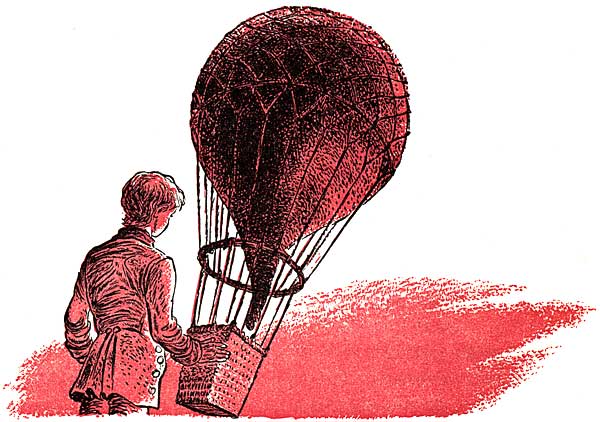
"Now, if that isn't handy!" Chris exclaimed. Then, looking at the light fading from the sky, he picked up the folded balloon and went to waken Amos.
"Amos!" he said, shaking his friend's shoulder, "it's time for me to go. Are you awake?"
Amos blinked a few times and said he thought so.[220]
"Then listen to me," Chris told him earnestly, "and listen hard!" Amos sat up more alertly.
"I have a handy thing here which is for you to use only—do you hear? only if I don't come back."
Amos's eyes began to get brighter and he swallowed.
"Don't come back? Law! Chris, don't you leave me in this heathen country where nobody understands good English!" he cried. "Why, unless I'd steal, and Miss Becky told me never to do that—but unless I did, how could I eat in these foreign parts?"
Chris sat back on his haunches. "Well, I don't know how you could, myself. But don't you cross any bridges until you come to them. Look." He held out the folded balloon. "If I'm not back by two sunups from now—I may have to hide all during tomorrow—if I'm not back by then, put this package out beyond the trees in the clearing. That's very important. You've got that?"
"I haven't got anything but a few old dried-up fruits," Amos pouted. "That's all."
"No, Amos!" Chris gave him another rousing shake. "I mean, do you understand that much?"
Amos brightened at once and broke into a broad grin.
"Oh yes, of course. Why didn't you say so in the first place? You said, put the package out in the clear. Where's that, on this tippy-top of a hill?" Amos asked, looking about.
"The ledge near where we climbed up. That's big enough," Chris reminded him.
"Oh yes," Amos said, looking wise.
"Well," Chris took up again, "you put the package on the ledge and strike the ground three times—"[221]
"Like this?" And before Chris could stop him, Amos had struck the earth beside him twice before Chris seized his hand in mid-air.
"Amos! Not now! I said only if you have to get away. If someone comes after you, or if I don't come back. Promise me not to strike three at all except for either of those two reasons."
Amos raised his right hand looking very solemn. "I promise," he said. "Only," he added, looking bewildered and already somewhat forlorn, "what happens when I do hit three times?"
"Why, it's a mag—it's a special kind of balloon," Chris began, after correcting what had almost been a bad slip.
"A what?" Amos stuck his head forward, trying hard to understand.
"A balloon. Oh."
Chris stopped and stared at Amos. Perhaps balloons had not yet been invented. How very confusing!
"It's something that will hold you up in the air. There's a basket for you to sit in—"
"No sir!" Amos cried, wagging his head decisively from side to side. "Me in the air over the roofs and high up? No indeedy, Chris! Not me."
Chris was becoming exasperated. He had important things to do.
"Look, Amos. If you have to use it, you'll be in such a bad fix that being up in the air will seem like the very best thing that could happen. Stop running. I'll be back—I hope."
He turned away toward the ledge and clearing.
"And now, wish me luck, and stay here and wait for me. Don't follow me now, or watch, or I might fail."
Amos jumped up from the pine-covered ground. "Oh,[222] Chris!" he cried, his voice sharp with distress, "can't I go? You might get hurt. There's no telling what could happen if you're all alone!"
Chris was tempted to take his friend with him but someone must get the news back to the Mirabelle if he should fail. If this happened, he did not doubt but that the magic balloon would carry Amos safely to the ship.
"No," he said after a long moment. "Better not. But I'd sure like to, Amos. Now don't lose that package. It's your escape. Wish me luck."
Amos clasped his hand, and then, rushing off, dashed back again.
"Here, Chris. Our fruits. Better not to eat strange food in this foreigny place. Good luck," he added.
Chris stuffed the dried fruit in his pocket. Amos turned back into the darkening pine knoll, and Chris pushed his way out to the narrow steep ledge, hanging high above the roofs of Peking.
Chris uncoiled the magic rope from around his waist, and standing as far out on the rock ledge as he dared, in order to have the greatest possible freedom of movement, he attempted for the first time to draw an eagle in the air with the rope. It was a complicated, fast maneuver. The rope twisted and whipped in the air, and the result was a molted-looking, droop-tailed buzzard. Its wings were not wide enough, its back very insecure to look at. In short, Chris knew, it was a total failure.
He tried again, racing against the oncoming darkness, and this time he succeeded, although, when he pulled it close and straddled the body of the magic bird, his heart was in his[223] throat that it might unfurl itself, become just a rope, and hurl him to his death far below.
But this second eagle seemed secure enough. Chris pressed his hands on the wings spread out on either side, with a jolt they flapped, and the boy's strange conveyance moved somewhat unsteadily through the air.
Chris, frightened but resolute, found that by touching the head of the bird in the direction he wanted to go, the magic eagle would turn, and after a few moments to test out his new method of travel, Chris coasted over the gaily tiled roofs as he hunted for something.
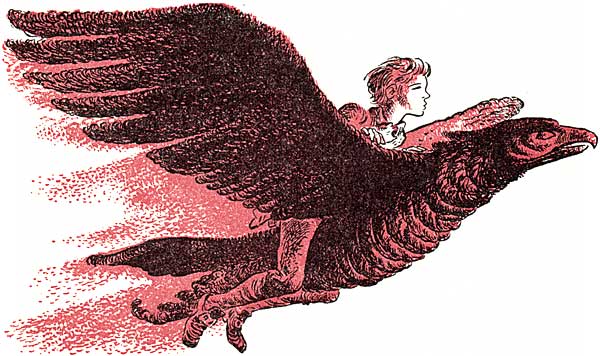
Peking at that time had many palaces. Wealthy Chinese and people of title and family owned beautiful houses set in terraced gardens surrounded by parks and ancient trees. Somewhere, Chris had heard of this and remembered it, and now in the[224] dusk that was nearly night, the eagle carried him silently over the city as he looked for what he wanted to find.
At last the very fragrance, rising up toward him on the night air, guided him to a large palace set in gardens. Pools of water reflected the first stars among their lilypads. The shaded walks and lawns were deserted at that hour.
Swooping down and flying back and forth to make sure he would not be seen, Chris grounded the eagle, and holding fast to one wing tip in case he should have to take off in a hurry, he walked up and down, examining and searching.

he night was too clear to suit Chris for the dangerous work that lay ahead. The eagle bore him up again from the garden, and turning back, lifted high in the air as it neared the maze of walls of the Emperor's palace.
Chris longed to fly lower but he was afraid that one of the many guards might give the alarm. The eagle flying between the palace and the moon cast a quick-racing shadow over wall and ground. The one advantage on such a clear night, Chris thought, when he could be easily spotted, was in the silence of the magic bird. He bent over to peer down between the eagle's beaked head and widespread, beating wings.
Wall after wall, palace and garden within palace and garden, he saw. Windows were lit like fireflies far below him and the series of courtyards opened themselves in seemingly endless duplication. How, he wondered, could he ever find the inner garden—well hidden, certainly—where the Princess of China walked under trees and looked at her goldfish in long clear pools? Then he remembered with a start the folded paper[226] seized so long ago in a ship anchored on the Potomac. A cabin under a smoking lamp, the strong scent of flowers, a monkey's form, came back into his memory and he felt in the leather pouch for Claggett Chew's plan.
His fingers touched it and brought out the creased, finger-marked scrap of paper. In the moonlight he unfolded it, sitting on the eagle's back high above the walls and palaces of the Emperor of China. He found that he could follow, from his height, and check with the map, building by building and one courtyard after another. Moving cautiously forward in the air, he looked at the heavy cross-mark made by Claggett Chew the night the Mirabelle had set sail. Then, all at once beneath him, Chris made out walls ahead that seemed higher than the others. He flew over temples with gently rocking bells hung at their curled eaves, and over peaked rooftops of carved stone until, reaching a place apparently identical with the cross on the map, he dared to drop a little lower above a certain courtyard.
As he did so he saw that the guardhouses were set about on the top of the wall, which measured about ten feet from side to side. All faced outward away from the gardens they protected, hidden now in shadow.
Why—it's like a prison! Chris thought, except that the guards aren't allowed to look down at her. The poor kid! Imagine living here all your days! No wonder she was pleased at being in a procession yesterday!
No fragrance, except that of cool water, came up from the courtyard to Chris. Going higher into the air he hovered there on his eagle's back, watching the guardhouses. He timed the guards, counting. After an hour, he found there were two[227] minutes between the time Guard Number Six reached his post and Guard Number Seven went back to replace him. Chris waited again, watching the guards and counting half aloud in case he missed that two-minute interval.
"One—there he goes across to Two. Two. There Two goes back again. Three—there Three marches along to Guardhouse Four. Four—there he goes to Five—"
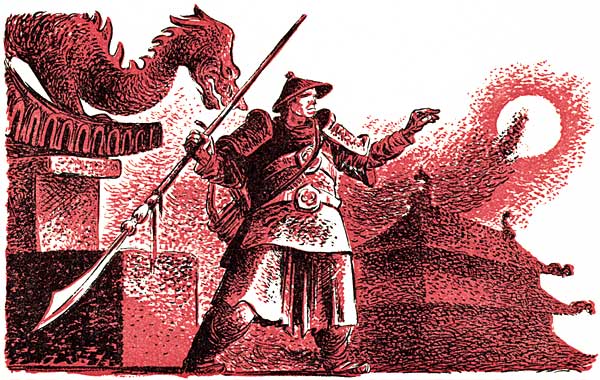
Chris's breath came quickly and his heart began to pound in his ears. "Five—Five starts out toward Six. Six—and now they change swords or something, and here I go!"
Pressing on the back of the eagle the bird sank silently into the black well of the courtyard, past the guardhouse and down, just as Guard Number Seven emerged to walk back to replace Number Six.
The walls of the Princess's courtyard were indeed as high and forbidding as those of a dungeon. A shimmer of water[228] reflected the night sky, and looking down, Chris saw a dark, glistening mass beneath him. It seemed to be trees, but when his dangling legs touched them, sharp edges cut his legs and he quickly veered away. At last, coming down at the edge of the pool, his eyes became used to the gloom and he could see about him.
The garden ground crunched under his feet and glowed in the night, and bending to touch it, Chris's fingertip came away dusted with gold, "Golly Moses!" he breathed, and looked about.
The edge of the long rectangular pool was of silver; the walk around it of jasper and chalcedony, and as he lifted his eyes to look farther, he saw that the entire garden was made up of trees with jewel leaves.
No wonder the leaves cut my legs! Chris thought to himself. They're probably emeralds!
Towing the eagle by its beak, he wandered about. There was neither grass nor flowers; no true plants or trees. All bushes, borders, and shaded walks were of jewels. They gave out onto the air no scent of greenness and no welcoming scent of flowers.
Gee! Chris almost said aloud, Who'd want to play on ground-up gold? Why, except that it's yellow it might as well be gravel. And no trees—not real ones. Gee! She must be a pretty miserable girl! I wonder if birds like the jewel trees?
Looking into shrubs of coral, or jade, or amethyst, Chris found no nests, and shook his head. Guess I brought the right replacement after all, he decided. Now to work. Which shall I take?
He made a tour of the jewel gardens, and at the end of the[229] pool, facing the carved jeweled doorway and windows of a pavilion set into the surrounding walls, Chris found a tree he thought right. Small and round, as if freshly trimmed, it answered Mr. Wicker's description of months ago.
"Leaves of emeralds, buds of diamonds, flowers of sapphires, and fruits of rubies studded thick with pearls."
Taking out his magic knife, in a second Chris had cut away a large circle of earth in a tub shape to shelter the roots, and carried his heavy burden to the eagle's back. There, he took off something which he planted where the Jewel Tree had been, and cupping his hands, watered it from the pool as best he could.
Just as he finished and was moving away, a movement in the black rectangle of the pavilion door at the far end of the garden caught his eye. He had only time enough to pull the eagle, the Jewel Tree, and himself into the cloaking shadow of a nearby avenue of emerald trees to avoid being seen.
The movement was pale and slight against the blackness of the open door, and the night was very still. As Chris held his breath, the dampened leaves and petals of the bush he had planted sent their green fragrance lifting and turning on the night air. As if that had been the signal it had long waited for, a dust-colored bird flew down to perch on a thorny stem.
It was a nightingale. Its song started slowly and softly at first, and then, as it forgot that it was alone, the lovely variations grew, pealing out where no birdsong had ever been heard before. Chris was not the only one who had never heard a nightingale. To the other occupant of the jeweled garden, it was newer and more beautiful than anything she had ever heard.[230]
The Princess's tiny feet made no sound on the gold gravel as she edged nearer to the bush and the song. At last the nightingale flew away, and the scent of the roses, drifting toward a princess who had only been permitted flowers of stone, was overwhelming. She went up and broke off a flower as red as a ruby and as red as her mouth. As red, too, as her blood, for a thorn stabbed her and she nearly dropped the rose with a soft cry. But the wonder of it was stronger than the pain, and she buried her face in the freshness of the red rose, the first flower she had ever seen.
Behind her, rising gently and quietly out of sight, was a smiling boy and a tree of jewels she would never miss.

hris's thoughts were so taken up with the pleasure of the little Chinese Princess at her first rose that he had miscalculated. As a matter of fact he had forgotten about the guards in his excitement at holding the Jewel Tree and at getting away, and just as the eagle rose to the top of the wall, one of the guards saw him.
Had it been earlier, Chris could have risen quickly out of sight. But the Jewel Tree was heavy in itself; the earth holding its roots was an additional weight, so that the eagle only rose half as quickly as it had before.
The guard gave a shout, and a spear whistled past Chris's ear. Instantly the flames of bonfires spurted on all the walls, and to his terror Chris found himself in a glare of light as powerful as modern searchlights. He clutched the Jewel Tree, urging the magic bird up, but there are limits even to magic and the bird was moving at the peak of its ability. Black racing figures darted along the walls, the flames of the watchfires leapt higher in the air, and now arrows were singing their[232] keening note of death about the boy lifting so slowly into the night.
Chris, crouching behind the Jewel Tree, was rocked and nearly unseated from the eagle when an arrow hit the earth around the Tree roots, imbedding itself deeply and quivering there at an angle. The shouts and confusion grew, but after a few terror-stricken moments Chris knew he was high enough to be out of danger. He gave a deep shuddering sigh of relief, and turned the head of the laboring eagle toward the city. His thoughts were on escape, but first he had a duty that as an honorable person he felt bound to perform.
He was naturally observant; he had also made a point of noticing landmarks, so that he found the garden from which he had taken the rosebush without too much trouble. What he was totally unprepared for was that the entire city of Peking, aroused by the watchfires on the palace walls, was awake and in alarm, and the light of flares and lanterns glowed from every house.
Nevertheless, to replace the rosebush was an honorable necessity, and in spite of wide canary-yellow blocks streaming from the windows of the lesser palace and falling in broad sections over the lawns and far into the gardens, Chris came down as much in the shadow of trees as he could, and breaking off a sprig of the Jewel Tree, stuck it in the ground where the rosebush had been. Then quickly regaining the eagle's back, he was lifted into the air and up over the roofs.
What was his consternation, however, on nearing the pine knoll, to see the whole group of scrubby trees aflame, and no sign of Amos! The pine needles and tree trunks thick with resin burnt fiercely. Chris did not dare to come too close. Not[233] only was the heat intense but the crowds collecting below looked upward to watch in a puzzled way, while others ran from near the palace gates to gaze and speculate.
Chris turned sadly away, large tears for Amos running down his cheeks, his heart constricted and his eyes half blinded, when from a great distance, he heard a trailing call.
"Oo-h Chris! You—Chris!"
Chris's heart leapt up, and wiping his eyes clear he looked in the direction of the sound. A balloon was moving rapidly away over the peaked curved roofs of Peking, careening slightly from side to side as it sailed on the night breeze. By the time Chris had caught up with Amos in the balloon, Peking lay far behind them.
Holding on to the edge of the basket, Chris blurted out: "What in the world goes on, Amos? I thought you were burned alive! I was never more scared in my life!"
Amos's eyes, wider than ever from the excitement of events, batted at Chris. "You're scared! What do you think I am? Get me out of this—I never did want to be up in the air nohow, and I want out now!"
"But what about the fire, Amos?" Chris persisted, holding to the Jewel Tree with one hand and the balloon basket with the other. "How did you get out?"
Amos sent a squeamish glance out of the corner of one eye at the moving ground beneath them, and then, realizing that they were on their way back to the Mirabelle, swallowed and began to talk.
"I waited, like you said, an' I guess I fell asleep. All at once such a noise, and flames flashing, woke me up, and right away, seeing fires and commotion all over the palace walls, I supposed[234] they had spotted you somehow. I thought—should another fire break out somewhere else, it might pull the crowds away from the palace, or make them think something was goin' on up there. So I lit a fire with my flint, and then ran right quick with the package to the ledge, struck three times, and shut my eyes"—here Amos covered his eyes with one hand—"and got in. And this silly thing's been a-tippin' and a-teeterin' ever since."
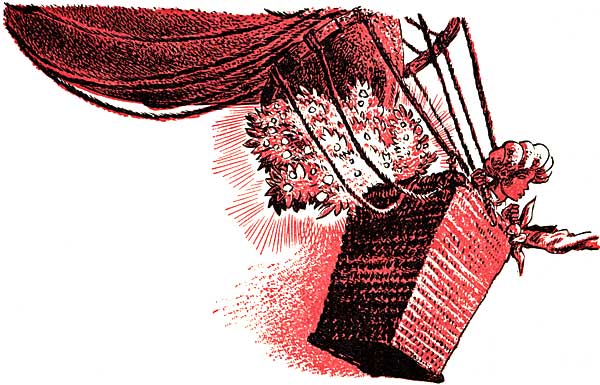
Chris brought balloon and eagle down into a rice field, and the two boys transferred the Jewel Tree to the greater safety of the balloon basket. Amos, having the wonderful Jewel Tree to guard, forgot his fears and sat down beside it, where he soon fell asleep. Chris, tying the tail of the eagle to the side of the basket with his shirt, towed Amos and the Jewel Tree through the air all that night and all the next day. They[235] came down at noon in a deserted part of the country so that Chris could sleep and rest, and Amos find fresh water for the leathern bottles they had strapped to their waists. Then they went on until they saw the sea and the wavering line of the coast below and ahead of them.
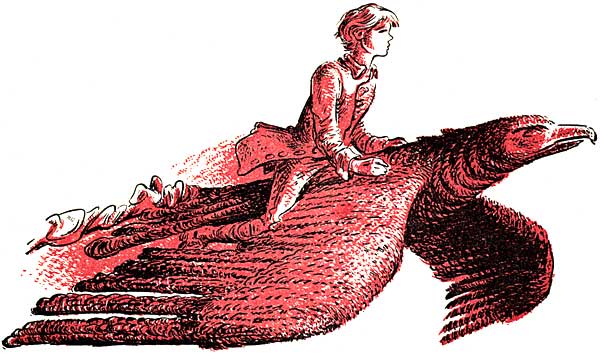
The eagle and balloon came gently down at dusk. The balloon was folded into its small size and put back in the pouch around Chris's neck. Out of sight of Amos, Chris transformed the eagle to a boat in which, in the dark of the night, the two boys reached the side of the Mirabelle with their precious cargo. The sailors of the Mirabelle were asleep, but Chris roused the Captain, who helped them secretly carry the Jewel Tree to a corner of his cabin.
All hands were then called on deck and everything was hurry and bustle. Before dawn had broken, the Mirabelle had left the coast of China and was well out to sea.

t was not until Chris, relieved, proud and happy at the success of his mission, opened his sea chest and took out the shell that he had the faintest vibration of trouble or danger. Until then he had lived, breathed, and thought only of obtaining the Jewel Tree, and once that had been accomplished, he felt that his anxieties were over.
However, as he shut and locked the cabin door behind him, feeling with an increased zest the surge and rock of the Mirabelle under his feet as she plunged through the sea, something brought him up short and took the glow from his face. Slowly, and with a grave expression, Chris went to his sea chest and took the shell from it, but he almost knew before he heard it what Mr. Wicker would say.
Nevertheless, when through the whorls of the shell at his ear he heard the familiar voice, so far away and so long unheard, his eyes lit up again.
"You have done better than my fondest hopes, Christopher, my boy," came Mr. Wicker's voice. "I cannot commend you[237] enough for the success of your difficult journey, and the manner in which with courage, quick wit, and fortitude you met every danger. Amos is much to be praised too. He is a loyal friend and I am proud of him as well as of you."
Chris, kneeling by the brass-studded chest with the shell held to his ear, could easily bring before his inner eye the cosy room in Georgetown, the crackling logs upon the hearth, and the voice of Becky Boozer raised in lusty song coming from the direction of the kitchen.
He missed it. Much as he loved the Mirabelle, and much as he prized the friendship of all aboard her, still, Mr. Wicker and Becky held an especial place in his heart and he longed all at once, with almost intolerable sharpness, to be at home once more. That his mother was getting better he had never doubted, but kneeling there alone, he suddenly wanted to have done with adventure for a while.
"My boy—are you listening?" came Mr. Wicker's words, and Chris's thoughts brought him back with a jolt to the cabin of a ship sailing the China seas. "Christopher, my poor lad," Mr. Wicker said at his ear, "had you forgotten the Vulture?
"No," he answered for the boy, "not altogether, but perhaps just a little. Yet make no mistake—the Captain of the Vulture has not forgotten you. Nor is he under any misapprehension as to who it was who so skillfully crippled his ship so that he did not reach Peking before you."
Mr. Wicker's voice took on the edge it always held when he spoke of Claggett Chew.
"Claggett Chew waits for you beyond Shanghai in the East China Sea. Be wary, and be rested, Christopher, for you will have a battle such as you have never dreamed of, and even I[238] cannot tell how it will end. It will depend on your quickness and ingenuity. And do not forget the leather pouch!"
The voice of his friend hesitated, and then said so faintly and from so far that it was all Chris could do to hear it: "I repeat, be wary, Christopher. He will do everything in his power—"
The voice faded away, and Chris with heavy gestures replaced the shell, shut the lid of his sea chest, and unlocking the door, went with dragging feet to tell Captain Blizzard of what awaited them.
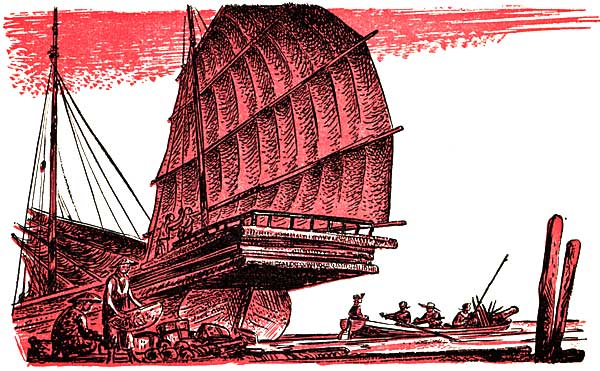
The wind was only moderately fair so that the Mirabelle took some time passing beyond the Yellow Sea. During those days Chris practised his magic with more concentration than ever before. He rested and slept, ate hugely, and exercised by climbing up the masts of the Mirabelle, so that by the time a[239] long dark line was sighted on their starboard side on the Chinese coast and the approach to Shanghai, Chris was fit and well as he had never been before.
Warned by Chris in time, Captain Blizzard, on hearing of the dangers ahead, had determined to put into port at Shanghai, and there, with much haggling and bargaining, bought four cannons and ammunition. He also laid in a store of swords, daggers, and assorted weapons for all on board.
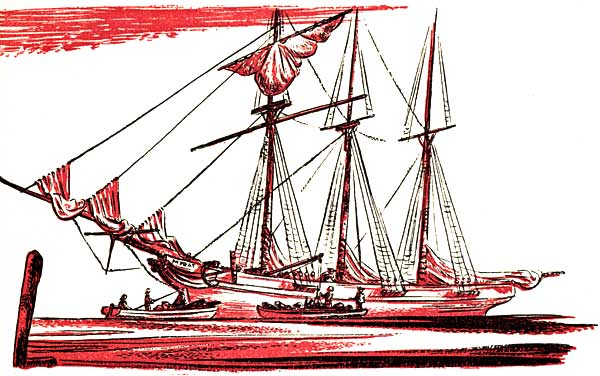
Believing that an ounce of prevention was better than a pound of cure, the worthy captain drilled all hands on the Mirabelle twice a day thereafter. This, the weather being fair and the ship needing only the helmsman and a lookout to care for her, the sailors were quite willing to do. More especially when their captain, in whom they had unbounded faith, told them he had good reason to believe they would have a nasty,[240] and perhaps disastrous, encounter with the pirate ship during which they bid fair to be bested if they did not bestir themselves and prepare for it.
The men entered into the training with gusto. They made dummies which were hung on ropes and maneuvered by their friends, braced in the rigging. The dummies were suddenly swung out and down in every direction, in imitation of pirates boarding the ship, and were fallen upon by the sailors of the Mirabelle with roars of glee as if they were at that very moment being tackled by the pirate crew. Then they practised fast turning and tacking of the ship, and even in between the regular hours set aside by the Captain for what he termed "fighting time," several groups of men could always be seen on some part of the deck practising dueling with sword and dagger. In short, long before the Mirabelle reached the East China Sea, its crew had become proficient in all manner of hand-to-hand fighting.
The Mirabelle was level with the Ryukyu Islands on a gusty, glary day when the lookout's long-drawn-out cry floated down from the crow's-nest to those sailors who were engaged in a mock fight on deck.
"Sail—ho-oo!"
Instantly every man was at the ship's side, shading his eyes against the dazzle that made a brassy light over sea and sky. The Ryukyu Islands, off the port beam, were not visible in the metallic haze that grew as the sun arched higher. The fitful wind gave promise of stopping altogether and leaving both ships becalmed.
Chris, on the bridge beside the Captain, stood looking through his spyglass at the advancing sail. Captain Blizzard lowered his own glass to turn enquiringly to Chris.[241]
"Yes," the boy said at last, "I'm sure now. I ought to know those sails. They're unmistakable. That is the Vulture, sir."
Captain Blizzard wheeled about before the last word had left Chris's lips, and bellowed at the top of his lungs.
"All hands on deck!" he roared. "Man the guns! Bring out the ammunition, and every man to his place!"
The training the men had gone through instantly asserted itself. Although there was a great deal of running about, up and down the ladder to the hold, and of handing up the heavy ammunition, all was orderly, and not an extra word was spoken.
There was little enough time left over, however. The Vulture approached rapidly and then crossed the bow of the Mirabelle so narrowly that the Mirabelle had to put hard about and Captain Blizzard roared orders to take in sail in order not to smash into the pirate vessel before it had been carried by the breeze beyond its prey.
This maneuver by Claggett Chew momentarily threw the Mirabelle's crew into confusion and turned their attention to the hasty management of their ship. To Chris, working with the men at whatever was most urgent, it seemed only an instant before the Vulture was again alongside the Mirabelle, and Claggett Chew stood on the gunwale hailing them.
"Heave-to, or you shall sink to the sharks!" he cried.
"Look to yourself, pirate!" Captain Blizzard thundered in reply, and giving the signal, the unsuspected guns of the Mirabelle belched out their deadly charges.
Claggett Chew was knocked back to the deck of his ship, and Chris had time to see him shake off the hand of a sailor who would have helped him to safety. Chris also saw, peeking out from the doorway of Claggett Chew's cabin, the white horrified face of Osterbridge Hawsey, who "could not stand[242] the sight of blood—so common!" The face withdrew, and Chris could imagine the dandy playing cards or reading as best he could in the din until the battle should be over.
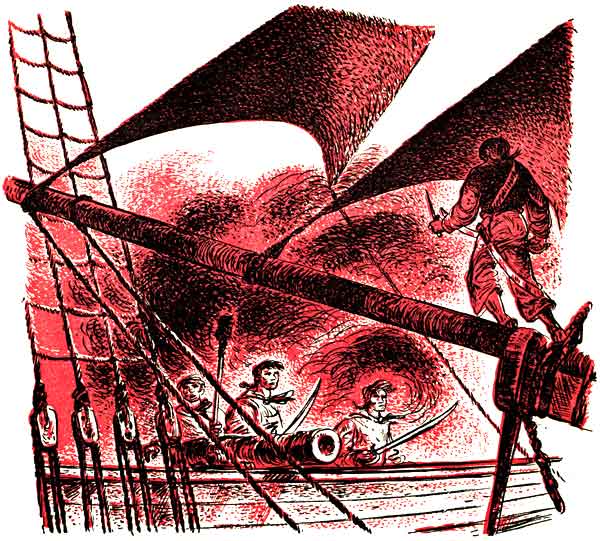
The pirates, many wounded and all taken aback at the unforeseen presence of guns on board the Mirabelle, were tough fighters notwithstanding, and moved the Vulture in ever nearer until the two ships, with fallen masts and entangled rigging, were locked on the brazen sea in deathly struggle.
Brave as the seamen of the Mirabelle proved themselves to[243] be, the pirates were seasoned in pitiless combat. The guns of both ships roared and coughed and the battle raged through the noon into the afternoon. Finally, Chris could bear no more. The crew of his ship were weakening, even as were those of the Vulture, and shuddering though he was at the thought of the sharks in the sea, Chris knew he had to use every method in his power if any on board were to survive.
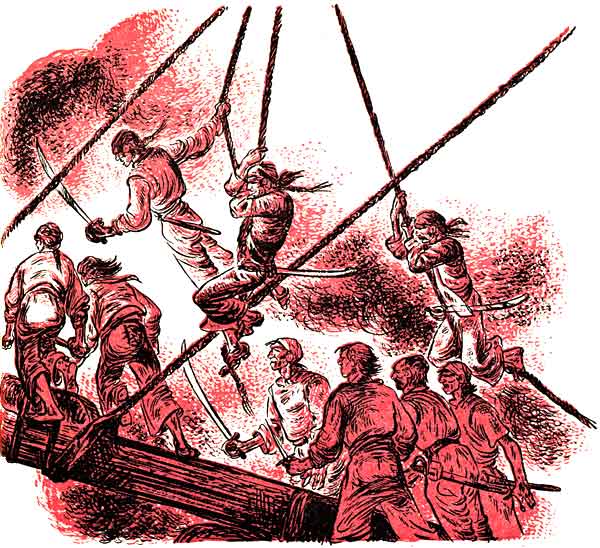
Keeping his own form he jumped into the blood-tinged water, his magic knife open and ready in his hand.

he smoke of the guns of both ships so hung upon the air that Chris counted on its heavy curtain to screen him from his enemies. He swam to the far side of the attacking vessel and there forced his magic knife for the second time against the side of the Vulture.
He was treading water, holding to a rope that dangled over the side of the ship when, with no interior tremor of warning, a cut that he almost thought had penetrated to the bone lashed across his shoulders narrowly missing his left ear. Without stopping to think Chris took half a breath and submerged as deeply as he could go, hearing above him, even through the sounds of the battle and the wavering water, the "fleck!" of Claggett Chew's metal-tipped whip as it hit the water where he had been only a second before. Chris would have dived under the great barnacled hull of the Vulture then and there, to come up on the other side, but good swimmer though he was, he was unsure that he could hold even a full breath for so long a dive. Added to this, he had had no time to do more than gasp a momentary breath of air, and even as he rose to the surface[245] with bursting lungs, he saw the figure of a man leap into the water from the side of the Vulture.
Before the bubbles of the man's descent had had time to disappear, the most dreaded of all sights for a swimmer showed itself above the water. It was the sinister triangle of a shark's-fin cutting the surface of the sea as it advanced with terrifying speed to where Chris gazed, almost paralyzed with horror.
Thrusting the knife into the pouch at his neck, Chris took the shape of a dolphin and plunged deeply, even as the infuriated shark was carried over and beyond him by its own impetus before it could turn. But turn it did, with lightning speed, and Chris knew he had no protection against that murderous underslung jaw racked above and below with deadly teeth.
The shark, in one long powerful movement, had turned and gone under the dolphin, which now raced upward from the dim, lightless depths of the sea to the surface where it hoped to escape. The shark turned on its back with a motion at once lazy and sickening in its assurance of its prey. Its soft greenish-white belly glimmered slimily in the sea, its frightful jaws open as it came almost languidly up through the water, certain of snapping its adversary in half.
But in that one moment when it turned belly uppermost, its eyes were unable to watch its goal, and in that moment the dolphin made a desperate leap from the water and a sea bird soared into the air.
The sea bird had no more than wheeled to sight the shark below, when a scream from the air above it made it instantly drop and shift to one side as a hawk, talons spread and eyes red with hatred, plunged down from a great height, its beak open to seize and to rend.[246]
The sea bird, veering away on the wind, became a fly, but the hawk instantly vanished to be replaced by a bat, which darted after the fly with such velocity that it was the current of air from its wings that drove the fly closer to the pirate ship.
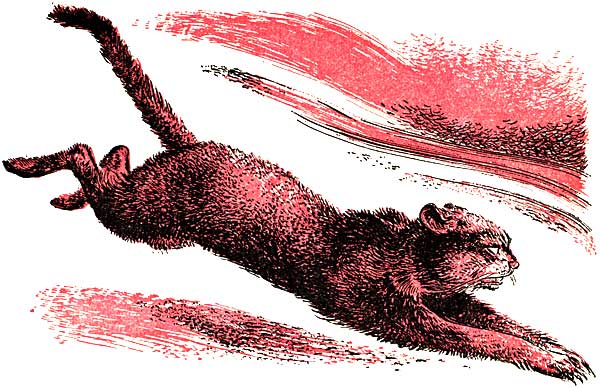
With a despairing effort, the fly flew directly into the smoke of the battle, and at that moment a mouse hid in a corner near an overturned cask shaking in all its limbs, its pointed teeth chattering with fright. Finally regaining its breath, it ventured to look around the corner. All seemed serene to the mouse, who saw no shadow of danger, although sounds of battle still ebbed and flowed on the deck below it, crisscrossed by shouts and orders, screams and groans, as the pirates and the sailors of the Mirabelle doggedly fought on. The mouse wished to retake its own shape and continue its work with the magic knife which had been interrupted, it thought, too soon to have done[247] any good. At last it decided to run along the deck near Claggett Chew's cabin. From there it hoped to reach the side of the ship nearest to the Mirabelle.
As it slipped from its hiding place and began its run, it realized too late its mistake, and panic almost overcame it. For a cat had been crouched behind it and now gave a mighty pounce. One outstretched paw came down on the mouse's tail, but the mouse wrenched it free and desperate and panting, dashed into the first opening it saw.
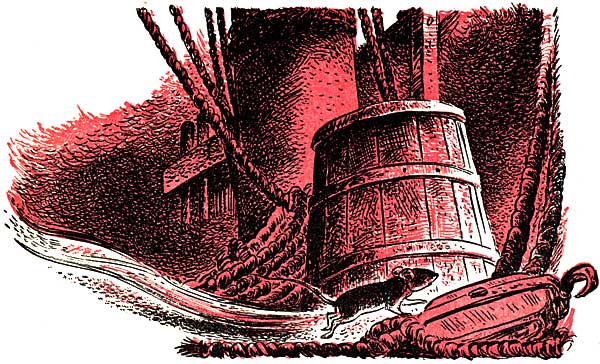
This proved to be no less than Claggett Chew's cabin, the door of which had been left open so that Osterbridge Hawsey could watch the fight with the least possible discomfort. He sat, somnolent, in a comfortable chair, his long legs stretched out before him, smoking a clay pipe. His attention wandering, as it so often did, he failed to see the mouse who ran under his[248] legs into the shadow beneath them. The frantic mouse now determined, in the seconds left to it for decision, to attempt a bold move. In a flash—in fact, as a black cat with angry yellow-slitted eyes put its head around the door jamb—a jade-green parakeet with red and yellow breast feathers hopped onto Osterbridge Hawsey's ankle, and with a speed tempered by its most engaging ways, sidled up Osterbridge Hawsey's outstretched leg.
The yellow-eyed cat made a dash with both clawing paws outstretched to fall upon the bird, but the parakeet fluttered into the air out of reach and came down higher up on Osterbridge Hawsey's knee. Osterbridge, startled from his daydream, shooed away the cat and got up precipitously enough to give it a kick which sent it miaowling from the cabin. Osterbridge, vastly pleased to see his green parakeet again, was wreathed in smiles.
"Ah, now!" he exclaimed, holding out a condescending finger, "Petit Monsieur back again! How too simply enchanting! Just when poor Osterbridge was so bored and had no one to talk to! Well, my pretty—" and both Osterbridge and the parakeet cocked their heads at one another—"and where have you been, I wonder?"
Osterbridge examined the little bird perched on his finger and his eyes were thoughtful. "It is true, you have a tiny mark at the side of your jaw—if parakeets have jaws, my friend. But there is no such thing as magic. Not the kind of magic whereby a human can be something else!"
He broke into peals of high laughter. "What a joke if it were possible! Now what could I be, eh?"
He looked fondly at the bird and the bird looked back at[249] him, daring to open its beak and emit a small but clear "Haw!"
"Haw yourself!" returned Osterbridge in high good humor. He leaned back in his chair.
"Now, all this is a most engaging train of thought," he pursued. "If I could change myself, what should I be?"
He fell to musing, and as he did so the dreaded shadow Chris had anticipated fell across the doorway. A moment later Claggett Chew, limping from an old wound and a newly received bruise, stood in the entrance.
Osterbridge Hawsey yawned. "Ah—there you are at last, Claggett," he said, "Battle all over? It still sounds rather ferocious, to me. But of course I am no expert. Heaven forbid!" Osterbridge ended, rolling his eyes toward the ceiling with his vague smile.
As Claggett Chew did not reply, Osterbridge looked back at him. The pirate's eyes were fixed on the parakeet, and his twitching fingers played with the steel-tipped whip. Claggett Chew's voice when it came was as sharp and as cold as a dagger in a dead man.
"I will have that bird, Osterbridge," he said.
Osterbridge's expression did not change but his eyes did, and they became almost as icy as Claggett Chew's.
"Oh no, you will not, Claggett," he said, and his high-pitched voice managed to be saturated with sarcasm. "This is the one thing that is keeping me from unutterable boredom, while you go into your interminable fight." He paused to give Claggett Chew a cutting look. "You know how I feel about piracy—too terribly degrading, though I can see it has its excitement and rewards. But it is unnecessary—"
Claggett Chew's eyes had a way of not blinking. They held[250] a crocodile fixity. His tone, when he spoke again, did not vary. "I am not a trader, Osterbridge. Nor shall I bandy words with you on this subject. Give me that bird, or I shall take it from you!"
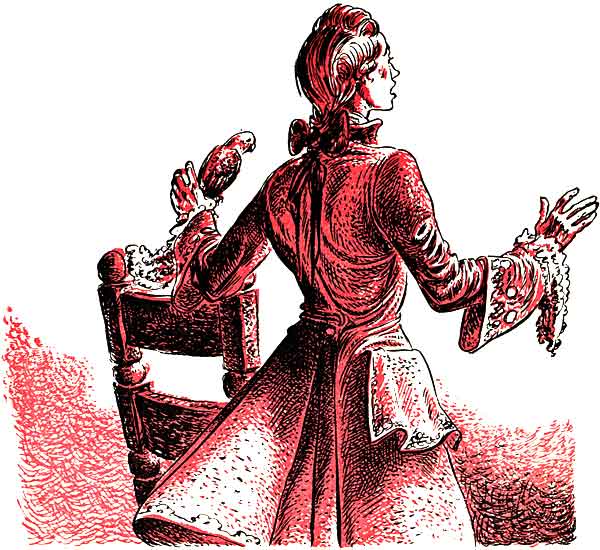
Osterbridge Hawsey rose with a slow grace from his chair, his hand curled gently but protectingly around his parakeet.
"Claggett," he said in his thin voice that cut now with the unexpected thinness of paper, "I am sorry to say such a thing to you, but your fever during the weeks just past has undoubtedly altered your brain. You are a madman, Claggett." Osterbridge[251] Hawsey removed himself with deliberation from the proximity of the doorway, placing himself on the other side of the cabin table over which hung the swinging lamp. He did not turn his back to Claggett Chew nor take his eyes from him.
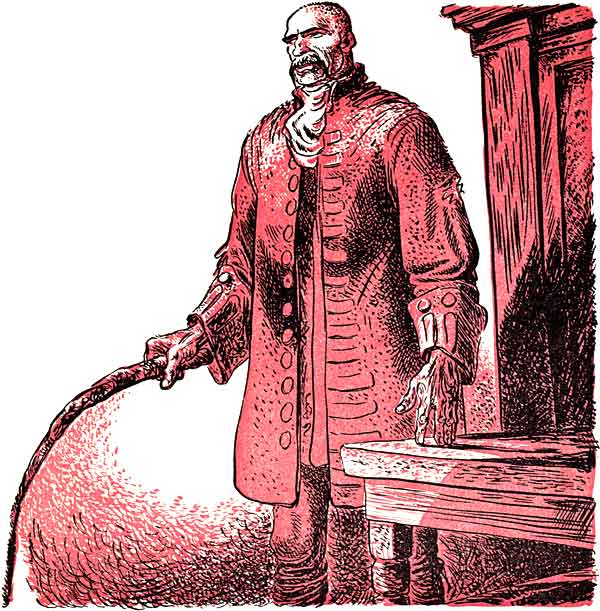
"Kindly leave the room, Claggett," he went on, in too quiet a voice to be otherwise than poisonous, "until you are more yourself. Your conduct and tone are unbecoming to a gentleman," Osterbridge said, with his head held high in disdainful dignity.[252]
They were an extraordinary sight. The shaven-headed, clay-faced pirate looming so high and so huge in the doorway that he filled it altogether, his clothes torn, filthy and stained from the battle and from careless weeks at sea. His companion was a travesty of his onetime elegance, dirty lace ruffles spotted by forgotten meals, his velvet coat marked by chairbacks and soiled from months of constant wear, his hair unwashed and sleazily caught back, no longer curled with a fine exactitude. Both men had been housed together for too long. Long ago they had exhausted all topics of conversation, their two difficult personalities had for months been festering, each at the sight of the other.
Now Claggett Chew ground out between his clenched teeth: "You are a fool, Osterbridge. Have always been one and will so remain. Do you defy me and do not give up that bird, as hell is my witness I shall snatch it from you with this whip, and nothing shall stop me!"
Osterbridge reached behind him with his right hand, holding the parakeet in an increasingly uncomfortable and tightening grip in his left. On the wall behind him hung his rapier in its scabbard, delicately incised and showing the fine workmanship of its French origin. With a quick, deft movement, Osterbridge's fingers had found the hilt and drawn the rapier out, his face snarling, his eyes expressionless. They were fixed on Claggett Chew who had not moved from where he leaned against the side of the doorway.
Osterbridge Hawsey's voice was almost more frightening when he spoke again than Claggett Chew's, as he slowly brought the rapier to his side with quiet calculated gestures.[253]
"I have had enough of your ordering, Claggett. You may order your scurvy men about as you wish—half-wits, rascals, thieves and murderers who know no better than to do your bidding, knowing they may well die by your hands as by some other. But you have met your match. I, Osterbridge Hawsey, shall not give in to a madman and a murdering pillager. How I ever came to join you or your pirates God alone knows, but you shall not govern me! Nor shall you have one object that is my own! En garde!" he cried, whisking out the rapier.
As he did so—such is the force and training of habit—his left hand automatically came up in the first position of the fencer and the duelist, and as it came up and the fingers slackened about the parakeet, the long whip lashed out and curled around Osterbridge Hawsey's hand. The parakeet ducked into encircling fingers, Osterbridge Hawsey let out a piercing scream, more of rage than of pain, and opened his hand. The parakeet, liberated, flew straight into the face of the man with the whip, pecking at it with its sharp beak, scratching at it with his pin-like claws, and beating its wings in such confusing fury that the pirate bobbed his head. At the same time the big man stepped backward, throwing up his left arm in an attempt either to catch the bird or drive it off.
But the bird's attack lasted for only a moment. Then, as Claggett Chew's fingers grasped at it, the parakeet was off over his shoulder and lost in the din and obscurity of the battle. Behind it it heard the cries of hatred and rage as the pirate and Osterbridge Hawsey faced one another in the cabin to fight with whip and sword amid the crash of overturned tables and chairs and the splintering crack of the lamp and the windowpanes.

afe on the Mirabelle, Chris, exhausted and increasingly conscious of the pain of the whiplash, took his own shape with sighs of thankfulness and looked about him. A wind was rising, rocking the interlocked ships, and he could plainly see that the crew of the Mirabelle had done enormous damage to the Vulture and its attacking men. Cannon shots from the opening sally, and at such close range, had broken two of its three masts, and the decks of the Vulture were a clutter and tangle of lines, sails and splintered spars. The fact that the men of the Mirabelle were in better physical shape than the pirates stood them in good stead, for their agility and strength had carried them through the battle even against the wilier and more murderous knowledge of Claggett Chew's men. The pirates, Chris could see, were turning back, and those who still fought were one and all wounded or grazed, and losing ground with every passing moment.
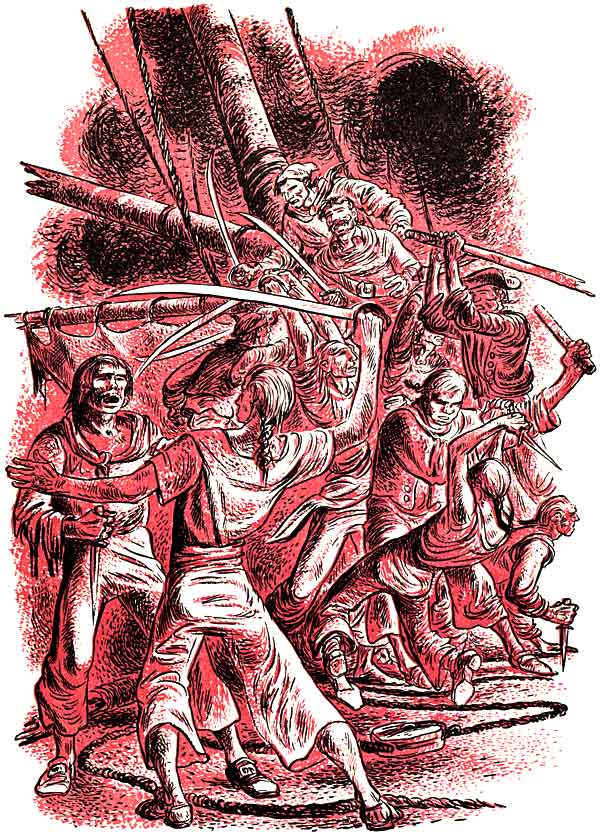
Chris had been so terrified and panicstricken by his own[256]personal danger and fight for life that it took him a few minutes to catch his breath and grasp the situation from where he stood on the Captain's bridge. Wondering if he still had the strength to force a leak in the Vulture's hull, as he had begun to do, he felt in the leather pouch at his neck for the knife. At the bottom of the pouch his fingernails hit a gritty substance, and into his head came an echo of Mr. Wicker's words: "Remember the leather pouch!"
Taking out the knife, the folded balloon, and the map of where the Jewel Tree had been, Chris, leaning against the side of the Mirabelle, shook out the grainy stuff into the palm of one hand.
It looked like ground-up lava. Gray-black, almost a powder, it had a faintly sulphurous smell. As he turned it speculatively in his hand, wondering how he was supposed to use it, a few grains sifted between Chris's fingers and fell over the side into the sea.
Instantly, as soon as they touched the water, several infinitesimal flames started up, burning on the waves as hardily as if they had fallen onto dry grass, and their heat produced a sturdy mist which rose in heavy spirals from every grain.
Then Chris knew what it was for. Shaking every particle carefully back into the bag, he hurried to find Captain Blizzard.
"Sir!" he cried as soon as he was within earshot, "the pirates are bested, and we can make a safe escape if you will give an order to set loose the grappling irons and lines and bid our men raise sail!" He looked eagerly at Captain Blizzard. "The pirates look pretty tired now, but the Vulture might pursue us if I didn't know a way to stop her!"
The Captain looked thoughtfully at Chris and hesitated not[257] at all. Too much had already depended on the boy and had been faithfully carried out for even Captain Blizzard to doubt of his ability. Orders were quickly given to cast off from the pirate ship and Chris disappeared to a hidden corner. There he hid everything the leather bag had contained excepting the grainy powder. Next, taking the bag from around his neck and leaving the mouth of it wide open, he changed his shape to that of a sea gull.
Taking the pouch in its beak the gull soared high above the two vessels, now drifting imperceptibly apart. Sounds of violent fighting could still be heard inside Claggett Chew's cabin, but the pirate crew seemed grateful enough to fall to the bloody decks to rest and care for their wounds. As the two ships finally stood clear of one another, a resounding cheer of victory rose from the courageous members of the Mirabelle. Their shirts ripped into hasty bandages, their bodies glistening with sweat and rusty with their own or their foes' blood, they were a bedraggled sight. Nevertheless, as they raised their arms or flung their caps into the air, flinging after the pirates a few last resounding epithets. Chris's heart swelled with emotion at the men he was proud to call his friends.
As the gull, he swung up into the air away from the Mirabelle, and began shaking the dust from the open pouch on the sea around the Vulture. By the time the bag was empty, a mist impossible for any helmsman to see through had surrounded the battered ship from stem to stern, and in despite of a freshening wind, was rising steadily to the top of its one remaining mast.
Chris returned to his own ship, and in his own shape at last, surveyed the dwindling island of mist that clung persistently[258] around the Vulture, blow though the wind might, and turn and turn again though the helmsman might try to do. How long, Chris wondered, would the mist hold? Or would the Vulture be doomed to drift at the mercy of the sea in its magic white shroud?
He gave it a long look, a diminishing irregular white shape on the vast spread of the ocean, then turned quickly and went to the decks below to help his wounded friends. Yet not before he had seen that the prow of the Mirabelle was turned triumphantly home!

hris had always known, tucked away somewhere out of sight at the back of his heart and his mind, that he loved his country and his city. But he had never given it much thought; it had been something as taken for granted as the air he breathed. So that he found himself overwhelmed by the gust of emotion sweeping through him when he stood beside Captain Blizzard as the Mirabelle sailed slowly up the Potomac.
Chris stood there with Amos on his other side, looking at the shores that were both familiar and unfamiliar. Familiar when he saw Mount Vernon on its imposing bluff; unfamiliar because no domes or obelisks were to be seen; no airfield, and no Pentagon. But the sweet green land itself was there, holding out its welcoming and individual scent of fields and rich American soil.
However, the Georgetown Ned Cilley and Amos remembered, the little town from which they had all sailed in secrecy and haste so many months before, was there awaiting them.[260] The noon sun was bright over the few slate roofs and red brick chimneys, and Chris felt a choke of happiness binding his throat like a scarf too tightly drawn, and a constriction at his heart as if it were too firmly held in a welcoming hand.
An excited happiness shook him as the Mirabelle was eased to the wharfside, and at last, after dangers and adventures beyond his imagining, Chris not only knew that he was home again, but saw a familiar black-dressed figure and a plump woman in a monstrous hat, waiting for him to disembark.
What a day that was! The greetings and handshakings; the enveloping hug for Chris and Amos from Becky Boozer, her eyes filled with happy tears and her bonnet trembling with agitation. Her roguish glances and coy giggles flew out like a flock of doves at the sight of swaggering Ned Cilley, who came down the gangplank carrying a macaw in a cage for "Mistress Boozer," and hustled her behind some bales to kiss her warmly. But most of all and best of the day, that first look from Mr. Wicker that spoke more than any gesture or carefully chosen words could have done. He had no need to speak. Chris could see the pride and pleasure shining in his face, and Mr. Wicker, so solitary all his life, could see in the boy's eyes an affection his own son might have shown him.
In due time a well-crated object was carefully hauled by cart to Mr. Wicker's back door and taken inside. The ship's carpenter had made a case to measurements given him without knowing what it was to hold, and when Chris saw it at last set in a corner of Mr. Wicker's well-remembered study, he knew a lightness of mind he had not had since first he had been told of the Jewel Tree and his long journey.
There were long hours of talk with Mr. Wicker before the[261] fire, telling him of every detail. Mr. Wicker's fine dark head nodded from time to time, interspersing Chris's account with an occasional "Quite so—you did perfectly right," or, "Indeed? I did not see that too clearly, and so I was not sure." At last all was told; every tale unfolded.
Then Mr. Wicker rose, smiling at Chris. "Go have your supper lad, and come back. I have some other things to say."
The candlelit kitchen, the blazing hearth, the hissing spit on which wood pigeons roasted; the steaming pots where savory things were cooking; Amos laughing and chattering and swinging his legs from the cane-bottomed chair; Becky Boozer alternating between bursts of happy song and jokes directed at Amos or Ned Cilley, everything seemed beautiful to Chris and the room the gayest he had ever known. Yet he was conscious of a heavy feeling inside himself in spite of the laughter and the talk, and sat quietly staring at the rosy firelight that flowed up Becky's white apron and starched fichu to her hot, flushed face and kind blue eyes. The reflection of the sparks went even higher to gild the twenty-four roses and twelve waving black plumes, and when they passed on, found a kindred spark in the large contented eyes of his friend Amos. Ned Cilley was going through the usual formula of pretending that he should not stay to supper, and that even if he did, he had no appetite at all.
"Ah now, Master Cilley," coaxed Becky, her hands on her hips and the soup ladle she still held standing out at right angles, "you will fade away into a wraith, my good man, so you will! Do you not eat a morsel nor a mouthful, and die in the night, how shall I bear to live with my conscience thereafter, tell me that?"[262]
Ned Cilley, seated at the table near the Water Street windows, his legs sprawled out and his rough hands folded over his round little paunch, twiddled his thumbs and wagged his head in a doleful manner, drawing the corners of his mouth down, though it was plain that this was an effort.
"Eh, lack-a-day!" he sighed. "The life of a sailor, 'tis that hard—is't not, me boys?" He wagged his head again. "The vittles is hard on a stummick as delikit nor what mine be—"
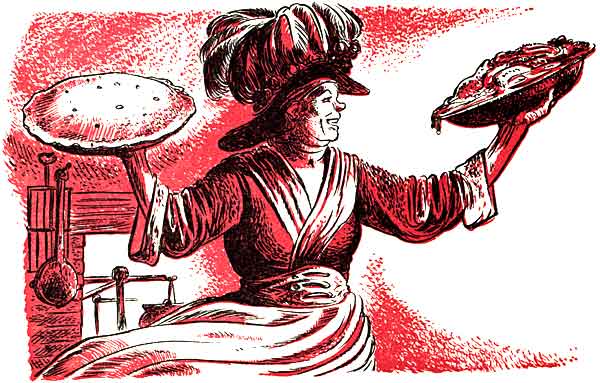
Amos put his hand over his mouth to stifle some sound that broke through in spite of him. Ned gave him a reproving glance. "Or else, me innards is ruint by that galley cook of ours." He sighed and nodded in reminiscent sorrow. "Ah, sweet Boozer, were you to sample but a spoonful of what us pore sailors must face week after week, and month after month, and us on the high seas—you bein' such a delikit cook, so[263] to speak—your heart's blood would curdle on the instant, that it would, by my cap and buttons!"
Tears of pity streamed down Becky Boozer's face, and pulling out a bandanna handkerchief from her apron pocket she blew her nose with a honk that would have blown a less sturdy man than Ned Cilley off his chair.
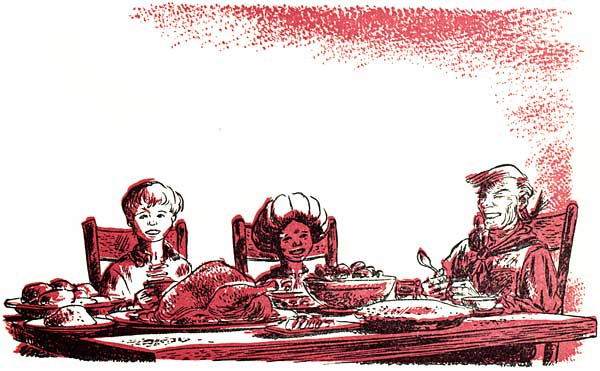
"Deary me, the saints preserve and defend us!" she cried. "I must do all in my poor weak woman's power to tempt you as best I may. Draw up, lads, for here it comes!" she announced without ceremony, and the three watching her needed no second invitation.
Then such a feast as was heaped upon their plates and crowded on the table. Steaming vegetable soup, roast pigeons, roasted ducks, several boiled fowl with wild rice, a cold beef pie, several kinds of cheese, tarts and pies, jams and preserves.[264] A blissful silence fell over the cheerful room and Becky Boozer stood back to survey the two busy boys and engrossed silent man. Silent if one can call Ned Cilley's champing jaws, smacking lips, great sighs after a draught of ale, or loud appreciative belches a silent meal.
When everyone had finished at last and they had pushed back their chairs and looked about them again with dozy smiles, Chris remembered Mr. Wicker's request. He rose, not without difficulty.
"Mr. Wicker asked me to see him for a moment." He moved to the passageway. "That was a superb supper, Becky. I'm stuffed."
Becky looked around genuinely surprised. "Why—a mere mouthful, a taste, a tidbit, was all any of you had. See—there's a pigeon or two left, and half a duck, and part of the beef pie—why, you do but peck at your food, all of you, like poor birds!" she insisted.
Chris laughed. Ned Cilley, picking his teeth with his habitual ship's nail, was already falling asleep, and Amos, his head on one hand, propped himself up amid a jumble of empty plates. Peacefulness and content lay everywhere in the room, warm as the firelight and as pervasive.
Chris turned. "Anyhow, thanks again. I'll be back," and he went along to knock at Mr. Wicker's door.
Inside, the ruby damask curtains were drawn close across the windows, for it was nearly dark, and the fire here too was as red as the rose that was the joy of a princess of China. Chris closed the door behind him, looking around with a smile at the familiar walls and objects he had missed and dreamed of, many a time, the table with its flowers in a fine China bowl, the[265] desk between the windows with the long-feathered quill pens and the papers marked by Mr. Wicker's meticulous hand, the carved cupboard at the end of the room, and the Indian rug of many colors under his feet. Last of all he brought his look back to Mr. Wicker, sitting in the winged leather chair.
Mr. Wicker had a strange expression on his face. He was smiling but at the same time he looked sad. And for the first time Chris saw some curious-looking garments folded neatly on a stool before the fire. Mr. Wicker, watching him as he gazed about, saw the question in his eyes. "Do you not recognise these things, Christopher?" he asked.
Chris looked more closely, touching nothing. His voice was bewildered. "Well—it seems to me I may have seen them before—they sort of look familiar, but—I couldn't be sure."
His master's voice was gentle. "They are your twentieth-century clothes, my lad. The ones you wear in your own time. And deeply as it hurts me to say it, the moment has come for you to put them on."
Chris raised startled worried eyes to the dark penetrating ones watching him so quietly from the high-backed chair. "Not yet? I don't have to go now, do I, sir?" And as he saw insistence in Mr. Wicker's face he began to expostulate as a child does when it wants to retard its bedtime.
"But I've scarcely got back—I mean, here. And we've only had one talk—I'm sure there'll be other things I've forgotten to say that you should know—"
He threw out his hands as if to grasp at something that might hold him there.
"And—and—I didn't say good-bye to Captain Blizzard or Mr. Finney. They were wonderful to me, really they were![266] And"—his voice suddenly became very small and high, disappearing to a whisper at the end—"and Becky and Ned and dear Amos—"
He stood there against the door, swallowing hard with his head down, his stomach and his throat a mass of hateful knots and the whole of him swamped with unhappiness. Mr. Wicker had never moved, his elbows on the arms of his chair, and his folded hands just touching his chin. At last Chris whispered: "Does it have to be?"
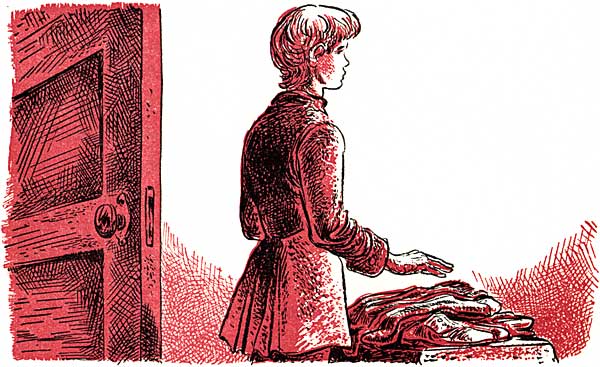
"It has to be," said Mr. Wicker.
Without a word, Chris took the folded clothes that seemed so unfamiliar off the stool and dressed behind the other leather chair, his lower lip trembling. Mechanically, as boys will, he shifted everything from his pockets to those of the trousers he had just put on. With careful slow gestures he folded up the knee breeches, the full-sleeved shirt, the long white hose[267] and silver buckled shoes, the flare-backed jacket last of all, and put them where his clothes had been.
Mr. Wicker then spoke, getting slowly to his feet and standing with his back to the fire.
"I am afraid I shall have to have the leather pouch, Christopher," he said, holding out his hand. Chris took it off and put it in the long, strong hand of the magician.
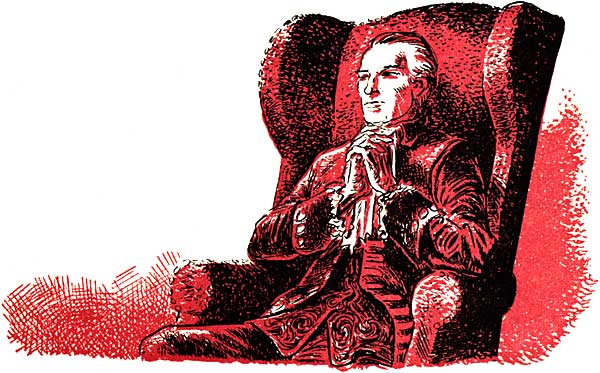
"More than that," Mr. Wicker said, putting the pouch in his pocket, "I shall have to take everything from you that you have gained here, Christopher." He paused. "All but one thing which you may choose and keep—one ability." He waited. "Choose well."
Chris looked up at the man he admired and respected and had grown to love, and pondered deeply.
To make a boat or eagle or dolphin out of rope? Very tempting! How the kids would envy him![268]
Or change himself in other shapes? So useful. He hesitated.
"I'd like to be able to come back, sir," he said, and his growing grief at those he must leave prevented him from saying anything else. Mr. Wicker's face broke into a radiant smile and he held out his firm hand.
"So you shall, Christopher, so you shall! And you shall remember it all, I promise you. That too, you can have."
He stepped forward and put his hands on the boy's shoulders. His eyes were deeply sad although his lips still smiled.
"And now," said Mr. Wicker, "good soldier that you are for General Washington and for your country, all that you learned must leave you and remain with me."
Mr. Wicker put his hand briefly on Chris's head, let it slip to cover his eyes—so lightly it was scarcely felt—and then to cover his mouth. Chris waited, but he felt no different.
"Be a fly!" commanded the magician.
Chris searched his mind. There were words to say, and you thought hard. He tried once more, and a third time, and then wordlessly shook his head.
"Make a rope boat!" said Mr. Wicker.
Chris took the rope and as it hung from his hands he wondered how one set about it—he had known how, once upon a time. He let the inert rope fall to the floor. Mr. Wicker put a hand on his shoulder and turned him toward the door.
"Come, my boy," he said.

he shop was dark but headlights flashed by out on Wisconsin Avenue, glaring over the meager display of objects in Mr. Wicker's window. There seemed even fewer objects than before, Chris thought, for the carved figure of the Nubian boy was gone, and so was the coil of dusty rope. The ship in the glass bottle was still there, however.
Mr. Wicker went forward in the darkness and leaning over, took up the bottle with care from where it had lain for so many years, dusted and polished only by the loving eyes of a boy who had often pressed his nose against the Georgian panes.
"You are to have this," Mr. Wicker said, putting the bottle with its delicate contents in both Chris's hands. "Both Ned and I would like to know that it is yours."
He turned to put his hand on the doorknob. Chris found his voice.
"What about the job, sir?" he broke out. "Can Jakey Harris apply for it?"[270]
Mr. Wicker smiled, and it was strange, in that dim room inconsistently lit by the lights of passing cars, Mr. Wicker looked exactly like a venerable, wizened old man, when Chris knew perfectly well he was not.
It's peculiar, he thought, the tricks your eyes play on you. Guess I'm tired.
"Jakey Harris for the job?" Mr. Wicker remarked, "Why no—there is no job to fill. You filled it, Christopher!"
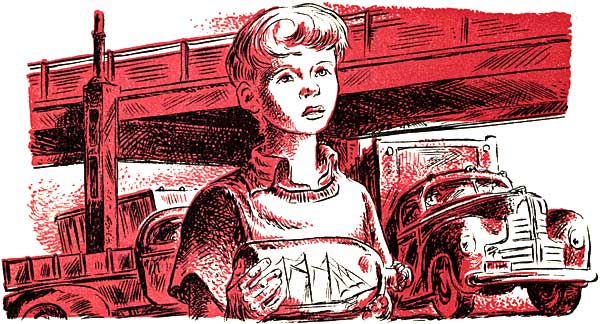
And all at once, without any good-bye, Chris found himself outside on the top step. The din of cars and honking horns rushed at him like a gape-mouthed monster; the drumming whine and roar from the freeway shook the ground, and up ahead the lights of the People's Drugstore looked garish but friendly. Across the way as he turned to go home, Chris glanced at the two tumbledown storehouses opposite, the winch and tackle broken, and panes of glass missing from the windows.[271]
As he reached the corner of Wisconsin and M Street, Mike rushed breathlessly up.
"Hey! Here I am! Not much later than I said I'd be, either! What you got?" he asked, falling into step beside Chris and looking down at the bottle.
"Mr. Wicker gave it to me," Chris replied in a colorless voice.
"What for?"
"I dunno. Guess he didn't need it."
A silence fell, and then Mike said as they passed the strong light of a shop window, returning down bustling M Street toward 28th: "Say—you been running—or sitting by a fire? You look almost sunburnt. And look—"
They stopped dead while Mike put a grubby forefinger on a mark on Chris's jaw. "I never noticed that before. It shows up white an' plain. Must have been a pretty deep cut ya had there!"
For the first time in what felt like hours, Chris smiled, and the smile became a grin.
"It sure was!" he said reminiscently.
"Oh—an' by the way," Mike said much farther along as he left Chris to go on to his own house, "your Aunt Rachel called my ma and told her your mother was so much better she could come home soon. Seems that your father's on his way back too." He walked off and then turned to call from a quarter-block away, "Bet you'll be glad to have your own folks at home?"
Chris's grin deepened but he did not reply, nor even wave, for fear of dropping the bottle.
N Street, then Dumbarton Avenue, dropped behind him,[272] and he came to Happy's Grocery with the bookshop on the opposite corner. He stood looking at his lighted windows, the lighted windows of his house, remembering a time when he and Amos had seen only a wooded ridge and a burnt-out campfire.
Something stirred in his mind, and after finding the front door unlatched, he eased himself in and up the stairs as quietly as he could. He did not want to face his Aunt Rachel for a few minutes longer.
In his own room he shut the door and carefully lifted the Mirabelle in its bottle to the place of honor on top of his chest of drawers. Then he stood looking at his reflection in the small mirror hung askew near the window.
He looked the same—well, not quite. The tiny scar was there, to prove it was not a dream, and he quickly undid his shirt, and pulling it off, got up on a chair to peer over his shoulder to see how his back looked in the square of glass.
A whiplash like a long clean briar tear lay across his shoulders, and as he looked, he almost felt again the searing cut.
Chris grinned, buttoning up his shirt. Then it had been no dream, no childish imagining.
A voice soared up the stairs. "Chris! Chris darling? Are you home?"
Aunt Rachel had news for him of his mother's imminent return.
Chris opened his bedroom door, pulling out from his pocket the first thing his fingers hit on, and as he went downstairs whistling, "Farewell and Adieu, to you Spanish Ladies," he tossed and caught, and tossed and caught again, an old silver button burnt black in a fire.
$3.25
When twelve-year-old Chris entered Mr. Wicker's shop to inquire about a job for his friend, something about old Mr. Wicker forced him to take the job himself. Chris found himself the pupil of Mr. Wicker, not the old man he first saw, but a powerful man in his forties—a magician. Chris learned how to turn himself into a fish, a bird, a fly, and with a magic rope he learned to make a boat or even an elephant.
Chris had been chosen to sail to China on a mysterious mission. Long before he sailed, Chris met the enemies who would try and stop him—evil Claggett Chew, the dandy Osterbridge Hawsey, the treacherous old beggar Simon Gosler. With a Nubian boy Chris brought to life with magic, he set out on his hazardous voyage.
Carley Dawson writes beautifully, combining fact and fantasy with skill. Her characters are lifelike and vivid, and the plot of this, her first book, is fantastically exciting and exceptionally outstanding. With power and imagination Lynd Ward has illustrated the book with over eighty drawings in two colors.
"If Jonathan Lyte Tremain never lived in the flesh, he lives vividly with the men of his time in this book. So we dare to put him among the people of importance.
"He is a boy, an apprentice to a silver-smith in Boston, when we meet him just before the American Revolution. Casting the handle of a sugar basin for John Hancock, he seriously burns his right hand. He is crippled, the work that he loves must be given up—forever. Johnny goes through some hard and bitter times before he finds his work in the struggle that is to free the Colonies from British rule. The solution comes through the young printer, who likes Johnny and befriends him. Rab, too, is a 'person of importance.'...
"This story of Johnny Tremain is almost uncanny in its 'aliveness.' Esther Forbes's power to create, and to recreate, a face, a voice, a scene takes us as living spectators to the Boston Tea Party, to the Battles of Lexington and of North Creek. It takes us, with Johnny, to the secret meetings of the Sons of Liberty, to the secret training of the Minute Men...."
$3.00

End of the Project Gutenberg EBook of Mr. Wicker's Window, by Carley Dawson
*** END OF THIS PROJECT GUTENBERG EBOOK MR. WICKER'S WINDOW ***
***** This file should be named 28952-h.htm or 28952-h.zip *****
This and all associated files of various formats will be found in:
http://www.gutenberg.org/2/8/9/5/28952/
Produced by Sankar Viswanathan, Greg Weeks, and the Online
Distributed Proofreading Team at http://www.pgdp.net
Updated editions will replace the previous one--the old editions
will be renamed.
Creating the works from public domain print editions means that no
one owns a United States copyright in these works, so the Foundation
(and you!) can copy and distribute it in the United States without
permission and without paying copyright royalties. Special rules,
set forth in the General Terms of Use part of this license, apply to
copying and distributing Project Gutenberg-tm electronic works to
protect the PROJECT GUTENBERG-tm concept and trademark. Project
Gutenberg is a registered trademark, and may not be used if you
charge for the eBooks, unless you receive specific permission. If you
do not charge anything for copies of this eBook, complying with the
rules is very easy. You may use this eBook for nearly any purpose
such as creation of derivative works, reports, performances and
research. They may be modified and printed and given away--you may do
practically ANYTHING with public domain eBooks. Redistribution is
subject to the trademark license, especially commercial
redistribution.
*** START: FULL LICENSE ***
THE FULL PROJECT GUTENBERG LICENSE
PLEASE READ THIS BEFORE YOU DISTRIBUTE OR USE THIS WORK
To protect the Project Gutenberg-tm mission of promoting the free
distribution of electronic works, by using or distributing this work
(or any other work associated in any way with the phrase "Project
Gutenberg"), you agree to comply with all the terms of the Full Project
Gutenberg-tm License (available with this file or online at
http://gutenberg.org/license).
Section 1. General Terms of Use and Redistributing Project Gutenberg-tm
electronic works
1.A. By reading or using any part of this Project Gutenberg-tm
electronic work, you indicate that you have read, understand, agree to
and accept all the terms of this license and intellectual property
(trademark/copyright) agreement. If you do not agree to abide by all
the terms of this agreement, you must cease using and return or destroy
all copies of Project Gutenberg-tm electronic works in your possession.
If you paid a fee for obtaining a copy of or access to a Project
Gutenberg-tm electronic work and you do not agree to be bound by the
terms of this agreement, you may obtain a refund from the person or
entity to whom you paid the fee as set forth in paragraph 1.E.8.
1.B. "Project Gutenberg" is a registered trademark. It may only be
used on or associated in any way with an electronic work by people who
agree to be bound by the terms of this agreement. There are a few
things that you can do with most Project Gutenberg-tm electronic works
even without complying with the full terms of this agreement. See
paragraph 1.C below. There are a lot of things you can do with Project
Gutenberg-tm electronic works if you follow the terms of this agreement
and help preserve free future access to Project Gutenberg-tm electronic
works. See paragraph 1.E below.
1.C. The Project Gutenberg Literary Archive Foundation ("the Foundation"
or PGLAF), owns a compilation copyright in the collection of Project
Gutenberg-tm electronic works. Nearly all the individual works in the
collection are in the public domain in the United States. If an
individual work is in the public domain in the United States and you are
located in the United States, we do not claim a right to prevent you from
copying, distributing, performing, displaying or creating derivative
works based on the work as long as all references to Project Gutenberg
are removed. Of course, we hope that you will support the Project
Gutenberg-tm mission of promoting free access to electronic works by
freely sharing Project Gutenberg-tm works in compliance with the terms of
this agreement for keeping the Project Gutenberg-tm name associated with
the work. You can easily comply with the terms of this agreement by
keeping this work in the same format with its attached full Project
Gutenberg-tm License when you share it without charge with others.
1.D. The copyright laws of the place where you are located also govern
what you can do with this work. Copyright laws in most countries are in
a constant state of change. If you are outside the United States, check
the laws of your country in addition to the terms of this agreement
before downloading, copying, displaying, performing, distributing or
creating derivative works based on this work or any other Project
Gutenberg-tm work. The Foundation makes no representations concerning
the copyright status of any work in any country outside the United
States.
1.E. Unless you have removed all references to Project Gutenberg:
1.E.1. The following sentence, with active links to, or other immediate
access to, the full Project Gutenberg-tm License must appear prominently
whenever any copy of a Project Gutenberg-tm work (any work on which the
phrase "Project Gutenberg" appears, or with which the phrase "Project
Gutenberg" is associated) is accessed, displayed, performed, viewed,
copied or distributed:
This eBook is for the use of anyone anywhere at no cost and with
almost no restrictions whatsoever. You may copy it, give it away or
re-use it under the terms of the Project Gutenberg License included
with this eBook or online at www.gutenberg.org
1.E.2. If an individual Project Gutenberg-tm electronic work is derived
from the public domain (does not contain a notice indicating that it is
posted with permission of the copyright holder), the work can be copied
and distributed to anyone in the United States without paying any fees
or charges. If you are redistributing or providing access to a work
with the phrase "Project Gutenberg" associated with or appearing on the
work, you must comply either with the requirements of paragraphs 1.E.1
through 1.E.7 or obtain permission for the use of the work and the
Project Gutenberg-tm trademark as set forth in paragraphs 1.E.8 or
1.E.9.
1.E.3. If an individual Project Gutenberg-tm electronic work is posted
with the permission of the copyright holder, your use and distribution
must comply with both paragraphs 1.E.1 through 1.E.7 and any additional
terms imposed by the copyright holder. Additional terms will be linked
to the Project Gutenberg-tm License for all works posted with the
permission of the copyright holder found at the beginning of this work.
1.E.4. Do not unlink or detach or remove the full Project Gutenberg-tm
License terms from this work, or any files containing a part of this
work or any other work associated with Project Gutenberg-tm.
1.E.5. Do not copy, display, perform, distribute or redistribute this
electronic work, or any part of this electronic work, without
prominently displaying the sentence set forth in paragraph 1.E.1 with
active links or immediate access to the full terms of the Project
Gutenberg-tm License.
1.E.6. You may convert to and distribute this work in any binary,
compressed, marked up, nonproprietary or proprietary form, including any
word processing or hypertext form. However, if you provide access to or
distribute copies of a Project Gutenberg-tm work in a format other than
"Plain Vanilla ASCII" or other format used in the official version
posted on the official Project Gutenberg-tm web site (www.gutenberg.org),
you must, at no additional cost, fee or expense to the user, provide a
copy, a means of exporting a copy, or a means of obtaining a copy upon
request, of the work in its original "Plain Vanilla ASCII" or other
form. Any alternate format must include the full Project Gutenberg-tm
License as specified in paragraph 1.E.1.
1.E.7. Do not charge a fee for access to, viewing, displaying,
performing, copying or distributing any Project Gutenberg-tm works
unless you comply with paragraph 1.E.8 or 1.E.9.
1.E.8. You may charge a reasonable fee for copies of or providing
access to or distributing Project Gutenberg-tm electronic works provided
that
- You pay a royalty fee of 20% of the gross profits you derive from
the use of Project Gutenberg-tm works calculated using the method
you already use to calculate your applicable taxes. The fee is
owed to the owner of the Project Gutenberg-tm trademark, but he
has agreed to donate royalties under this paragraph to the
Project Gutenberg Literary Archive Foundation. Royalty payments
must be paid within 60 days following each date on which you
prepare (or are legally required to prepare) your periodic tax
returns. Royalty payments should be clearly marked as such and
sent to the Project Gutenberg Literary Archive Foundation at the
address specified in Section 4, "Information about donations to
the Project Gutenberg Literary Archive Foundation."
- You provide a full refund of any money paid by a user who notifies
you in writing (or by e-mail) within 30 days of receipt that s/he
does not agree to the terms of the full Project Gutenberg-tm
License. You must require such a user to return or
destroy all copies of the works possessed in a physical medium
and discontinue all use of and all access to other copies of
Project Gutenberg-tm works.
- You provide, in accordance with paragraph 1.F.3, a full refund of any
money paid for a work or a replacement copy, if a defect in the
electronic work is discovered and reported to you within 90 days
of receipt of the work.
- You comply with all other terms of this agreement for free
distribution of Project Gutenberg-tm works.
1.E.9. If you wish to charge a fee or distribute a Project Gutenberg-tm
electronic work or group of works on different terms than are set
forth in this agreement, you must obtain permission in writing from
both the Project Gutenberg Literary Archive Foundation and Michael
Hart, the owner of the Project Gutenberg-tm trademark. Contact the
Foundation as set forth in Section 3 below.
1.F.
1.F.1. Project Gutenberg volunteers and employees expend considerable
effort to identify, do copyright research on, transcribe and proofread
public domain works in creating the Project Gutenberg-tm
collection. Despite these efforts, Project Gutenberg-tm electronic
works, and the medium on which they may be stored, may contain
"Defects," such as, but not limited to, incomplete, inaccurate or
corrupt data, transcription errors, a copyright or other intellectual
property infringement, a defective or damaged disk or other medium, a
computer virus, or computer codes that damage or cannot be read by
your equipment.
1.F.2. LIMITED WARRANTY, DISCLAIMER OF DAMAGES - Except for the "Right
of Replacement or Refund" described in paragraph 1.F.3, the Project
Gutenberg Literary Archive Foundation, the owner of the Project
Gutenberg-tm trademark, and any other party distributing a Project
Gutenberg-tm electronic work under this agreement, disclaim all
liability to you for damages, costs and expenses, including legal
fees. YOU AGREE THAT YOU HAVE NO REMEDIES FOR NEGLIGENCE, STRICT
LIABILITY, BREACH OF WARRANTY OR BREACH OF CONTRACT EXCEPT THOSE
PROVIDED IN PARAGRAPH F3. YOU AGREE THAT THE FOUNDATION, THE
TRADEMARK OWNER, AND ANY DISTRIBUTOR UNDER THIS AGREEMENT WILL NOT BE
LIABLE TO YOU FOR ACTUAL, DIRECT, INDIRECT, CONSEQUENTIAL, PUNITIVE OR
INCIDENTAL DAMAGES EVEN IF YOU GIVE NOTICE OF THE POSSIBILITY OF SUCH
DAMAGE.
1.F.3. LIMITED RIGHT OF REPLACEMENT OR REFUND - If you discover a
defect in this electronic work within 90 days of receiving it, you can
receive a refund of the money (if any) you paid for it by sending a
written explanation to the person you received the work from. If you
received the work on a physical medium, you must return the medium with
your written explanation. The person or entity that provided you with
the defective work may elect to provide a replacement copy in lieu of a
refund. If you received the work electronically, the person or entity
providing it to you may choose to give you a second opportunity to
receive the work electronically in lieu of a refund. If the second copy
is also defective, you may demand a refund in writing without further
opportunities to fix the problem.
1.F.4. Except for the limited right of replacement or refund set forth
in paragraph 1.F.3, this work is provided to you 'AS-IS' WITH NO OTHER
WARRANTIES OF ANY KIND, EXPRESS OR IMPLIED, INCLUDING BUT NOT LIMITED TO
WARRANTIES OF MERCHANTIBILITY OR FITNESS FOR ANY PURPOSE.
1.F.5. Some states do not allow disclaimers of certain implied
warranties or the exclusion or limitation of certain types of damages.
If any disclaimer or limitation set forth in this agreement violates the
law of the state applicable to this agreement, the agreement shall be
interpreted to make the maximum disclaimer or limitation permitted by
the applicable state law. The invalidity or unenforceability of any
provision of this agreement shall not void the remaining provisions.
1.F.6. INDEMNITY - You agree to indemnify and hold the Foundation, the
trademark owner, any agent or employee of the Foundation, anyone
providing copies of Project Gutenberg-tm electronic works in accordance
with this agreement, and any volunteers associated with the production,
promotion and distribution of Project Gutenberg-tm electronic works,
harmless from all liability, costs and expenses, including legal fees,
that arise directly or indirectly from any of the following which you do
or cause to occur: (a) distribution of this or any Project Gutenberg-tm
work, (b) alteration, modification, or additions or deletions to any
Project Gutenberg-tm work, and (c) any Defect you cause.
Section 2. Information about the Mission of Project Gutenberg-tm
Project Gutenberg-tm is synonymous with the free distribution of
electronic works in formats readable by the widest variety of computers
including obsolete, old, middle-aged and new computers. It exists
because of the efforts of hundreds of volunteers and donations from
people in all walks of life.
Volunteers and financial support to provide volunteers with the
assistance they need, are critical to reaching Project Gutenberg-tm's
goals and ensuring that the Project Gutenberg-tm collection will
remain freely available for generations to come. In 2001, the Project
Gutenberg Literary Archive Foundation was created to provide a secure
and permanent future for Project Gutenberg-tm and future generations.
To learn more about the Project Gutenberg Literary Archive Foundation
and how your efforts and donations can help, see Sections 3 and 4
and the Foundation web page at http://www.pglaf.org.
Section 3. Information about the Project Gutenberg Literary Archive
Foundation
The Project Gutenberg Literary Archive Foundation is a non profit
501(c)(3) educational corporation organized under the laws of the
state of Mississippi and granted tax exempt status by the Internal
Revenue Service. The Foundation's EIN or federal tax identification
number is 64-6221541. Its 501(c)(3) letter is posted at
http://pglaf.org/fundraising. Contributions to the Project Gutenberg
Literary Archive Foundation are tax deductible to the full extent
permitted by U.S. federal laws and your state's laws.
The Foundation's principal office is located at 4557 Melan Dr. S.
Fairbanks, AK, 99712., but its volunteers and employees are scattered
throughout numerous locations. Its business office is located at
809 North 1500 West, Salt Lake City, UT 84116, (801) 596-1887, email
[email protected]. Email contact links and up to date contact
information can be found at the Foundation's web site and official
page at http://pglaf.org
For additional contact information:
Dr. Gregory B. Newby
Chief Executive and Director
[email protected]
Section 4. Information about Donations to the Project Gutenberg
Literary Archive Foundation
Project Gutenberg-tm depends upon and cannot survive without wide
spread public support and donations to carry out its mission of
increasing the number of public domain and licensed works that can be
freely distributed in machine readable form accessible by the widest
array of equipment including outdated equipment. Many small donations
($1 to $5,000) are particularly important to maintaining tax exempt
status with the IRS.
The Foundation is committed to complying with the laws regulating
charities and charitable donations in all 50 states of the United
States. Compliance requirements are not uniform and it takes a
considerable effort, much paperwork and many fees to meet and keep up
with these requirements. We do not solicit donations in locations
where we have not received written confirmation of compliance. To
SEND DONATIONS or determine the status of compliance for any
particular state visit http://pglaf.org
While we cannot and do not solicit contributions from states where we
have not met the solicitation requirements, we know of no prohibition
against accepting unsolicited donations from donors in such states who
approach us with offers to donate.
International donations are gratefully accepted, but we cannot make
any statements concerning tax treatment of donations received from
outside the United States. U.S. laws alone swamp our small staff.
Please check the Project Gutenberg Web pages for current donation
methods and addresses. Donations are accepted in a number of other
ways including checks, online payments and credit card donations.
To donate, please visit: http://pglaf.org/donate
Section 5. General Information About Project Gutenberg-tm electronic
works.
Professor Michael S. Hart is the originator of the Project Gutenberg-tm
concept of a library of electronic works that could be freely shared
with anyone. For thirty years, he produced and distributed Project
Gutenberg-tm eBooks with only a loose network of volunteer support.
Project Gutenberg-tm eBooks are often created from several printed
editions, all of which are confirmed as Public Domain in the U.S.
unless a copyright notice is included. Thus, we do not necessarily
keep eBooks in compliance with any particular paper edition.
Most people start at our Web site which has the main PG search facility:
http://www.gutenberg.org
This Web site includes information about Project Gutenberg-tm,
including how to make donations to the Project Gutenberg Literary
Archive Foundation, how to help produce our new eBooks, and how to
subscribe to our email newsletter to hear about new eBooks.